|
New Year's Resolutions
Tonbridge Town Lock
Short Form Pairs
Shorthand Gloves
Short Form Non-Pairs Part 1
Short Form Non-Pairs Part 2
New Year's Resolutions (13
January 2013)
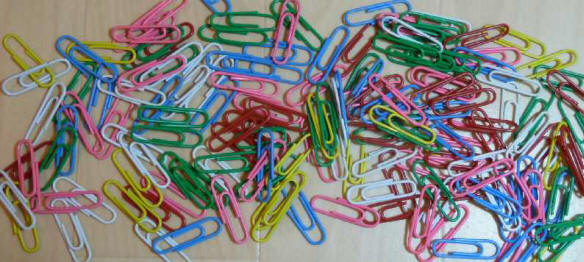
A whole pot of Shun Hooks just waiting to be used
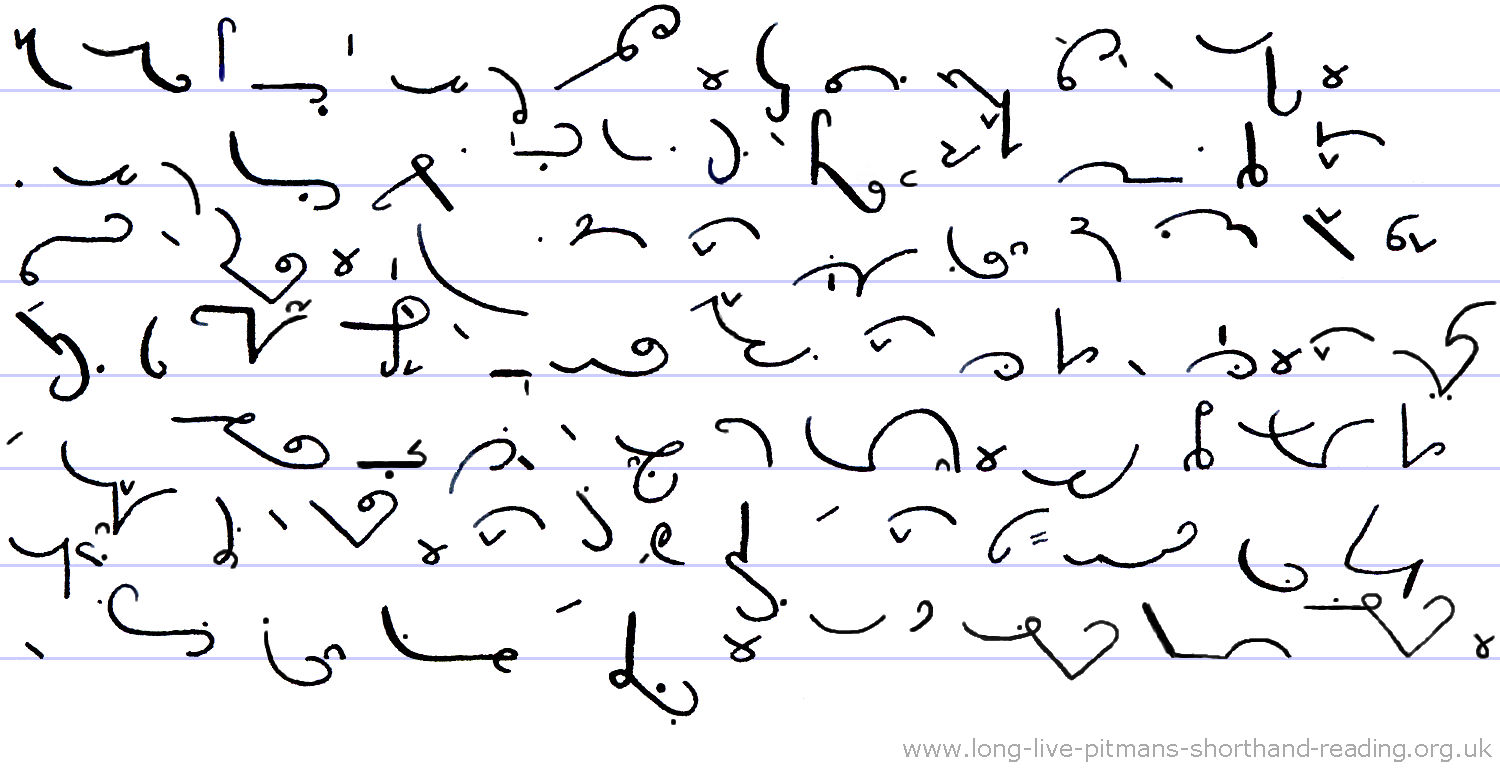
I have never been at all keen on New Yearís resolutions. They do not
seem to provide the solution to any condition. The New Year vacation
used to be* an occasion for a session of deliberations when I would make
a decision on my selection of aspirations. But after a short time* my
emotional effusions were marred by slight botheration, then gradual*
exhaustion of good intentions, and finally my mission turned to
omission. My irrational and futile* explanations gave the illusion of
insulation from failure. Initial satisfaction unfortunately* turned into
complete cessation of operations. My passion suffered depletion and my
well-intentioned vision changed to affliction, confusion, vexation and
dissipation. In short, inspiration became expiration.
* Omission phrase "use(d to) be"
"short (t)ime"
* "gradual" Not halved, so that
"gradually" and "greatly" are distinguished, see
https://www.long-live-pitmans-shorthand.org.uk/distinguishing-outlines-2-rule.htm
"greatly gradually"
* "futile" See
https://www.long-live-pitmans-shorthand.org.uk/distinguishing-outlines-5-care-e-n.htm
"fatal futile vital"
* "unfortunately" Optional contraction
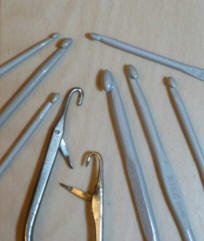
Those hooks are everywhere ...
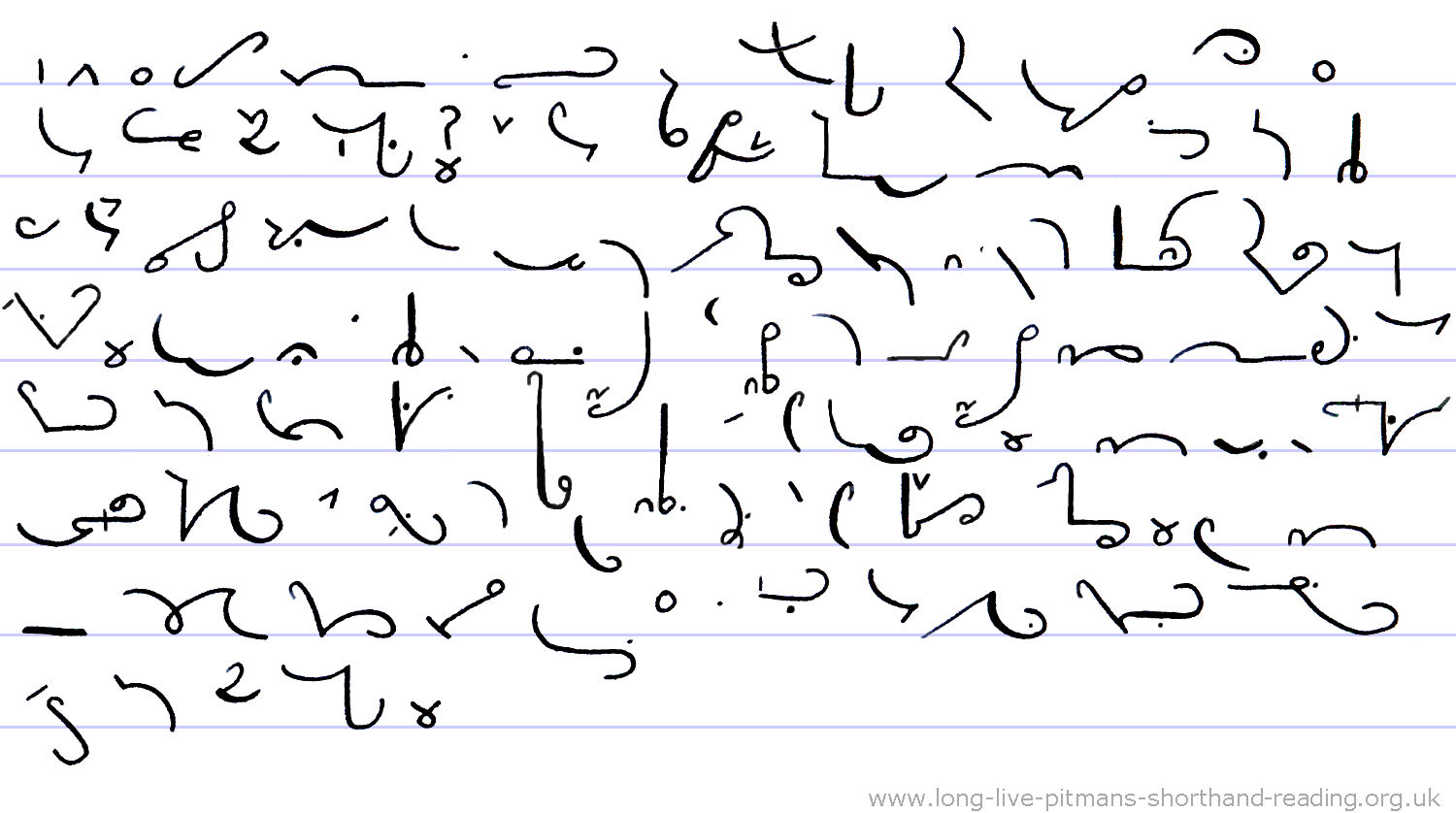
But how is one to make a correction to this unfortunate* condition,
especially if oneís ambition is for the acquisition of shorthand
notation? I offer the suggestion of taking immediate action on your
decision, in order to* avoid the hesitation of waiting for New Year
reflections before you put your educational aspirations into operation.
Having made a decision to seek tuition that
suits your current
situation, you must make concessions in the application of your former
daily traditions, duties and other functions. You may need to curtail
the incursions of television and the suppression or even cessation of
other diversions and attractions. However, you may give yourself
permission to use fiction as an occasion for the revision, progression,
expansion and completion of your shorthand notation.
* "unfortunate" Optional contraction
*
Omission phrase "in ord(er to)"
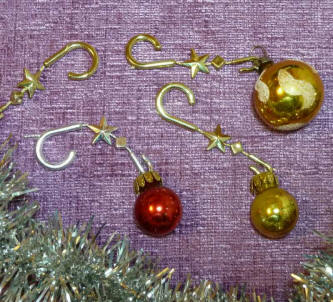
... on the Christmas tree
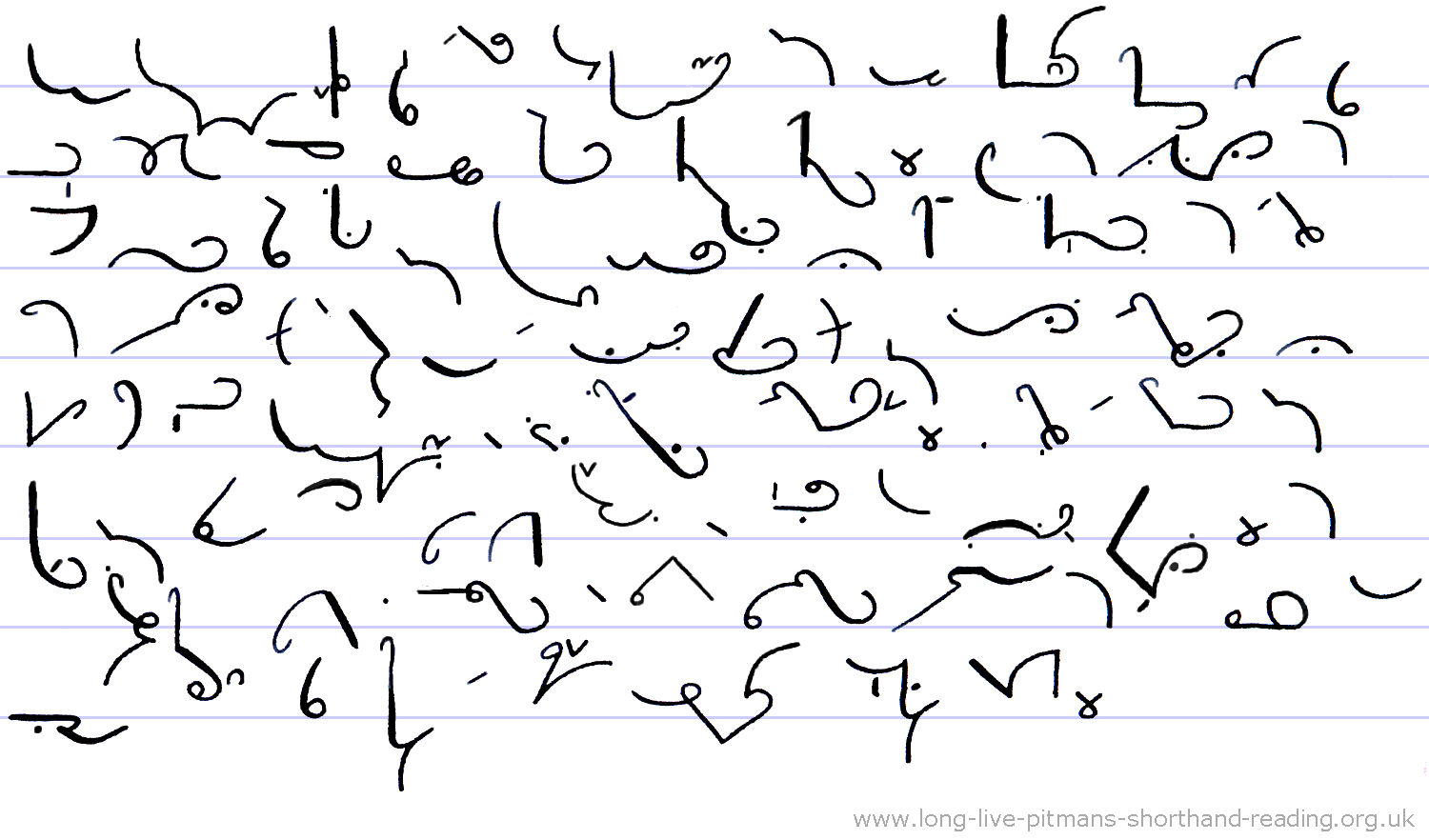
Having firmly decided on these options for the continuation of your new
educational direction, you will thus cushion yourself against sensations
of tension, deprivation and depression. However, your revelation or
casual mention of this addition to your future intentions may draw
admonition or opposition from relations (of both the young and ancient
generation) but your animation and persuasion may turn their caution
eventually to complete approbation and appreciation. The precision and
application of your devotion to your chosen ambition will lead finally
to occasions for impassioned jubilation. Your conversational
contributions will be an expression of happy celebration regarding your
success in gaining this traditional and highly inspirational notational
ability.
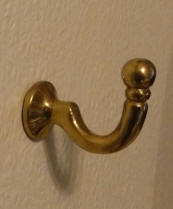
... behind the curtains
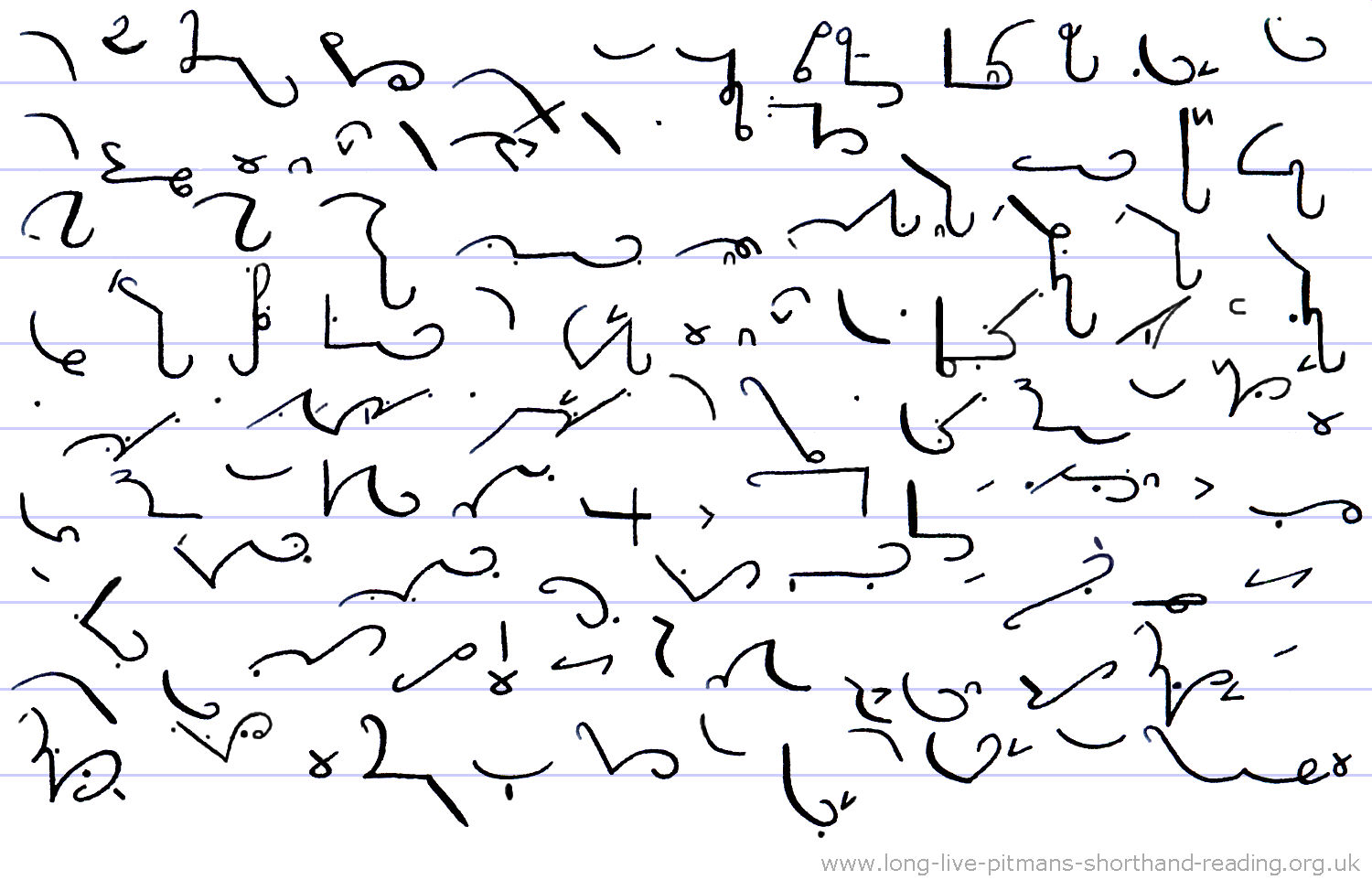
Your shorthand transcription* submissions may be required in industries
such as construction, educational instruction, aviation, fashion, or
political associations. You might be employed by an academician,
beautician, clinician, dietician, electrician, logician, magician,
mathematician*, mechanician, musician, mortician, obstetrician, optician,
paediatrician, physician, politician, statistician, technician or
theoretician. You might have a discretionary role with a missionary, a
revolutionary, a reactionary, or perhaps a visionary working in
isolation. If you work in television you will need to give attention to
the correct diction and articulation of the names of Egyptian,
Polynesian, Melanesian, Friesian, Persian, Caucasian and Eurasian guests
Ė maybe even Martian ones! Ė although you will have to avoid confusion
between Australian and Australasian appellations. There can be no
permission for deviation or variation in pronunciation**.
* "transcription" Omits the second R, to
avoid looking like "describe, descriptions etc"
*
"mathematician" Contraction
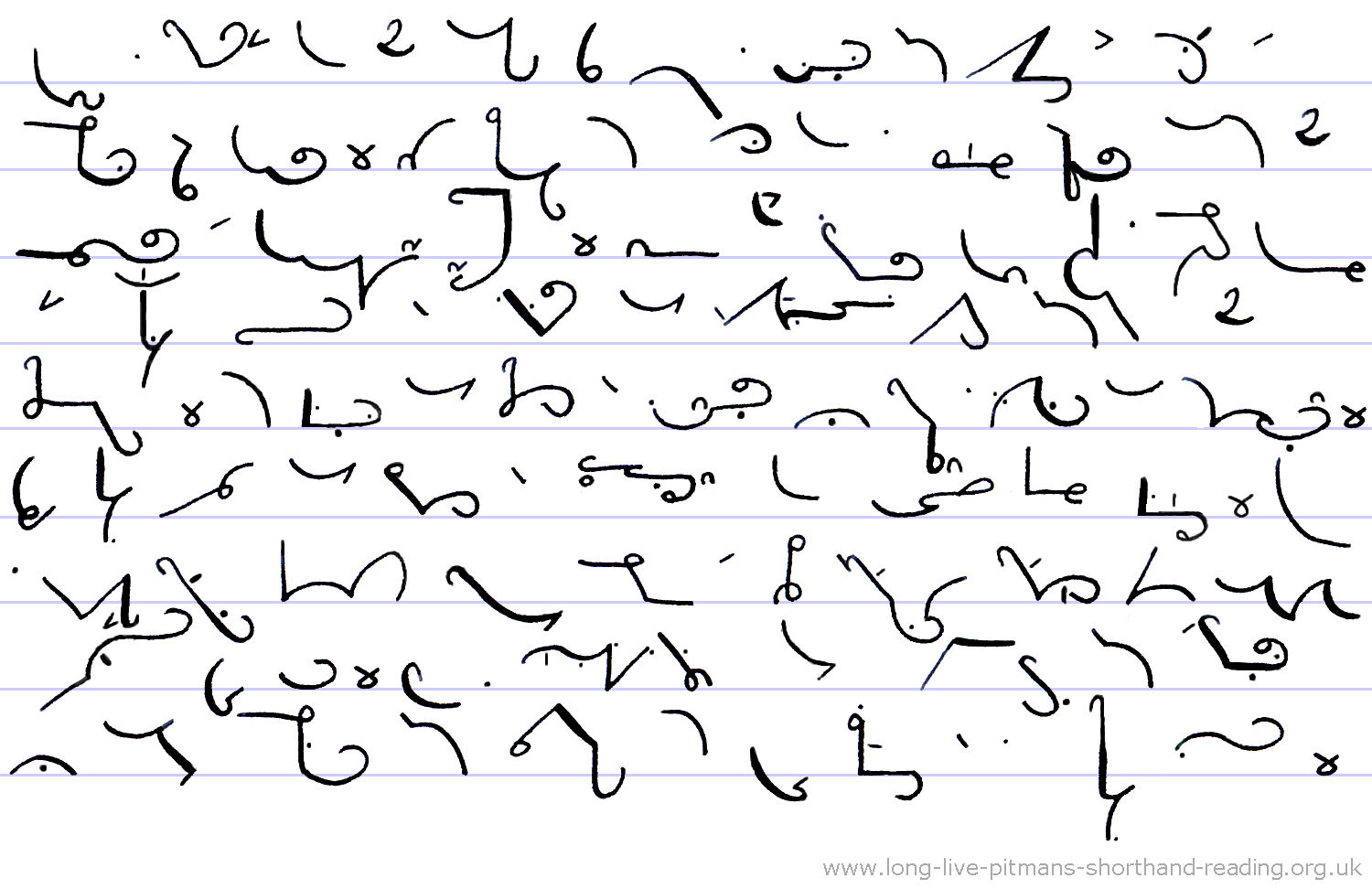
If you have an appreciation for shorthand notation, this may be an
indication of your rejection of the erosion and extinction of these
functions. You will strengthen your ambition for a succession of
distinctions in your shorthand examinations and eventual graduation. You
can avoid complications if you develop an exceptional fixation on the
unconditional correction of aberrations in the orthographic
representation of your shorthand transcription. Your dedication in the
transmission of communications may produce an elevation in remuneration.
This would additionally result in the submission of calculations for
increased taxation deductions. After a period of probation, it may also
bring the expectation* and satisfaction of professional
promotion which
may involve relocation within the nation. However, the monetary
compensation for the regular completion of your obligations may enable
the extension of your habitation or even the construction of a
traditional mansion.
* "expectation" Optional
contraction, therefore no Shun Hook
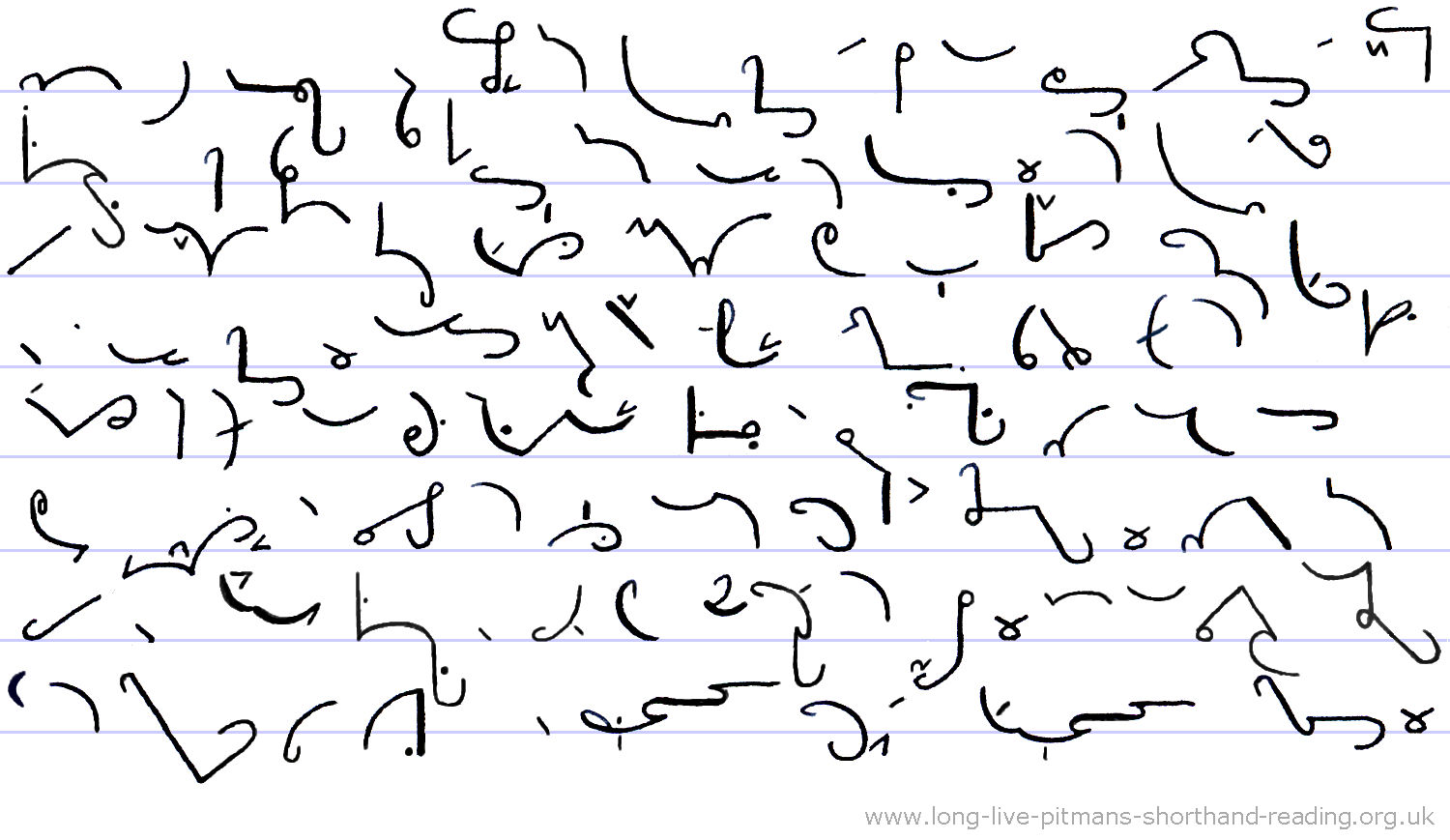
You may wish to give consideration* to these questions of your future
direction, and sit in seclusion, reflection and quiet contemplation
during this time at the conclusion of your New Year vacation. Your
future options are entirely at your own volition, and I hope you will
suffer no diversion from your devotion to a new direction. In
conclusion*, I hope that by studying and practising this composition (or
at least portions of it) in sessions of varying degrees of speed
gradation, you will never again suffer the humiliation of hesitation or
omission in your version of the transcription. You will be on your way
to avoiding the temptation to shun every shorthand confrontation or
situation. I am in hopeful anticipation that your preparation will lead
to stenographic fruition and phonographic perfection. (741 words)
* Omission phrases "to give (con)sideration"
"in (con)clusion"
Revise your Shun Hooks here:
www.long-live-pitmans-shorthand.org.uk/theory-9-shun-hook.htm
Top of page
Tonbridge Town Lock
(13 January 2013)
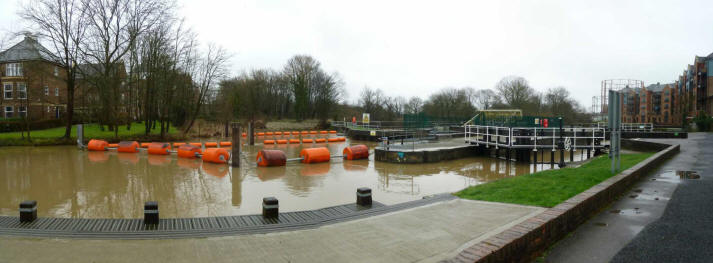
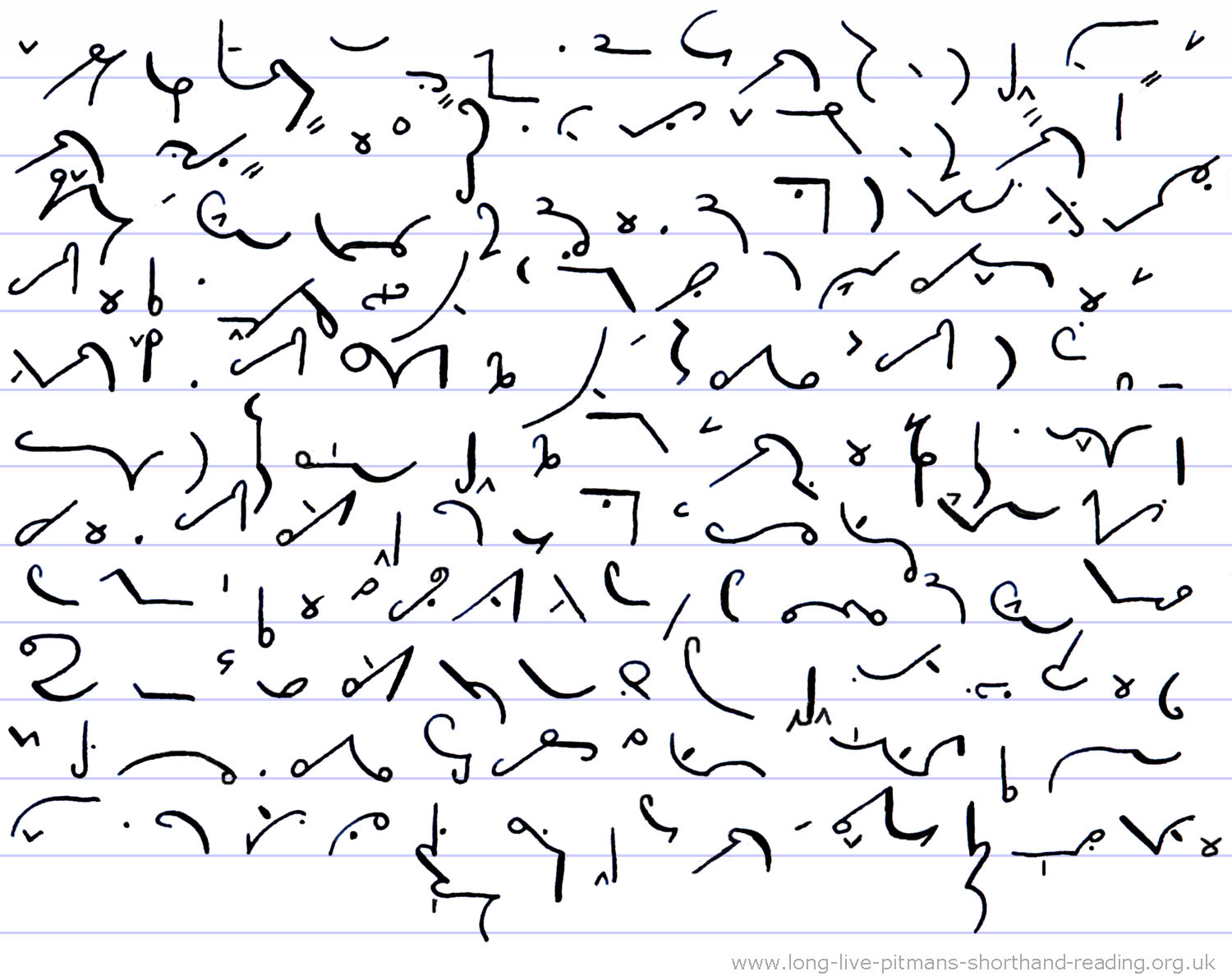
I recently visited Tonbridge* in Kent and took a walk along the river
path to see Town Lock on the River Medway. As there had been a lot of
rain, I expected to see the river at high level and flowing vigorously
through the weirs. The weir gate was partially open to release the
water. It is a counterbalanced curved shutter that can be raised or
lowered as required. On the upriver side, the water swirled towards the
shutter and although the surface of the water was flat, you could
clearly see that it was sucking down towards the gap on the river bed.
On the other side* it was an entirely different story.
The water surged
out from under the gate with enormous force, boiling and turning over
and back on itself. As the waves rode up over each other, some parts*
were flowing backwards, smashing together with the next surge before
being swept further down the narrow concrete channel. Within about ten*
metres, the surface flattened once* again, as the foam unfolded itself,
looking like a very holey lace tablecloth spread out over the river and
hiding the dangerous currents below.
* "Tonbridge" is pronounced tun-
* Omission phrase "on the oth(er) side" "wu(n)s again"
* "some parts" Outline for "parts" only
written like this in phrases where convenient
* Always vocalise outlines for "ten" "eighteen"

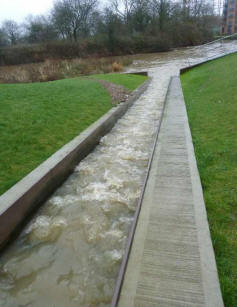
Main lock gate. Canoe and fish pass
For sound effects, see my video of this lock in
spate in Jan 2009 http://youtu.be/1IjlFB_EQdg
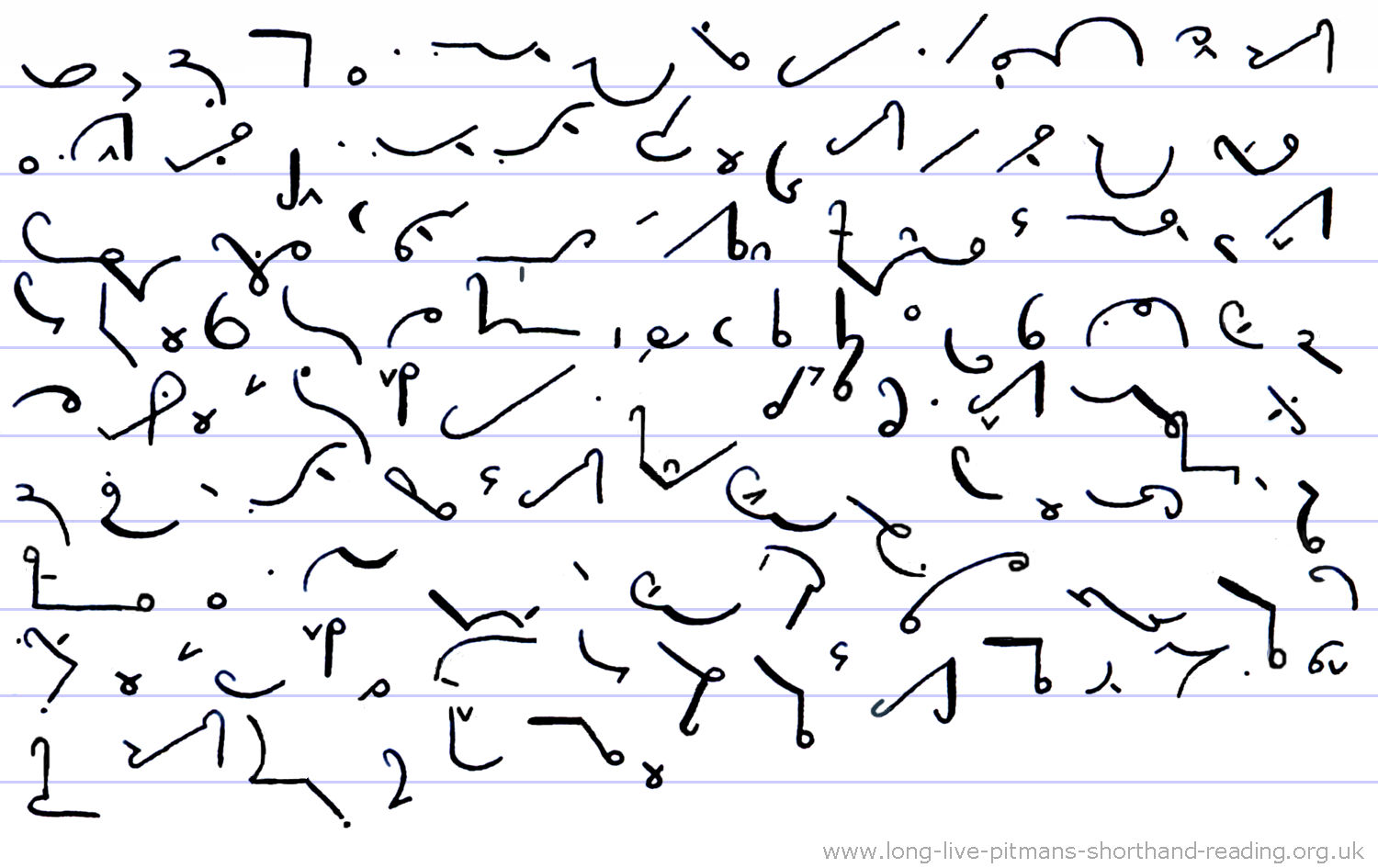
Next to the weir gate is a canoe and fish pass where a much smaller
amount of water is allowed to race down a narrow shallow channel. Within
the water are rows of fish brushes, flexible bristles that slow the
current and reduce turbulence, with the canoes able to ride over the
top. This is far less dramatic but is not without its dangers, as even
this lesser flow would be impossible to resist. On the far side where a
tributary joins, there is a wide unobstructed open weir consisting of
shallow steps with the water flowing peacefully over. In front of all
these structures is a long boom of floating orange cylinders, to prevent
boats from approaching. On the near side is the lock for the passage of
boats, with the wooden gates shut and only a slight trickle of water
escaping through the tiny gaps.
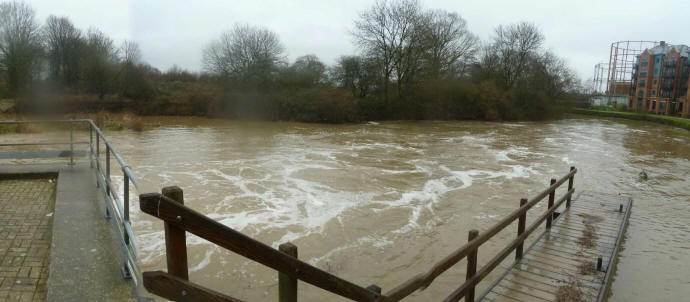
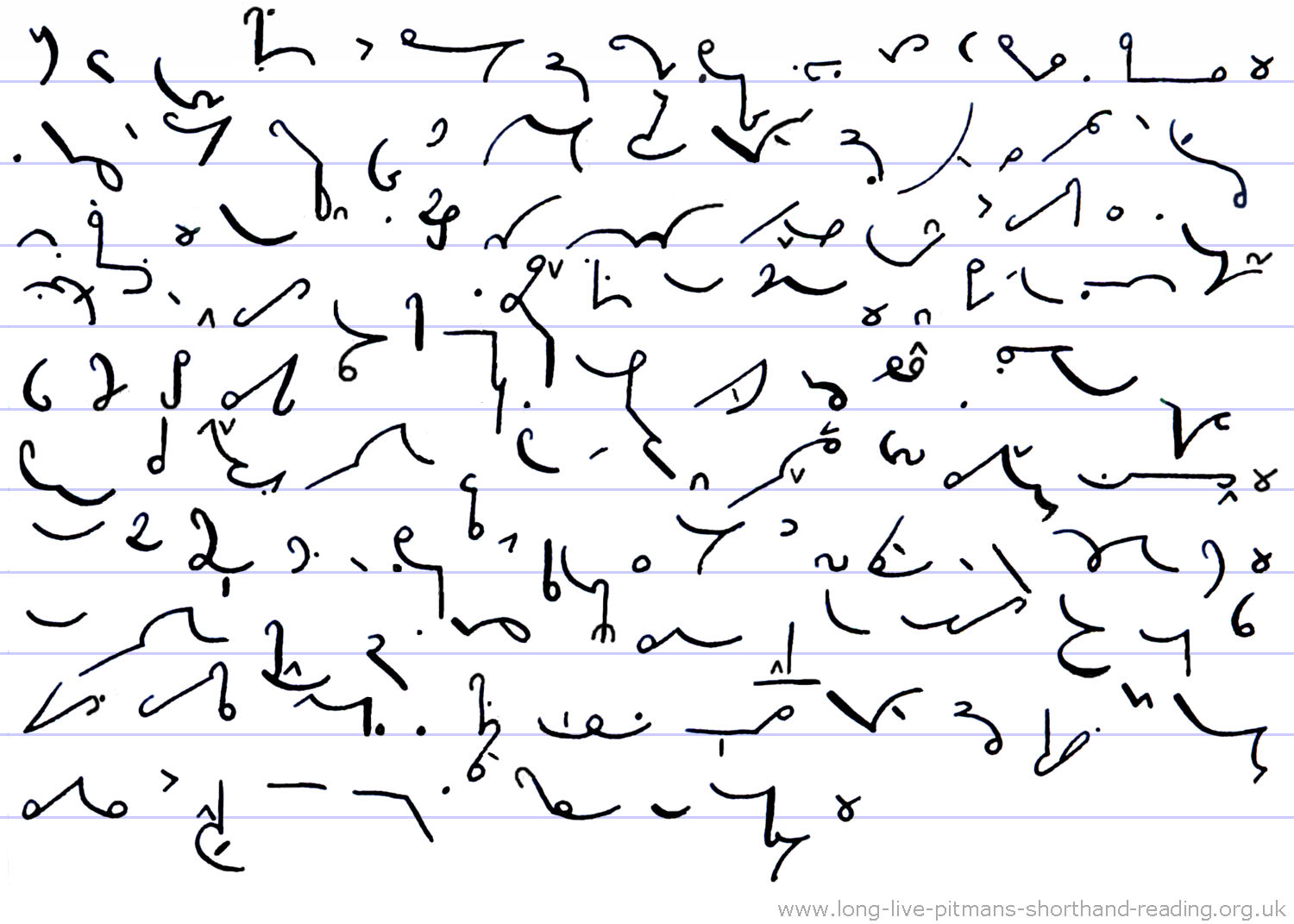
I was able to view the drama of the central weir from the safety of the
concrete island that supports the structures. The burst of energy
produced within the short length of channel below the weir shutter is
the result of force meeting constriction. Being a shorthand student*, you
will immediately recognise the fury of the water as a visual metaphor of
how one feels during a high speed attempt in shorthand writing*. You
start off calm, then there is the sudden surge of activity, the
unstoppable rush of words and sounds, the scrabbling to deal with
everything at once, and finally the relief when it is over and you
realise that you have survived the encounter. In shorthand there is no
threat to safety, and the discomfiture is only what you have chosen to
put yourself through. In real life* drowning would be an almost certain
outcome for anyone falling into those churning waters and indeed the
treacherous unseen currents below weirs, twisting about beneath the
surface of the outflow, can keep a person under indefinitely.
* Omission phrases "shorthand
s(t)udent" "short(hand)
writing" "real (l)ife"
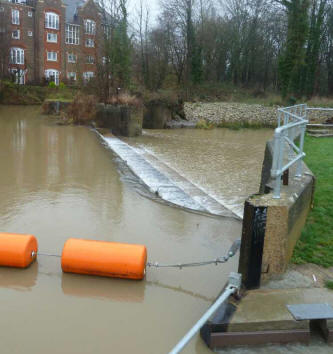
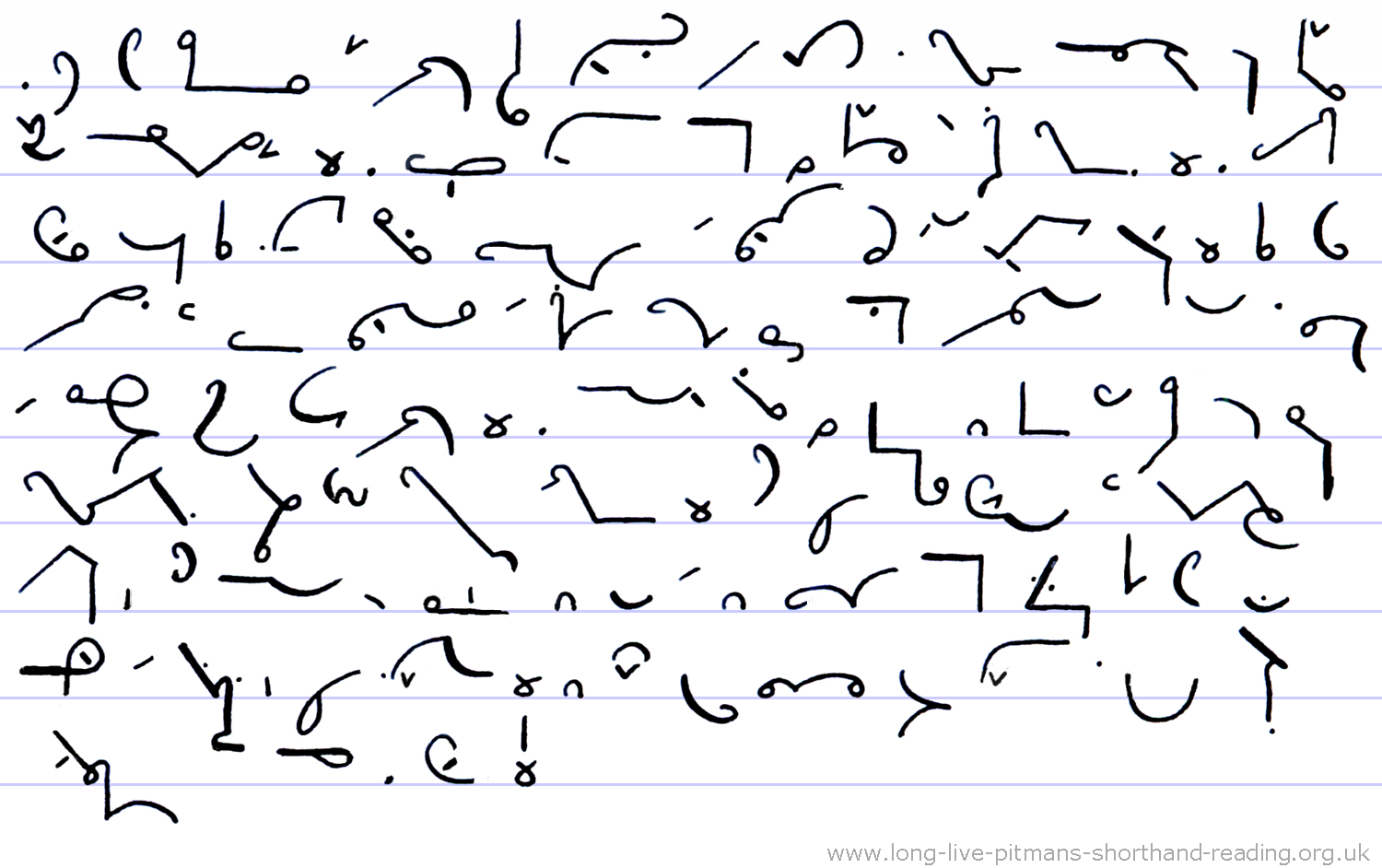
The three other structures on the river at this location are also a
perfect example of different types of shorthand experience. The closed
lock gate is the times of controlled practising. The water flows into
its allotted space, carefully and slowly so as not to rock the boat. It
is then released with equal slowness and control from the second gate
resulting in a smooth and successful journey along the river. The canoe
pass is the dictations you take in order to* stretch your speed,
preferably passages that you have prepared and practised. They are still
flowing with purposeful rapidity but they are not going to suck you
under and you merely get ejected at the other end, exhausted and
bedraggled but still alive. You might even sometimes feel like a fish
battling upstream against the flow!
* Omission phrase "in ord(er to)"
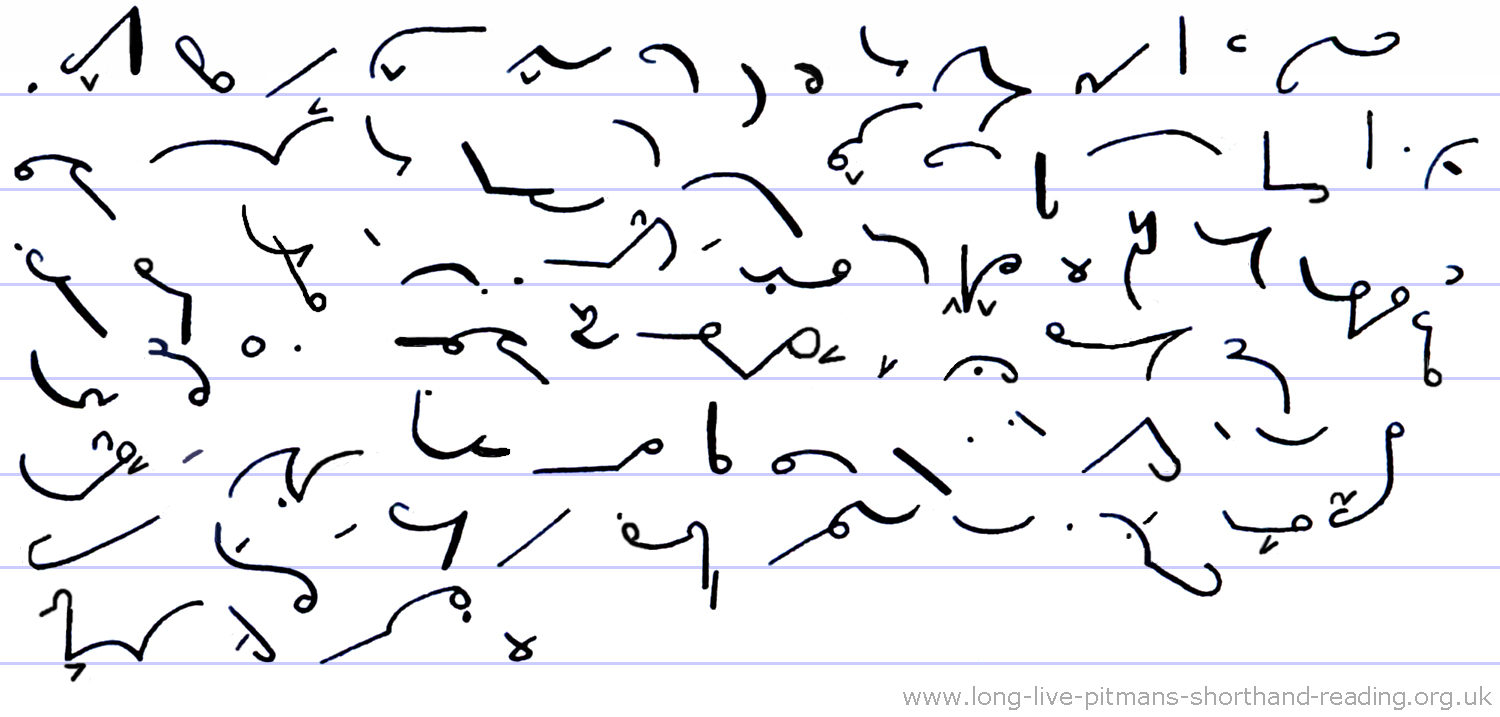
The wide steps are like writing very easy words for the level you are
at, with well-known simple material for the beginner or maybe slightly
more difficult matter taken at a low comfortable speed, for the purpose
of improving the accuracy and neatness of your outlines. I do not think
any other*
visitors would view the weirs as an example of shorthand
experiences, but the main central weir with its furious and lethal
tangled currents does seem to be an apt representation of any situation
where force and energy are concentrated, resulting in an eruption of
chaos and turmoil upon release.
* Omission phrase "any oth(er)"
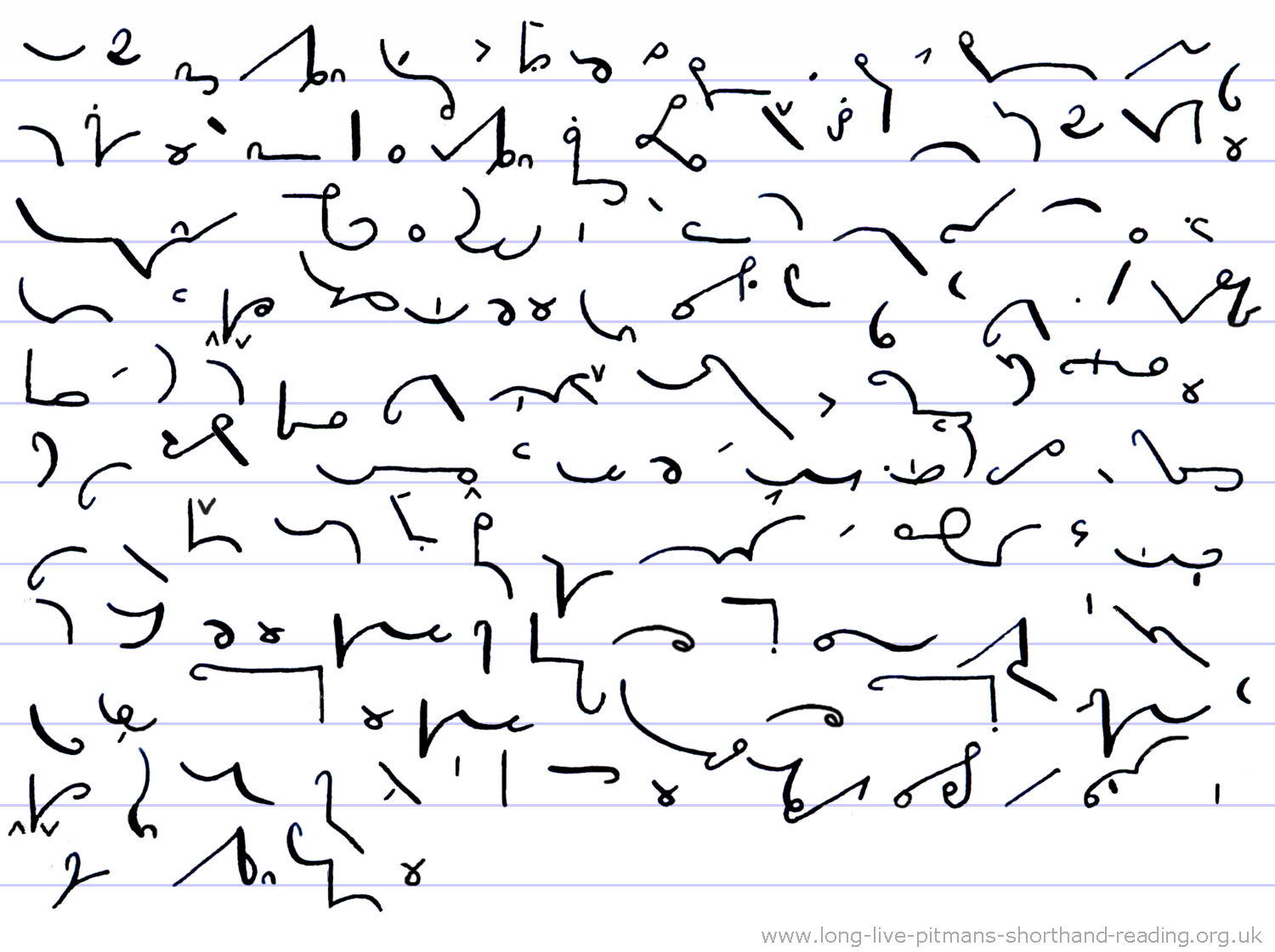
In shorthand, you cannot reduce the force of the torrent of words, as
the speaker, the speed and the subject matter are not within your
control. All you can do is to reduce the constriction as much as
possible*, by constant improvement of your shorthand ability. Vocabulary
extension is essential, but of equal or maybe greater importance is
complete familiarity with outlines for the most common words. If you
hesitate over these, that will be a large percentage of the text, and so
your difficulties will be multiplied in proportion to the frequency of
their occurrence. There will always be encounters with new words, and
knowing the commonest ones to perfection will put time in your pocket,
as it were*, to deal immediately and successfully with the unknown or
unusual words. "Dealing with" during dictation means getting something
readable on paper, even if it is not correct. "Dealing with" afterwards
means correcting and drilling that outline, so that you never trip up on
it again. In this way the hesitations are slowly but surely reduced over
time.
* Omission phrase "as much as
poss(ible)" "as it (w)ere"
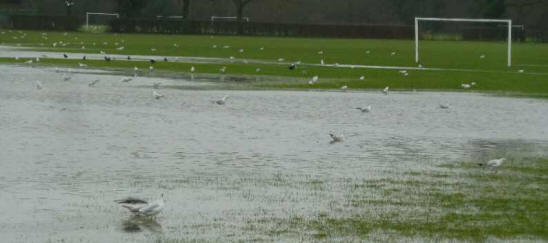
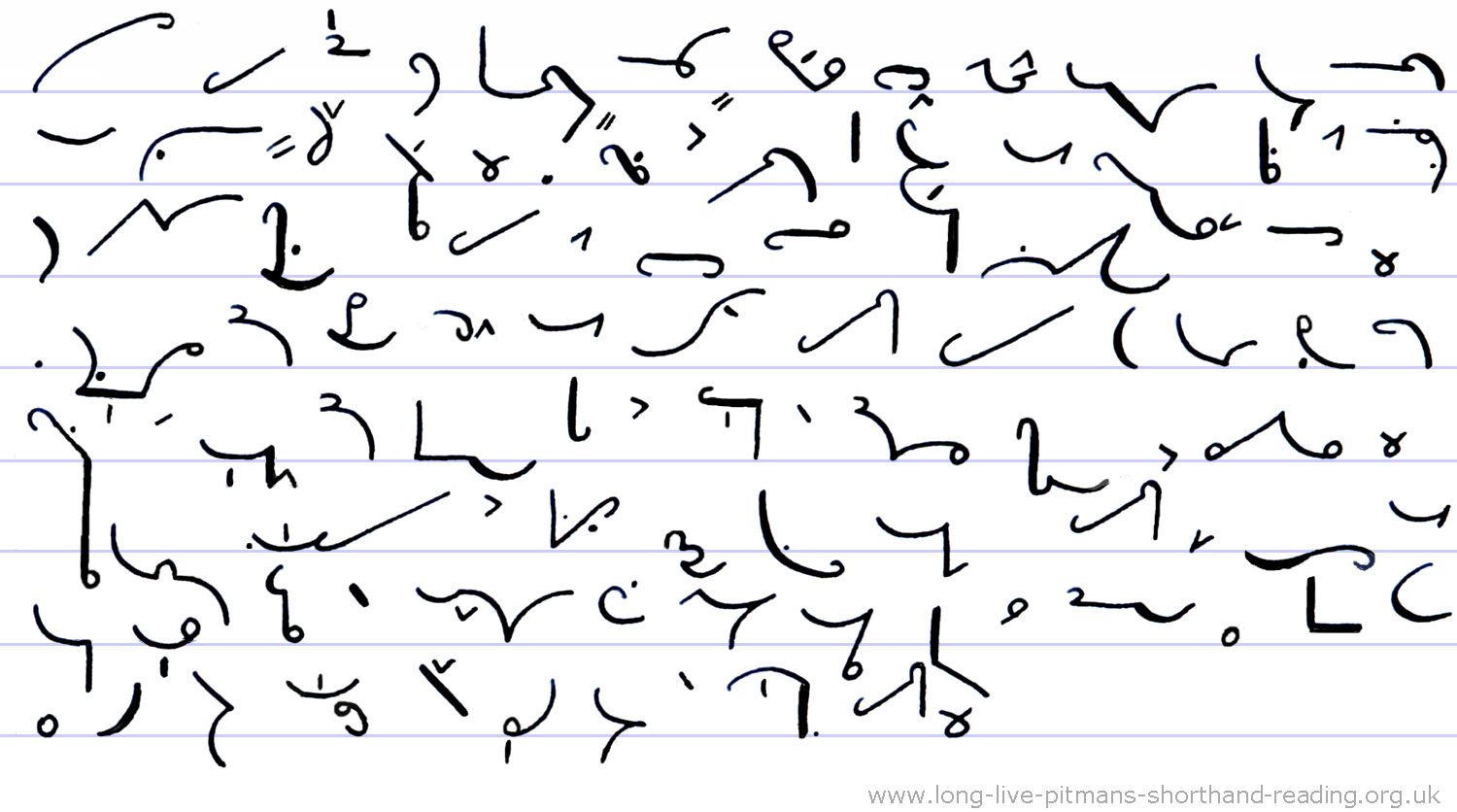
Later on we walked through Tonbridge Castle sports ground and found the
football field covered in lake-sized puddles. The braids of the river
had overflowed in the previous days and the excess was rapidly draining
away and the green grass emerging again. The seagulls were standing
around in the shallow water, where they felt safe from predators, and no
doubt were taking advantage of the glut of worms driven to the surface.
If you were* unaware* of the terrain, you would not venture into the
water, but the young man in the photo knows that it is all entirely flat
and only inches deep, and is walking his dog along his usual path,
unconcerned by shoes full of muddy water.
* Omission phrase "if you (w)ere"
* "unaware" Advisable to insert the vowel after the N, and with "unwary"
to insert the last vowel, as these two have similar meanings
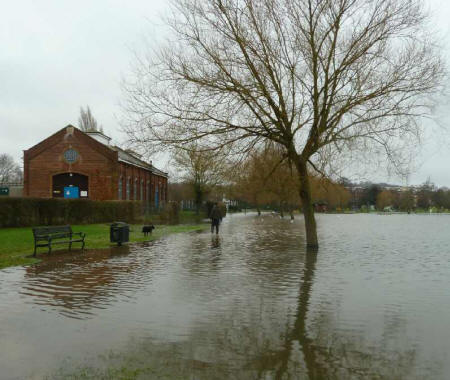
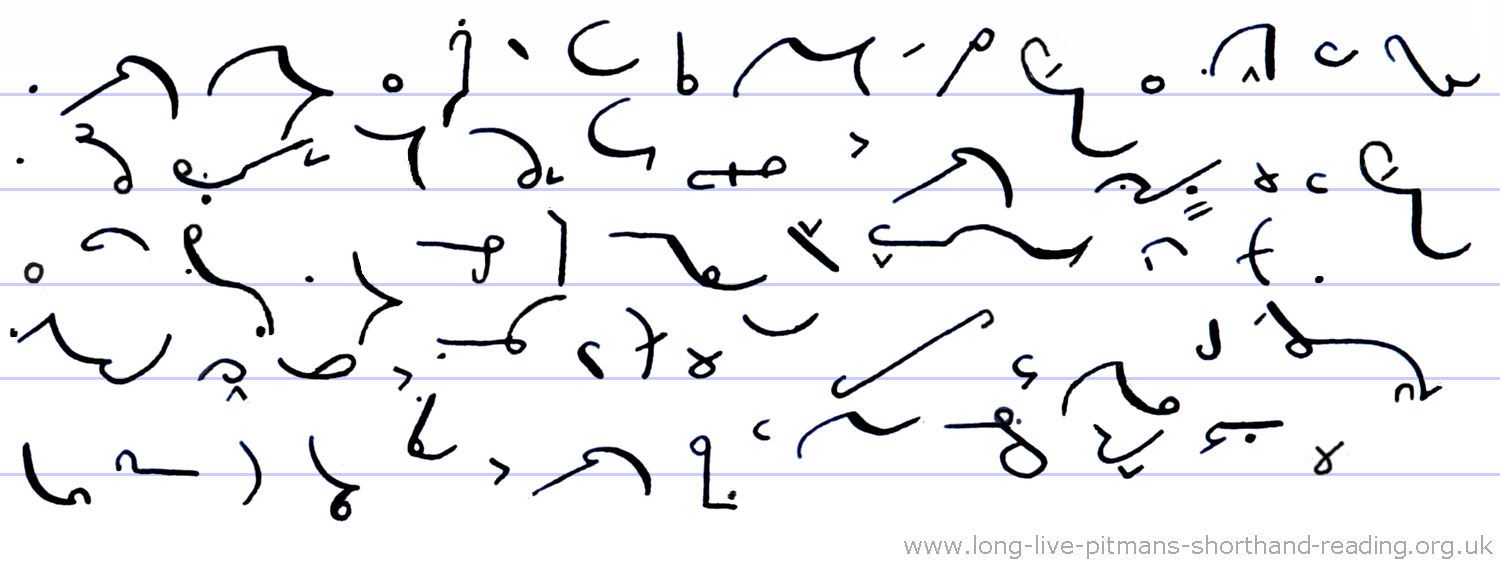
The river level is controlled all along its length and such flooding is
allowed in order to* prevent a worse scenario in other areas along the
course of the River Medway. When flooding is more severe, the full
extent of it can be seen by climbing the motte (the artificial mound
next to the castle building). In winter when the leaves do not obscure
the view you can see fields adjacent to the river streaked with long
expanses of white and grey. (1134 words)
* Omission phrase "in ord(er to)"
Top of page
Short Form Pairs
(18 January 2013)
The short forms being drilled are in capitals, and similar or related
words are underlined
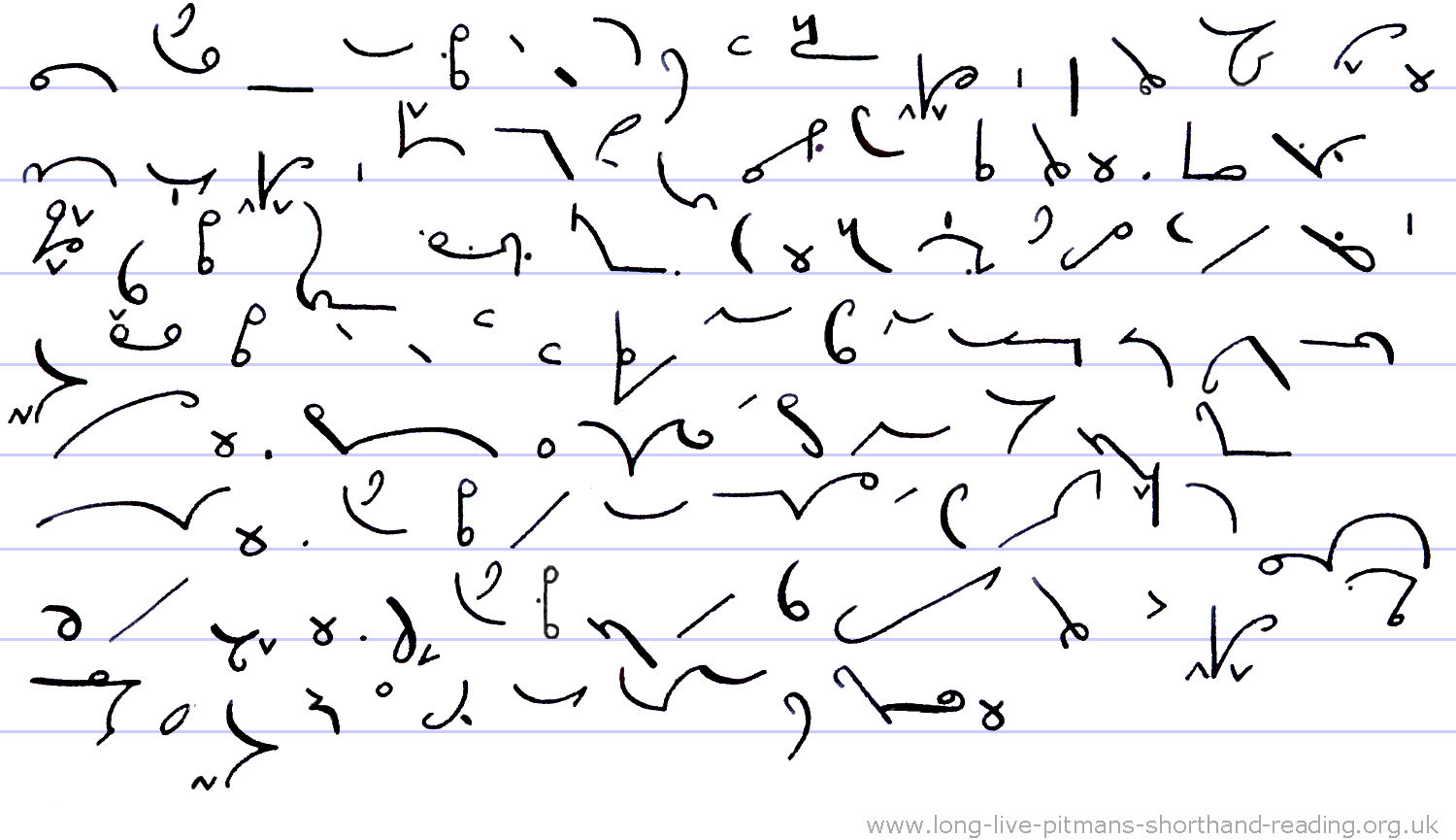
Some short forms come in sets of two or three, with identical outlines
but different positions in relation to the* line. You may know the
outline, but time can be lost if you hesitate over its position. The
text below highlights these sets, so that you can concentrate on
practising them. I have omitted the short ones that are based on vowel
signs, such as "of, to, with, when" etc and any others not included here
will be covered later on. The subject matter is irrelevant and has been
written only to provide practice material. The short form sets are in
capitals, and other related or similar words are underlined. The easiest
short form sets to remember are those where the position of the outline
matches exactly the first vowel of the word, as shown in the following
three paragraphs.
* Omission phrase "in relation (to) the"
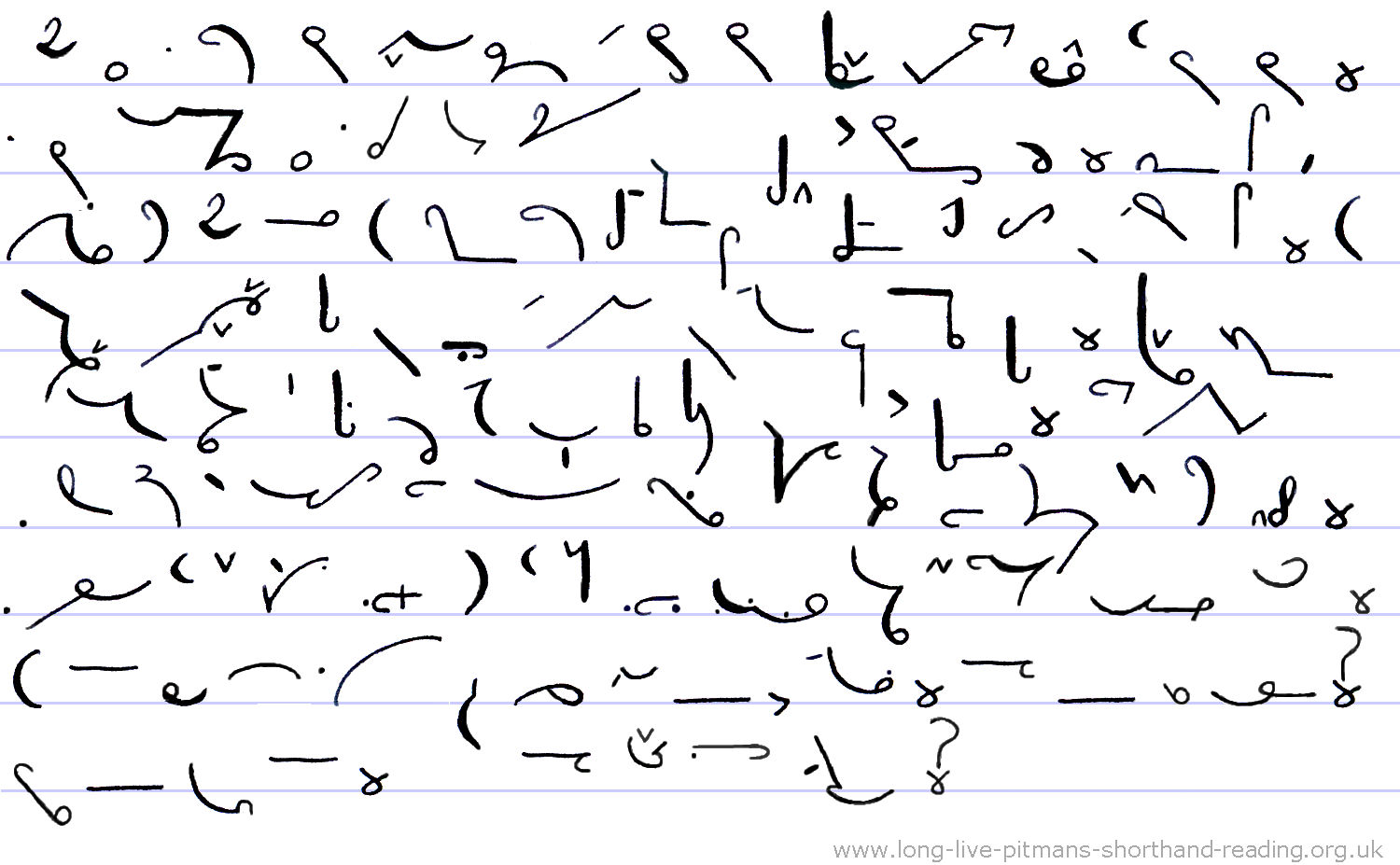
Shorthand is a very SPECIAL writing system, and has been SPECIALLY
designed to record the sounds that people SPEAK. A SPEAKING engagement
is a chance for the shorthand writer* to take down all the spoken words.
You can TELL who loves their shorthand because they practise from dawn
TILL dusk and do not want to stop at all. They obviously realise the
ADVANTAGE to be gained and are not put off when it gets DIFFICULT.
Advice to practise never falls on deaf ears, and they know it is
advantageous to deal with all the difficulties. ACCORDING* to the
report, the staff were all in one ACCORD in their praise of those who
CARED so much about their students. The reason that I wholly concurred
was that I had concrete evidence for this and I accordingly enclose the
information. They CAN send me a letter, but they must not COME to the
office. CAN you COME to us next week?* Please COME if you CAN. CAN you
find the can opener?
* Omission phrases "short(hand) writer"
"according (to) the" "ne(k)s(t w)eek"
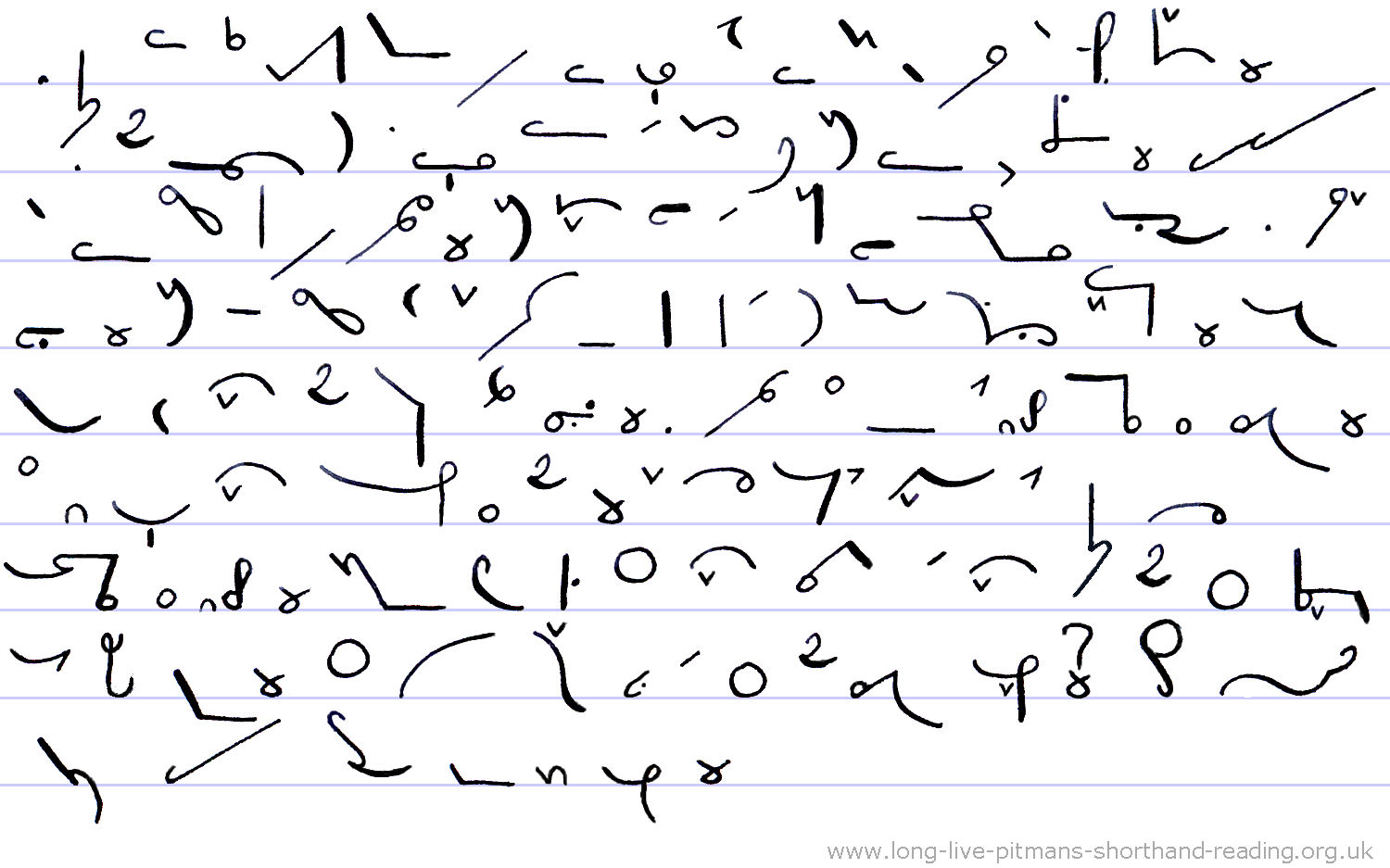
The teacher CALLED on us to read back our COLD notes, and that EQUALLED
about two hours of study time. The shorthand exam was a close CALL and I
am not sure I was EQUAL to the task. We were all EQUALLY surprised at
our results. I was on my GUARD and I had GREAT expectations* of gaining a
high grade. I was QUITE surprised that I really COULD do it, and so I
could not remain quiet. Never being WITHOUT my shorthand pad, THAT is
the secret. The result HAS come, and the student gets HIS certificate.
AS you know, my interest IS shorthand. I MYSELF enjoy writing and the
teacher HIMSELF encourages his students. I practise every day AS IS my
habit and my shorthand IS AS described in the instruction book. HAS HIS
letter arrived yet and IS HIS shorthand certificate inside? AS HAS been
mentioned before, we are planning to come to you next month*.
* "expectations" Optional
contraction
* Omission phrase "ne(k)s(t mon)th"
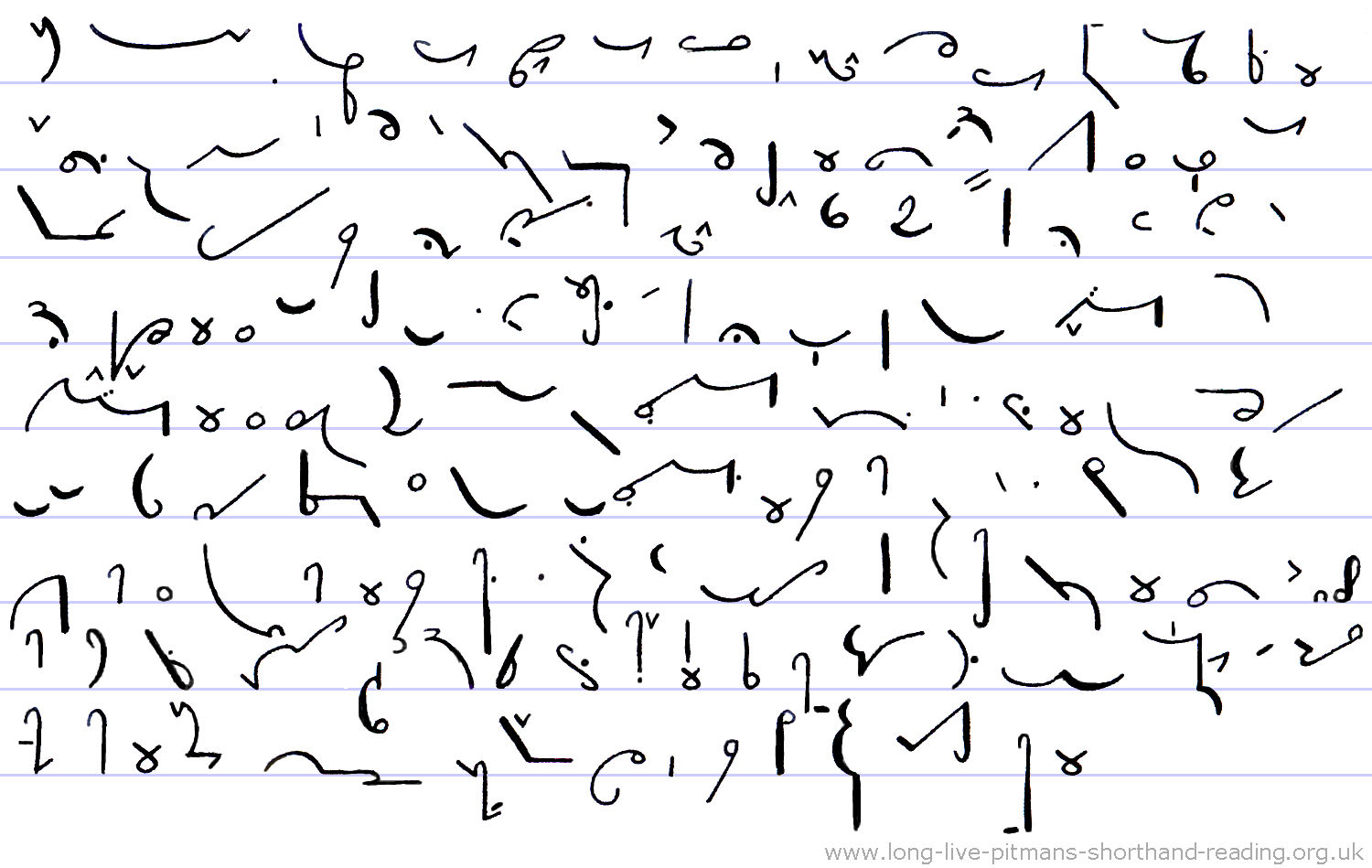
I was neither the fastest NOR the slowest in the class, but I found
myself NEAR the top in this test. I seemed to have written on YARDS of
paper to get all the WORDS down. Mr Ward read his notes in the backyard*,
where he aired the laundry, and found that his shorthand had erred with
lots of weird outlines. His HAND had been UNDER a lot of strain, and it
made no difference being right-handed or left-handed. His certificate
was not going to be handed to him on a plate. If your actions are
underhand, then you are described as being underhanded. He TRIED to
think of a subject that would lead TOWARD his future TRADE. He would
tread a path that no-one had trodden before. Some of the students TRIED
their best to learn, but others were just plain trying! It is true that
he will say nothing untoward and always utter the TRUTH. I asked the
mechanic to true the bike wheels but he said they had already been
trued.
* "backyard" Note that "yard" on
its own is the Ard stroke above the line
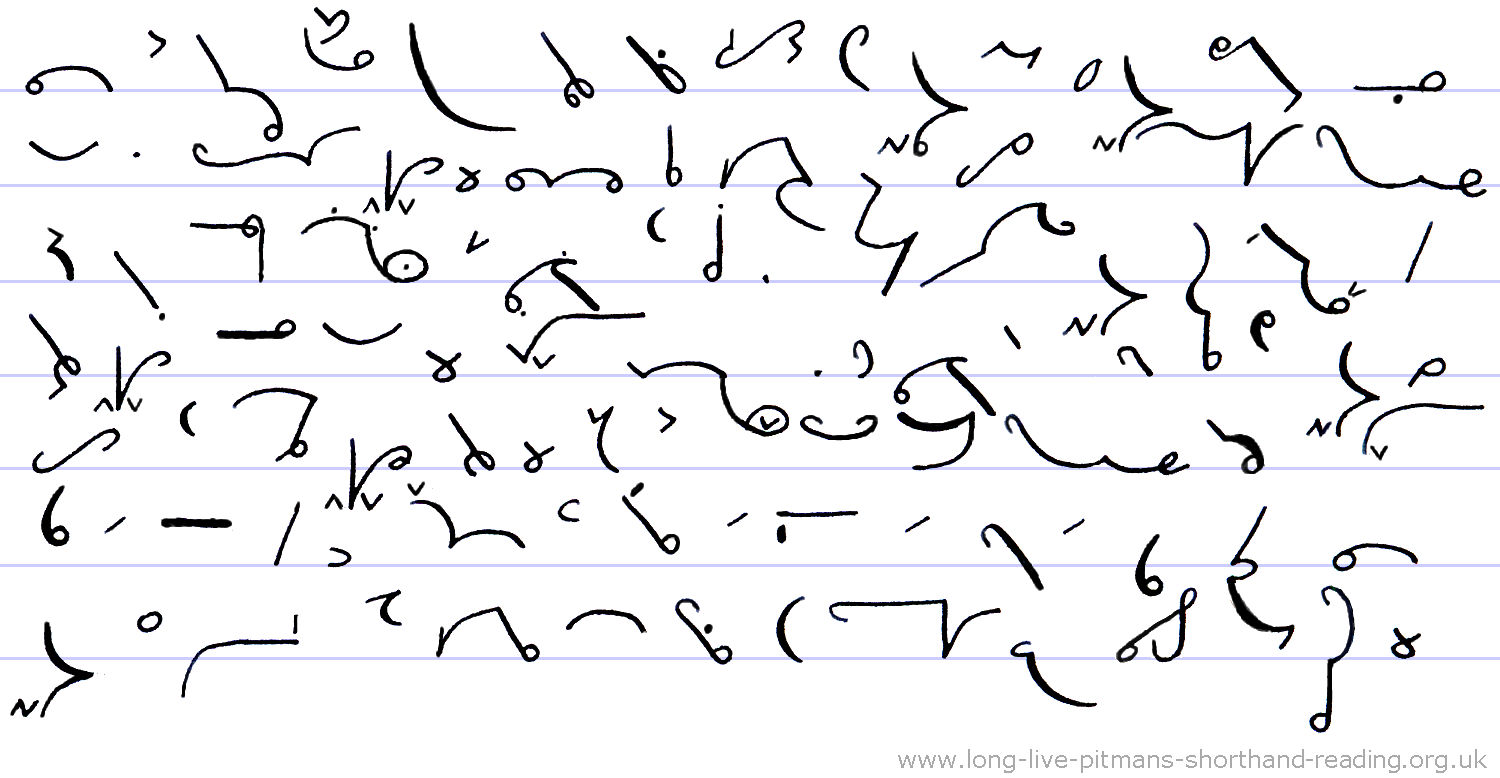
Some of the pairs of short forms have their* positions based on one of
the other vowels, and not the first vowel as would be the case in a
normal outline. Sometimes it is helpful to change oneís mental
pronunciation of the word, putting extra emphasis on the syllable that
contains the relevant vowel, so that it is obvious which
position the
outline goes in. I like to emphasise the third syllable of "opportunity"
as that vowel is the one that matches the outlineís position. I think of
the Northern English pronunciation of words like THOSE and GO which
would rhyme with "pause" and "caw", and NUMBER and THUS, which would
have the same vowel as "look" and that helps me place them correctly
whenever hesitation threatens.
* "have their " Doubling for
"their"
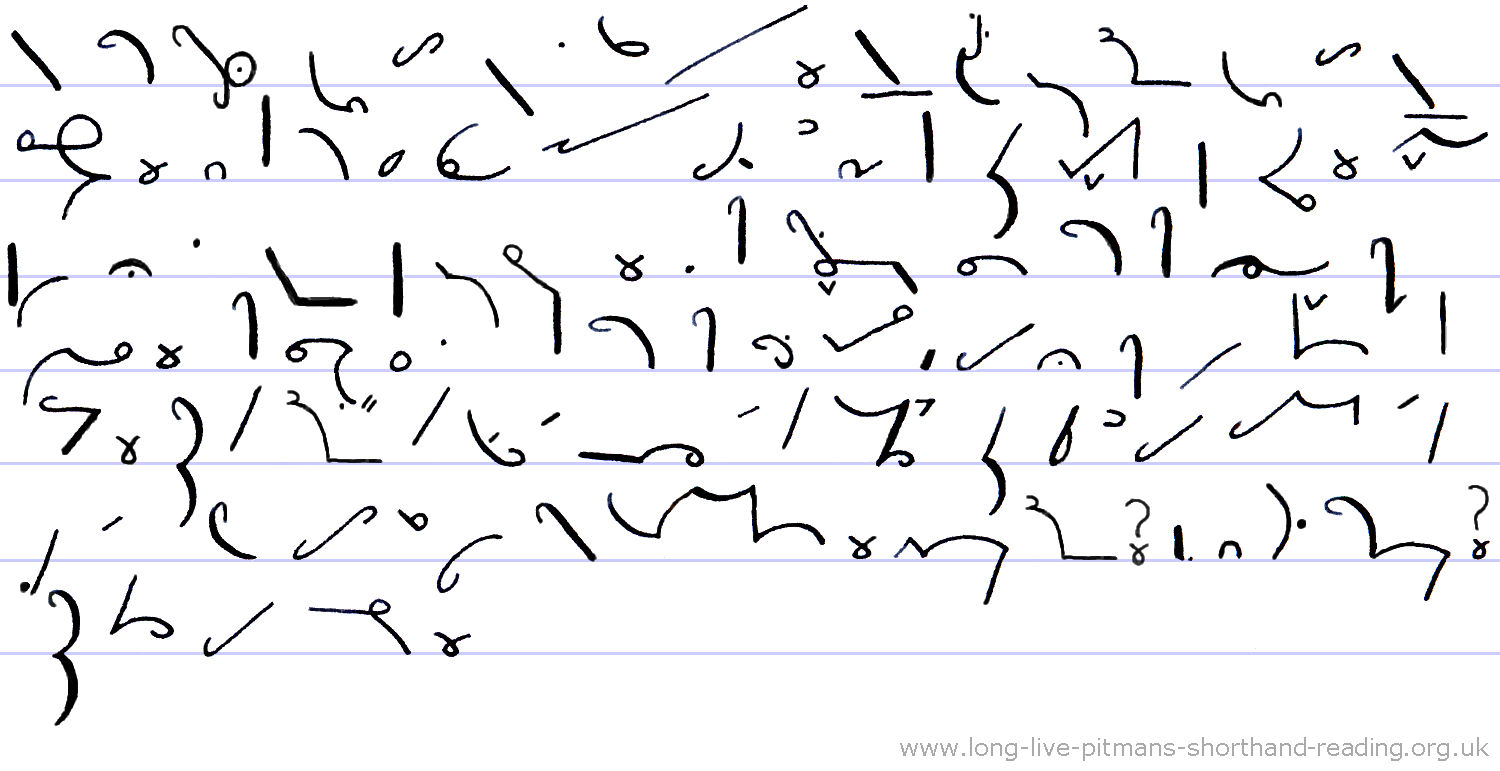
BE very persistent if you want TO BE a fast writer. Become attentive to
your work if you want to become successful. You HAD your first lesson
and were shown what you should DO, which was to write DIFFERENT shapes.
Writing DIFFERENTLY made a big DIFFERENCE to your speed. The DOCTOR
prescribed some very DEAR medicine DURING the illness. DR Smith is a
very DEAR friend of ours who we met DURING our time at college. There
was MUCH work, MUCH fun and games, and MUCH enjoyment, WHICH was just
what we wanted and WHICH each and every one of us will remember for a
long time*. How much work? Did you say very much? There was
much more
than* we expected.
* Omission phrase "for (a) long
time" "much m(ore tha)n"
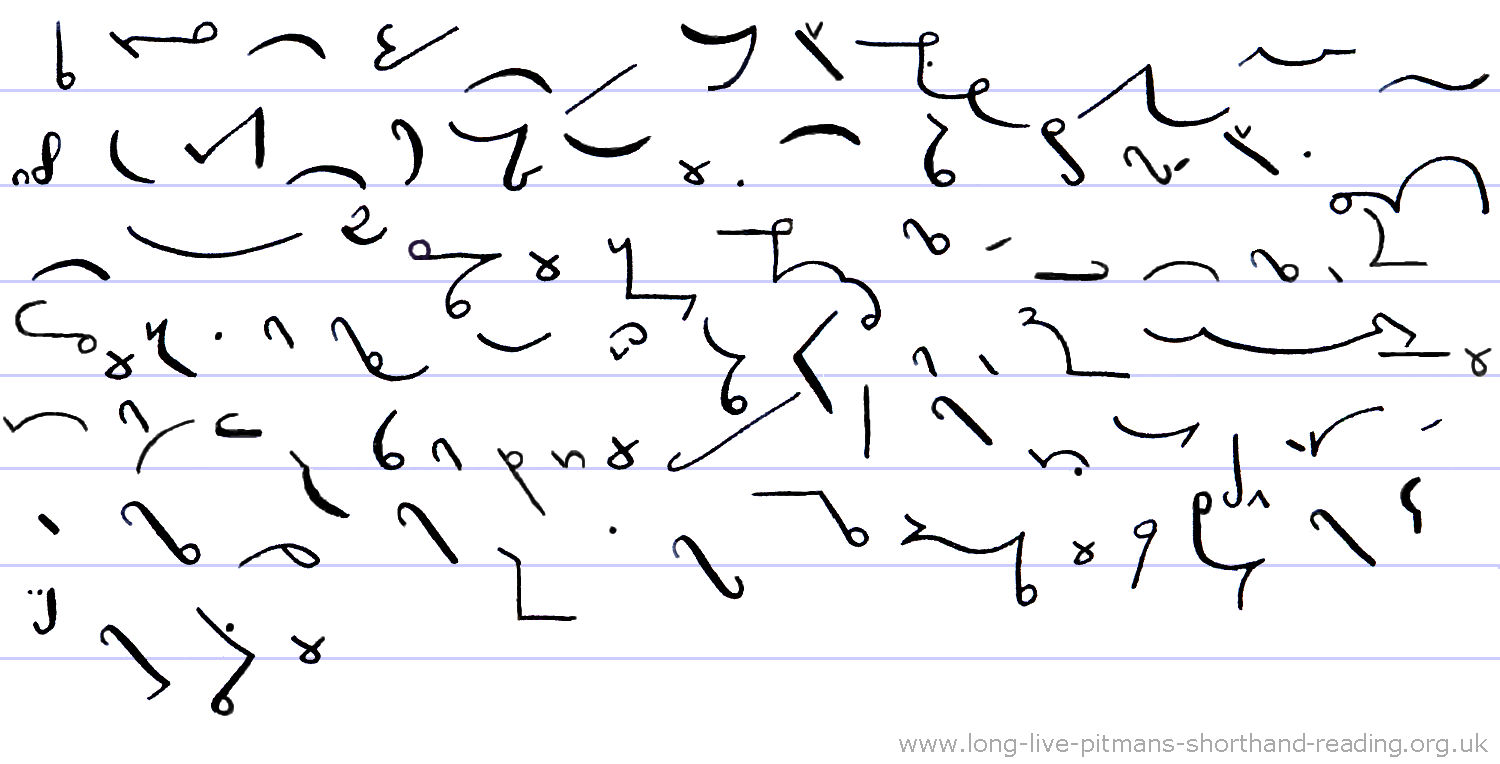
It is of course IMPORTANT that we IMPROVE our English by extensive
reading and in fact* many students have already IMPROVED their knowledge
of the language. The IMPORTANCE of this has been proved by a similar
IMPROVEMENT in their shorthand skills. I took the customerís PARTICULARS
and gave him OPPORTUNITIES to ask questions*. I have a PARTICULAR* person
in mind for this job OPPORTUNITY* to work in another part of the
company. I am PARTICULARLY glad to have this OPPORTUNITY to speak to
you. We are at LIBERTY to meet in the town hall, and all MEMBERS must
REMEMBER to take a NUMBER of copies of the minutes. He suddenly
REMEMBERED that he had not NUMBERED the pages.
* Omission phrase "in (f)act"
* "questions" Optional contraction
* Don't join "particular" or "opportunity" in phrases, as it would look
like "part"
* Omission phrase "in another part (of) the
company". The F/V hook for "of" is omitted so that it does not look like "number
of"
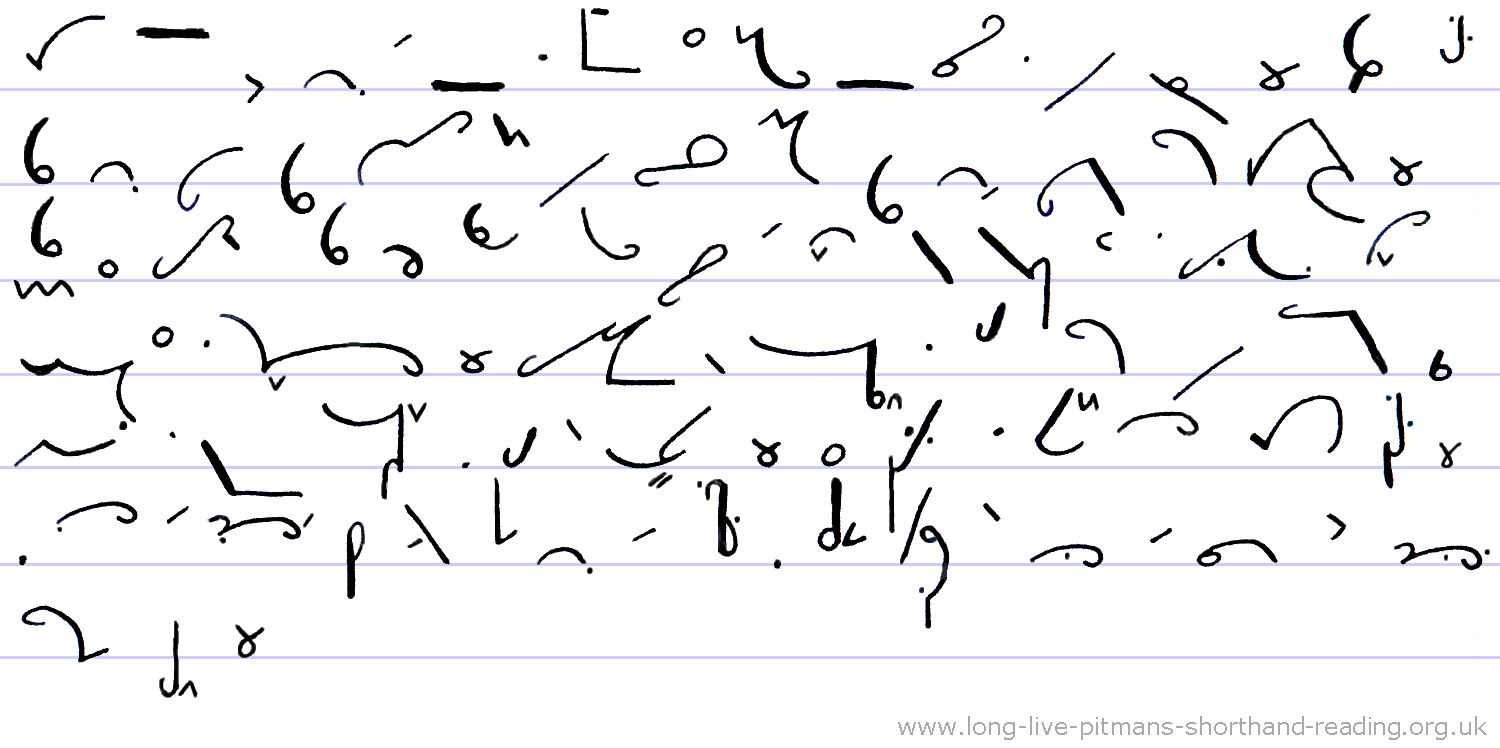
I will GO to the meeting and GIVE a talk, as I have been GIVEN half an
hour to speak. THOSE who attend THIS meeting will THUS learn about our
courses, and I think these meetings will be very helpful.
THYSELF is one
of THOSE words that is not often used and might be better with a wavy
line underneath as a reminder. We would like to introduce a GENTLEMAN
from our club who has written a book entitled "The GENTLEMEN of New
York." His agent, a giant man, also attended. The man and
woman stood up
at the meeting and addressed the audience which consisted of men and
some of the women from the town.
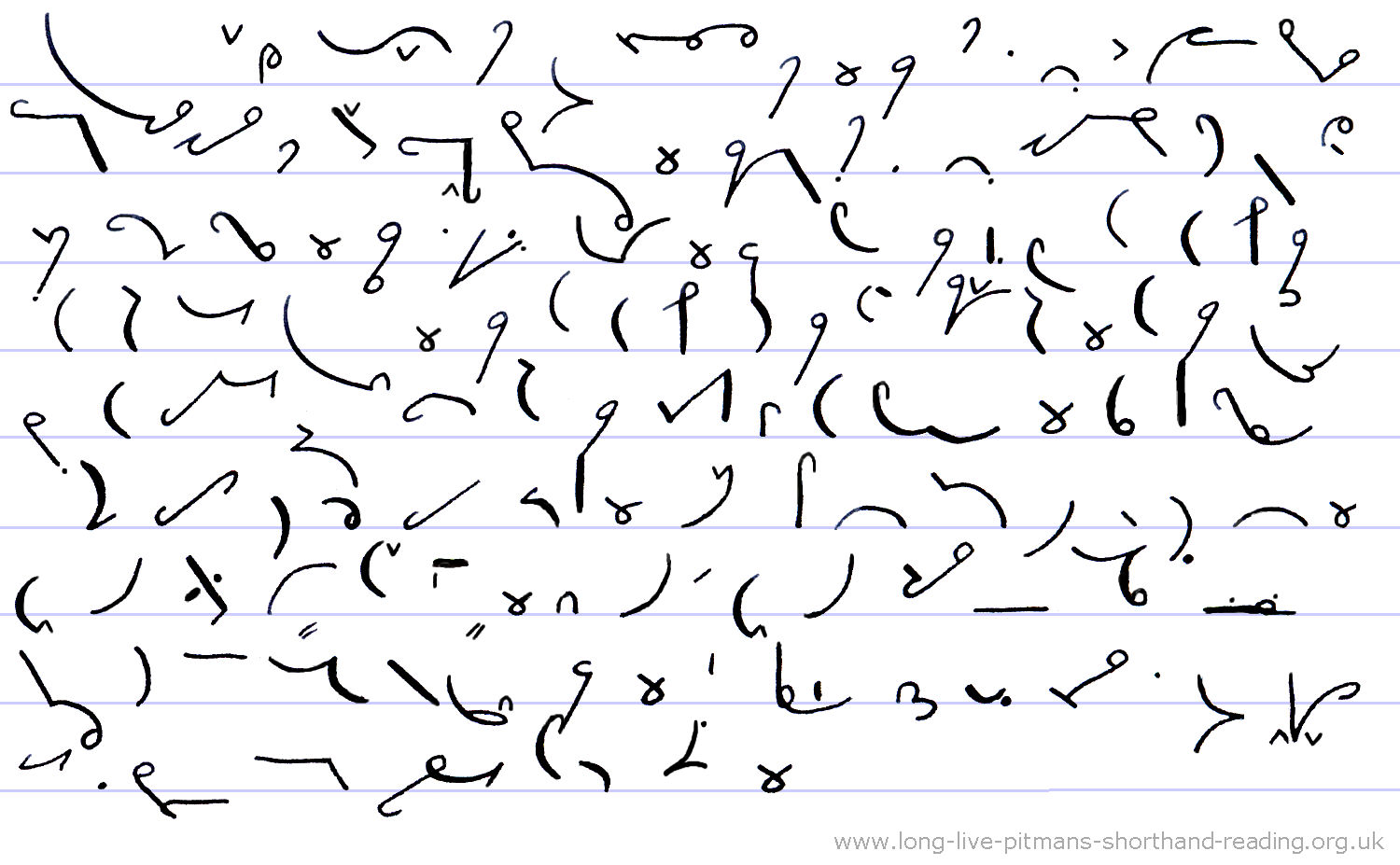
Afterwards, I settled in my CHAIR, full of Christmas CHEER. He CHAIRED a
meeting of the local sports club and was CHEERED by the crowd of
supporters. He will be CHAIRING the meeting and we expect there to be
lots of CHEERING from the members. He is a cheery fellow. When it was
OVER, he did HOWEVER THANK them and said he would THINK of them in the
future. He THANKED them and said he thought highly of them. THOUGH he
had finished speaking, they wanted to hear more, ALTHOUGH he had already
told THEM everything. This person WAS the one WHOSE words we heard. I
SHALL tell him of your WISH to see him. Thou SHALT obey the Lord thy
God. "You SHALL" and "thou SHALT" always come in those exact pairs so
can never be confused with each other. On its own, you would need to use
a full outline: the speaker kept using the word "shalt".
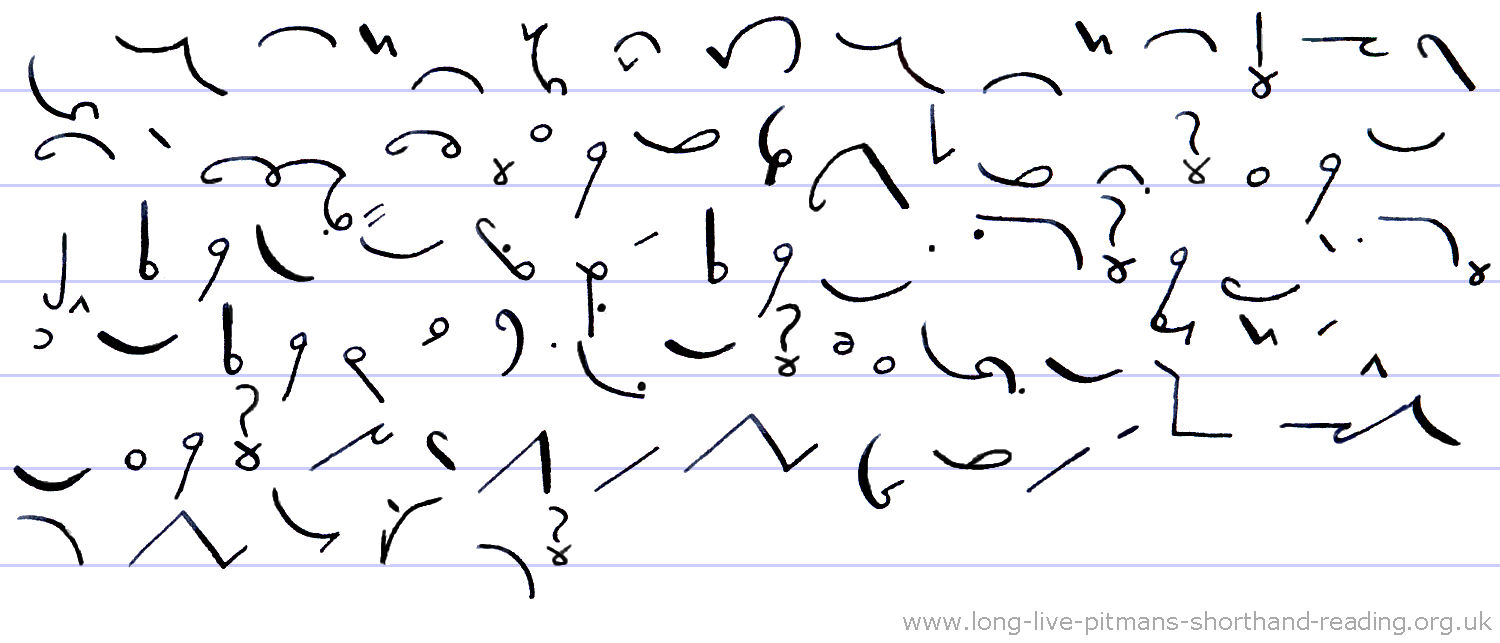
If you inform ME about HIM I think you might also inform HIM about ME!
Can you remember MORE of MR Smithís REMARKS, has he INFLUENCED those who
will be at the NEXT meeting? Is he IN town, does he have ANY place to
stay, and does he OWN a car? He is not the owner of a car. What LANGUAGE
does he speak and is there a fee OWING? What is his favourite THING to
talk about, and how YOUNG is he? ARE you able to read OUR report within
the next HOUR, and can we have YOUR report for the whole YEAR?
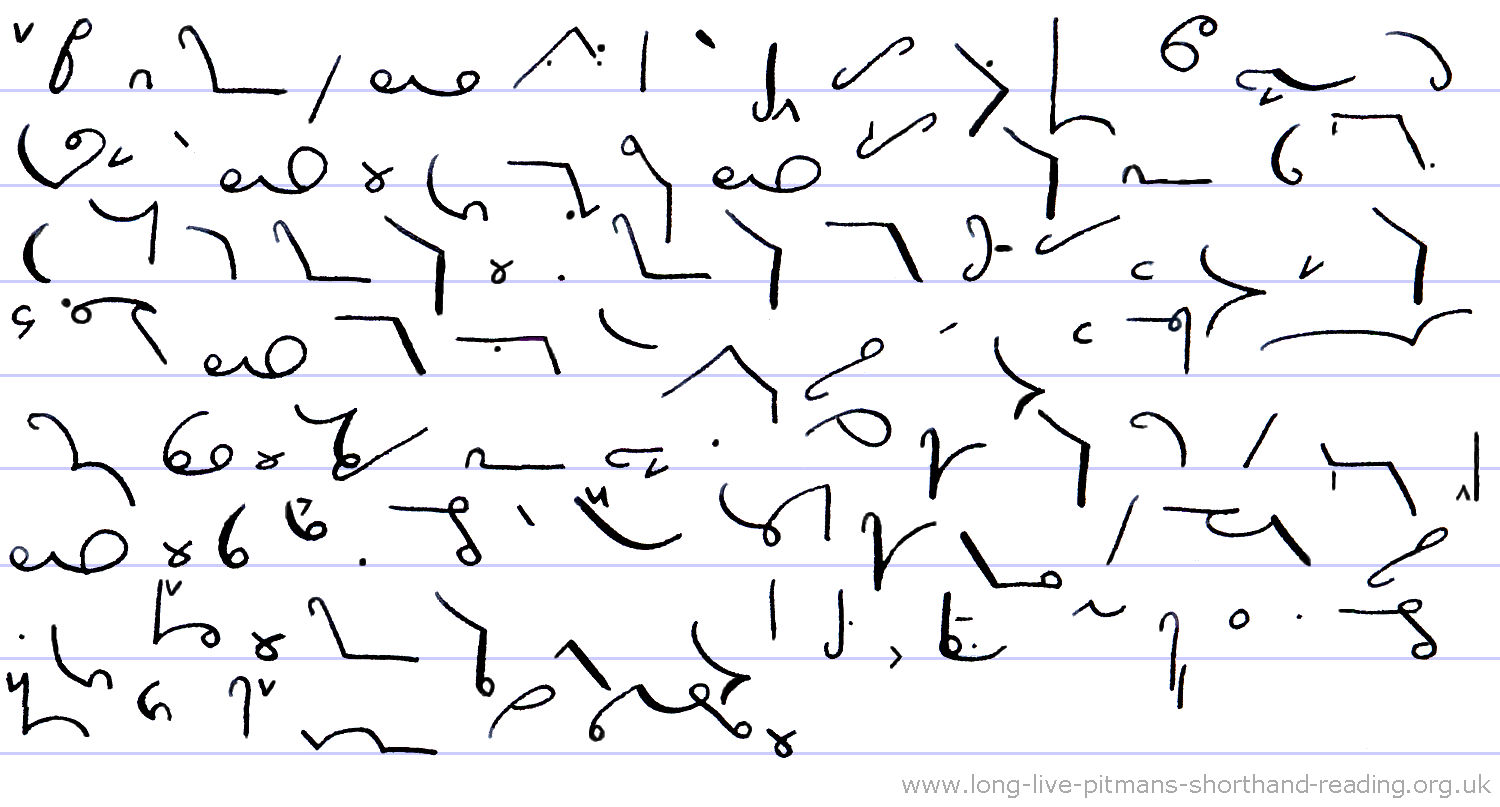
I suggest you practise each sentence, repeating it all down one page at
a time*, as well as creating your own variations of sentences. If you
keep the separate sentences on one pad, you can then copy them onto your
practice pad. The practice pad can be thrown away when full, but the pad
with the sample sentences can be kept for repeated use and filled with
extra material from your lessons. In this way you can create a master
drill pad from which to copy out the sentences. This avoids the expense
of buying facility drill books, which can only be* used a few times.
Practice pads should be filled at "ten to the dozen" and not treated as
an expensive item that you try to make last as long as possible*.
* Omission phrases "at (a) time" "as
long as poss(ible)
* "can only be" The outline for "only" on
its own uses full strokes N and L
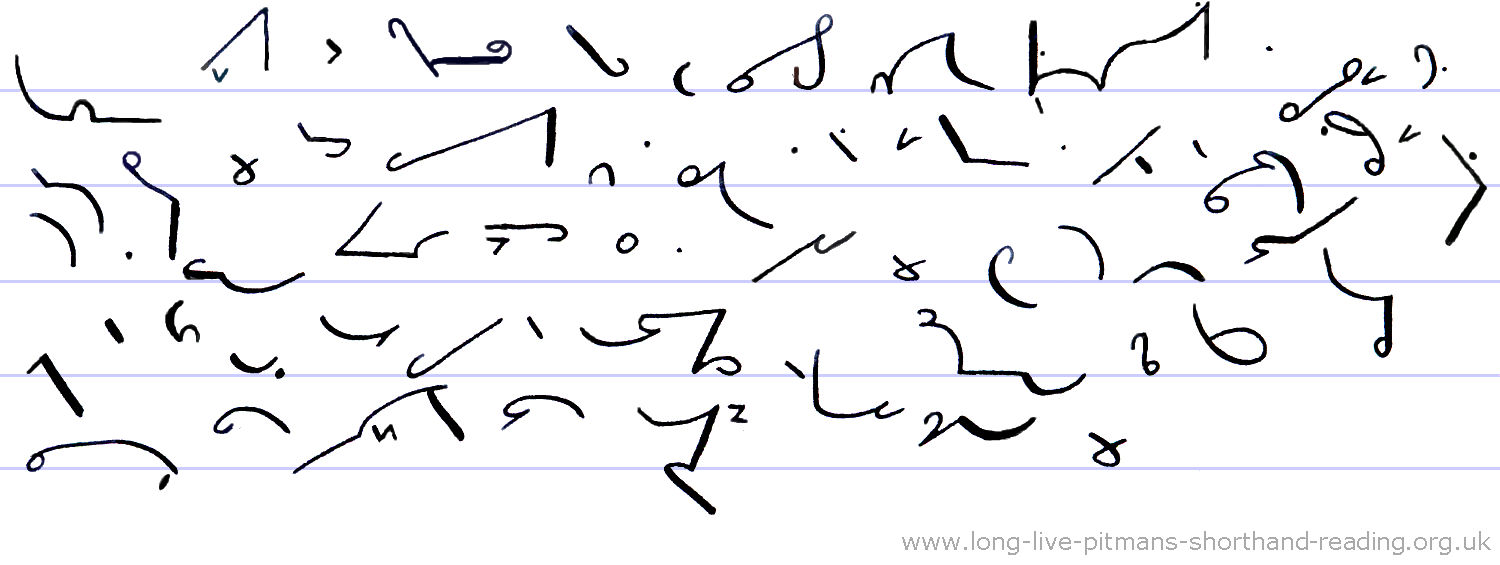
If you can write all the paragraphs above without hesitation, you will
have demolished a serious threat to your speed. I cannot award you a
certificate, a pat on the back, a row of silver stars on the page, or a
golden chocolate coin as a reward. However, your improvement and greater
confidence should be all that you need in the way of encouragement to
continue working towards faster, smoother, more reliable and more
enjoyable shorthand writing*.
(1599 words)
* Omission phrase "short(hand) writing"
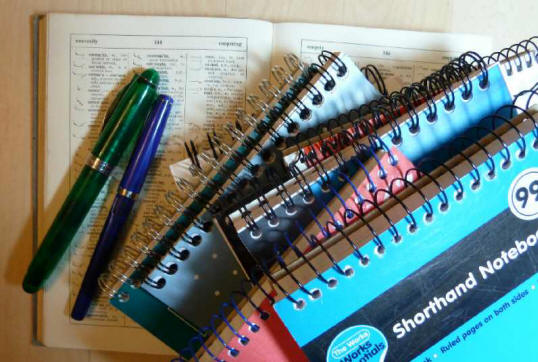
Practice Makes Perfect: fill 'em up, throw 'em out, as fast as possible,
smooth ones for fast classroom work, cheap low-quality ones for home
practising
Top of page
Shorthand Gloves
(21 January 2013)
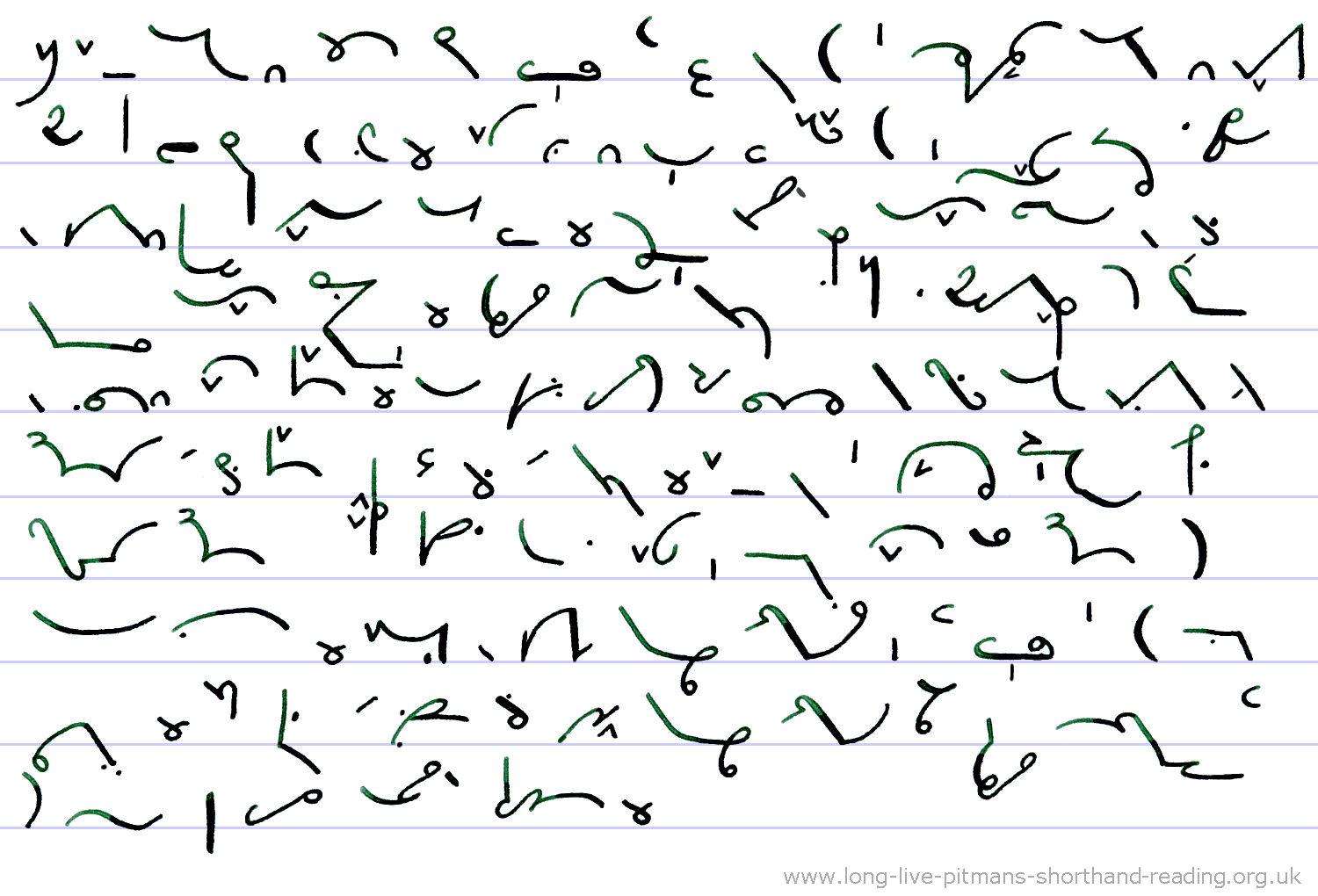
I wish I could inform you of some special gloves that, when you put them
on, mysteriously enable you to write shorthand at great speed without
effort. Iíll let you know when I find them, but meanwhile here is a
suggestion to help you continue writing in the cold. Years ago I used to
sit in my garden to paint pictures in my sketchbook. This was long
before I had a shorthand website or blog to consume my time. In chilly*
weather I would sometimes be brave enough to wrap up warmly
and spend
time outside with the paints and paper. I could* put on layers of
clothing and stay perfectly warm, at least* for a while, but keeping my
hands warm was another matter. I needed to hold the pencils and brushes
but with gloves on they kept slipping. I tried tape and elastic bands
round the pencils and brush handles, but this was impractical with so
many different ones in use at one time*.
* "I could" Not phrased, as that
would look too much like "I can"
* "chilly" Helpful to insert
vowels, as "July weather" could also make sense here
* "at least" and "at last" Always
insert the vowel
* "at one time" Halving to
represent the T of "time"
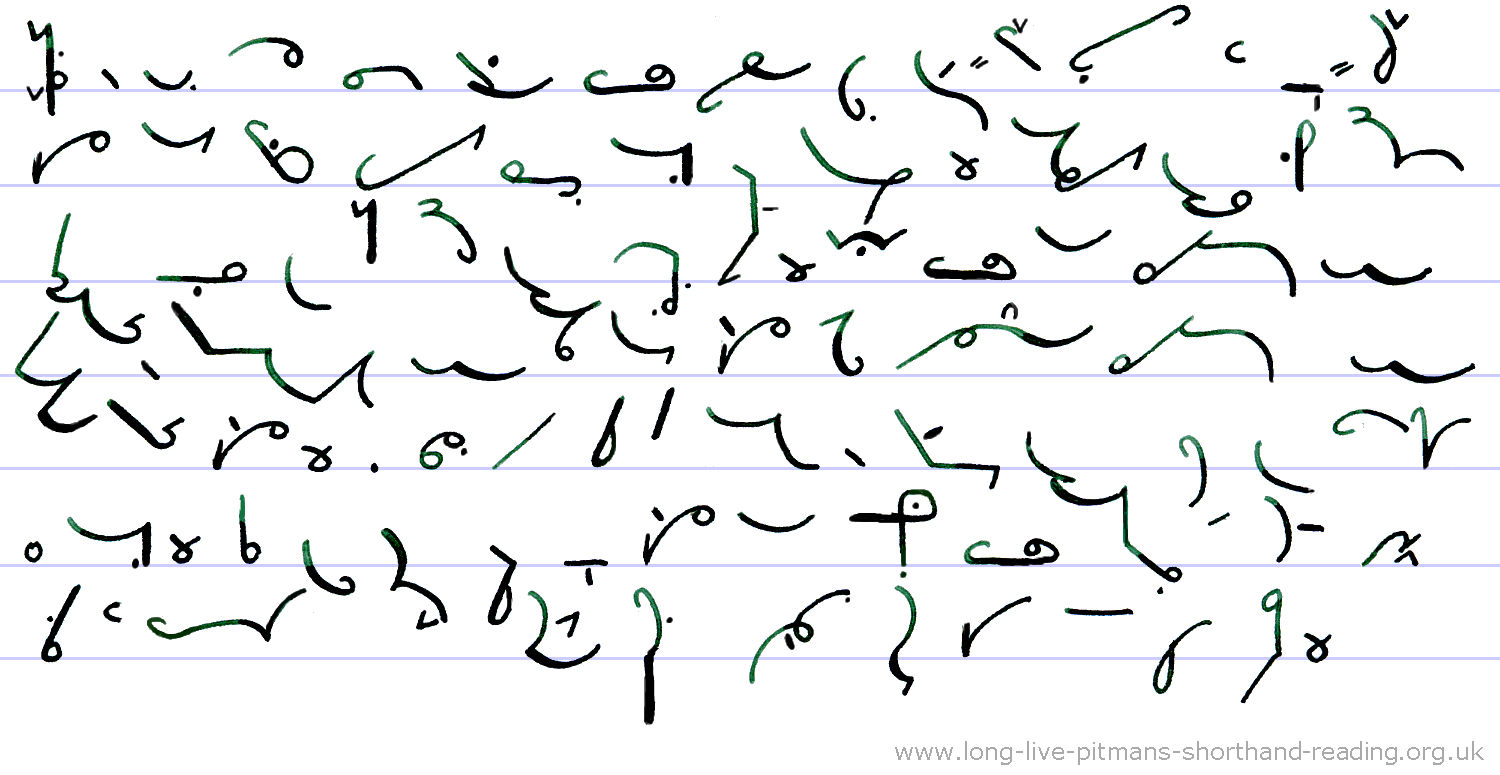
I decided to knit myself some "painting gloves" using thin four-ply
yarn, with good-sized holes in the places where the skin needed to touch
the pencil. In this way the fingers stayed warm, which would not have
been the case if I had worn fingerless mittens. I made the gloves in
circular knitting, changing to back-and-forth knitting for the holes,
and then resuming circular knitting above the holes. The slits are just
large enough to poke the fingertips through if more control is needed.
It is even easier to just cut holes in existing gloves and sew round the
edges with normal sewing thread, loosely so that the hole can still
stretch.

Skin can contact the pen or screen while remaining inside, or poke
fingertips through
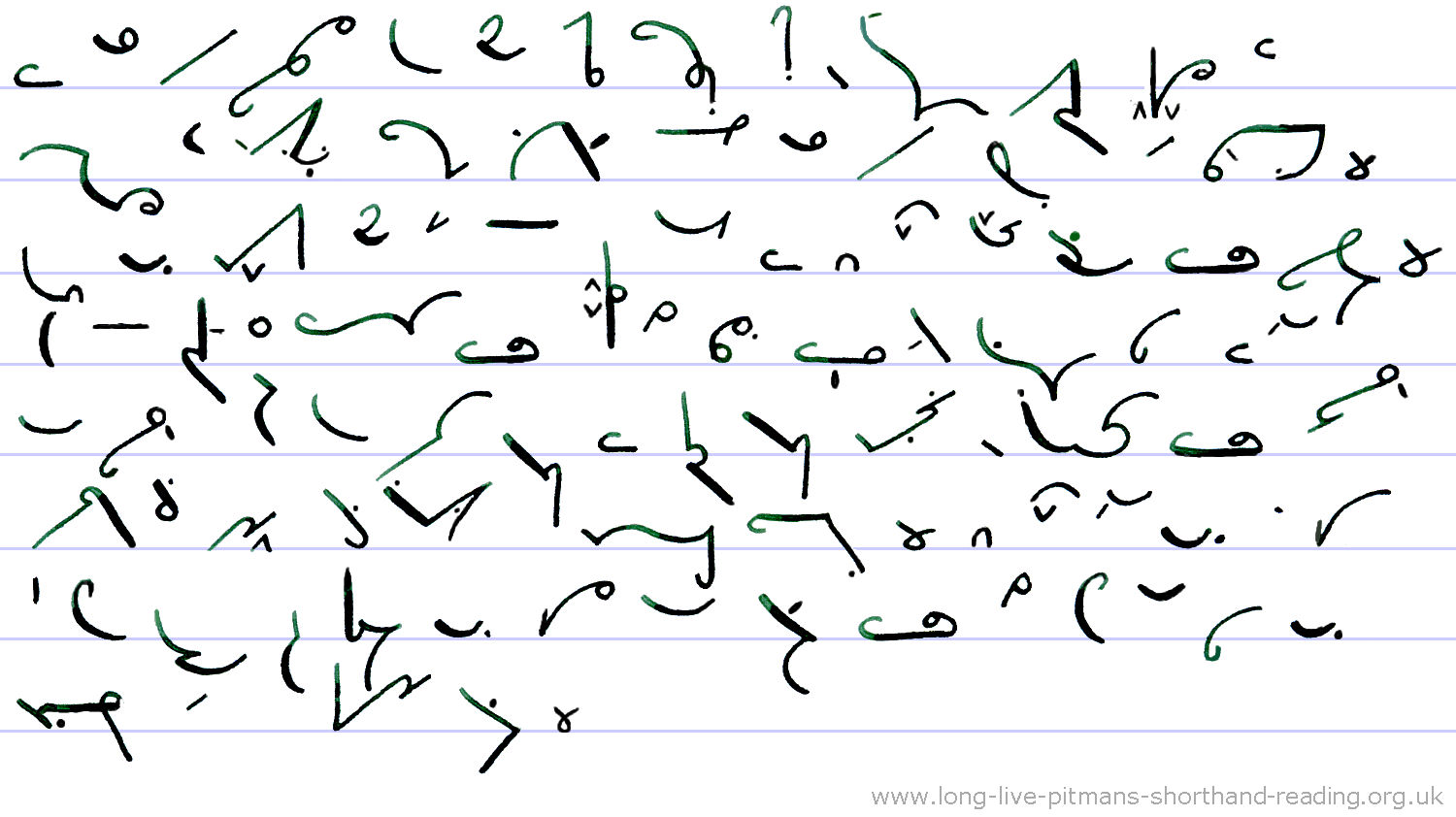
Cold hands are useless for shorthand, and it is frustrating trying to
form readable outlines with movements that originate from the elbow,
because the hands are stiff and sluggish. If you need to write shorthand
on the go, outside in the cold, you might find the painting gloves
useful. They can double as normal gloves, as the slits close up fairly
well when not in use, although for really bitter cold it would be better
to revert to conventional gloves and use rubber bands round the pen
barrel to maintain grip. You might not need a hole on every finger, but
they definitely need holes in both gloves, as the other hand will need
to grasp and turn the page.
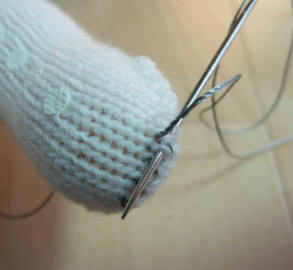

Shop-bought cheap one-size gloves with the thread sewn in. One metre
of the correct conductive thread will do 3 fingertips generously, as in picture, or 6 more sparsely. This
is soft silky grey thread that sews easily, and splits into plies for
easier tying off. Gloves do not have to be knit material, a few
stitches inside and out on any fabric will suffice.
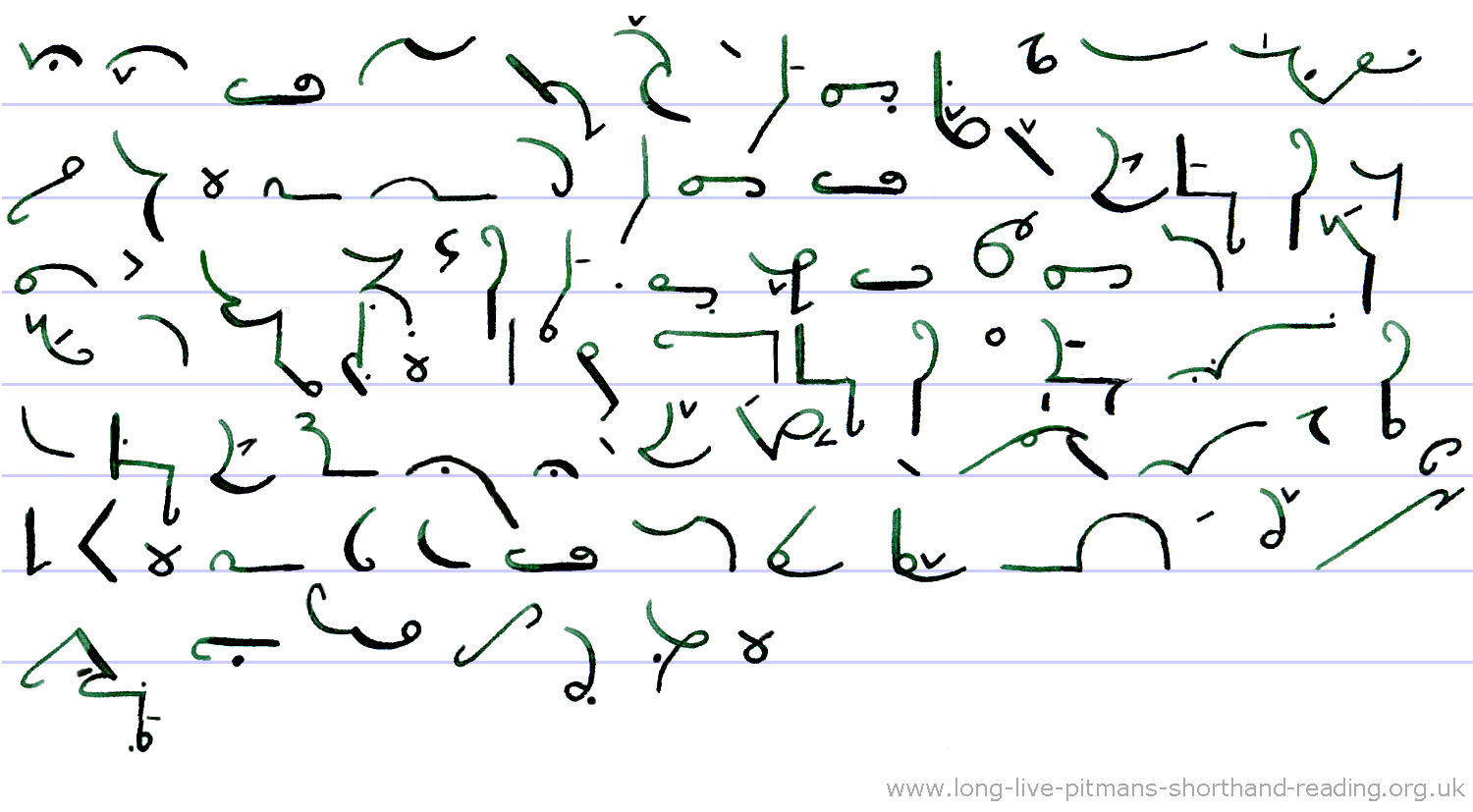
I made my gloves long before the arrival of touchscreen devices and that
is another unforeseen use for them. You can make your own touchscreen
gloves by sewing conductive thread into some of the fingertips, ensuring
that the thread touches the skin inside the glove as well as the screen
on your Ipod*, Iphone or tablet. It has to
be the correct conductive thread, as so-called*
"metallic* threads" for
decorative* sewing work may
be made of shiny polyester to resemble metal, and that will not do the
job. You can then have gloves in your chosen design, colour and size,
rather than the ubiquitous grey offerings one sees for sale.
* "Ipod" and "Ipad" Always insert the second
vowel, to differentiate
* "so-called" Note that "called" on
its own is a short form
* "metallic" Ensure the K is long
and clear, as "metal" could also make sence, helpful also to insert the
last vowel
* Make the hook on the Kay very clear, so that it does not look like
"conductive"

Icy fingers, but not mine
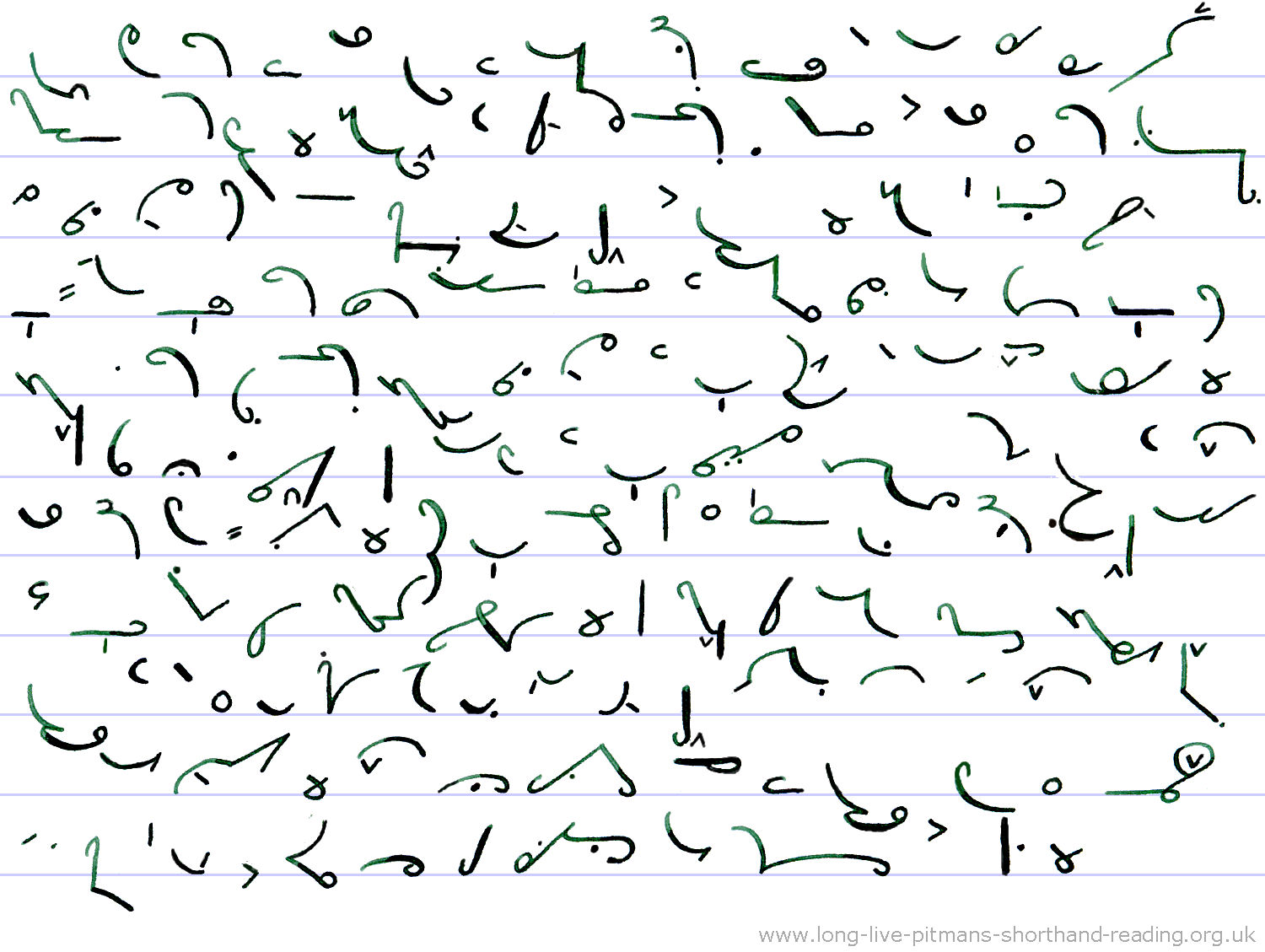
If you suffer from cold hands even when indoors, wearing gloves of any
sort is not really practical or comfortable. I have found that just
covering the backs of the hands is very effective, as the heat loss
there can trigger the shutting down of the fingertips. I have on
occasion used cut-off cuffs from summer ankle socks, with slits for the
thumb to go through, to provide a very thin covering to prevent heat
loss, with no sewing of any kind necessary. This made a huge difference
in comfort, with no hindrance to movement, or the feeling that my hands
were over-wrapped. There was no expense at all, as sock feet wear out
anyway, with the cuff part still perfectly usable.
It provided just enough protection to persuade the fingers that all is
under control and they need not shut down and leave me and my typing in
the lurch. My main weapon against cold fingers, however, is exercise and
a trip on foot to the shops improves general circulation for the
remainder of the day.
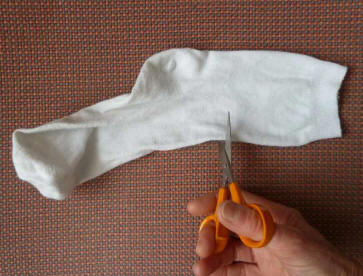

Crunch time for the old socks: Cut-off cuffs from jumpers, or any rectangle of suitable fabric sewn
into a tube, with hole left for thumb.
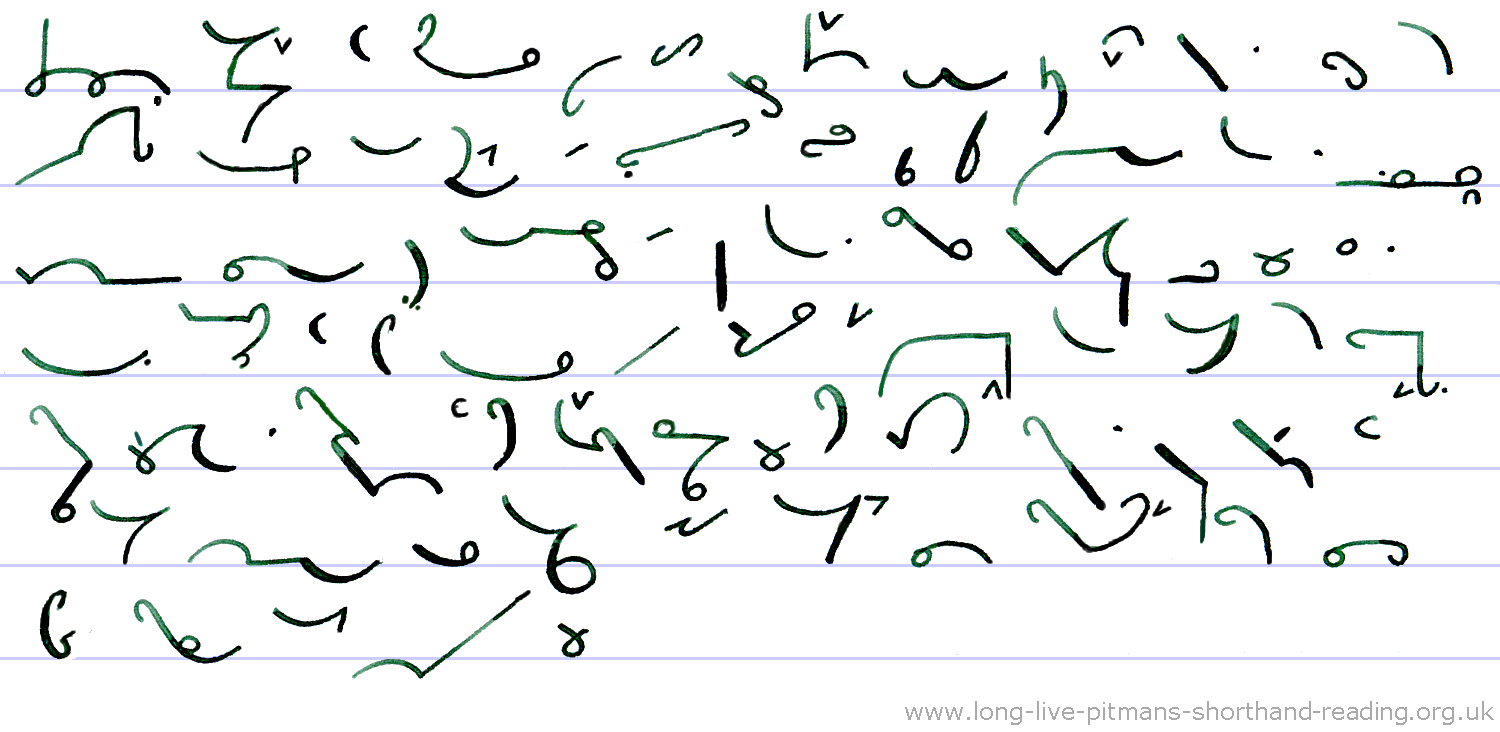
It seems to me* unlikely that shorthanders* will want to spend time
knitting, but there might be a friend or relative interested in sewing
and yarn crafts who is just looking for an excuse to make something
easy, inexpensive and different for a "surprise" birthday gift. As a
knitter, I can assure you that other knitters are always on the lookout
for unusual or creative projects to solve a problem with their fibre
skills. They are also probably a bit bored with only making things for
themselves and would enjoy some appreciation from someone other than the
person in the mirror.
* Omission phrase "it seems (to)
me" Insert the last vowel, to distinguish from two similar phrases "it seems
important" (insert vowel in "seems") and "it is mos(t) important" (insert vowel in
"most")
* "shorthanders" The D sound is included in the doubling, so do not thicken. A
thickened N would signify a doubled Ing = ang-ger or ang-ker
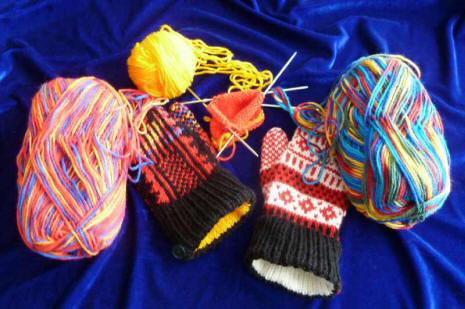
Grey not compulsory
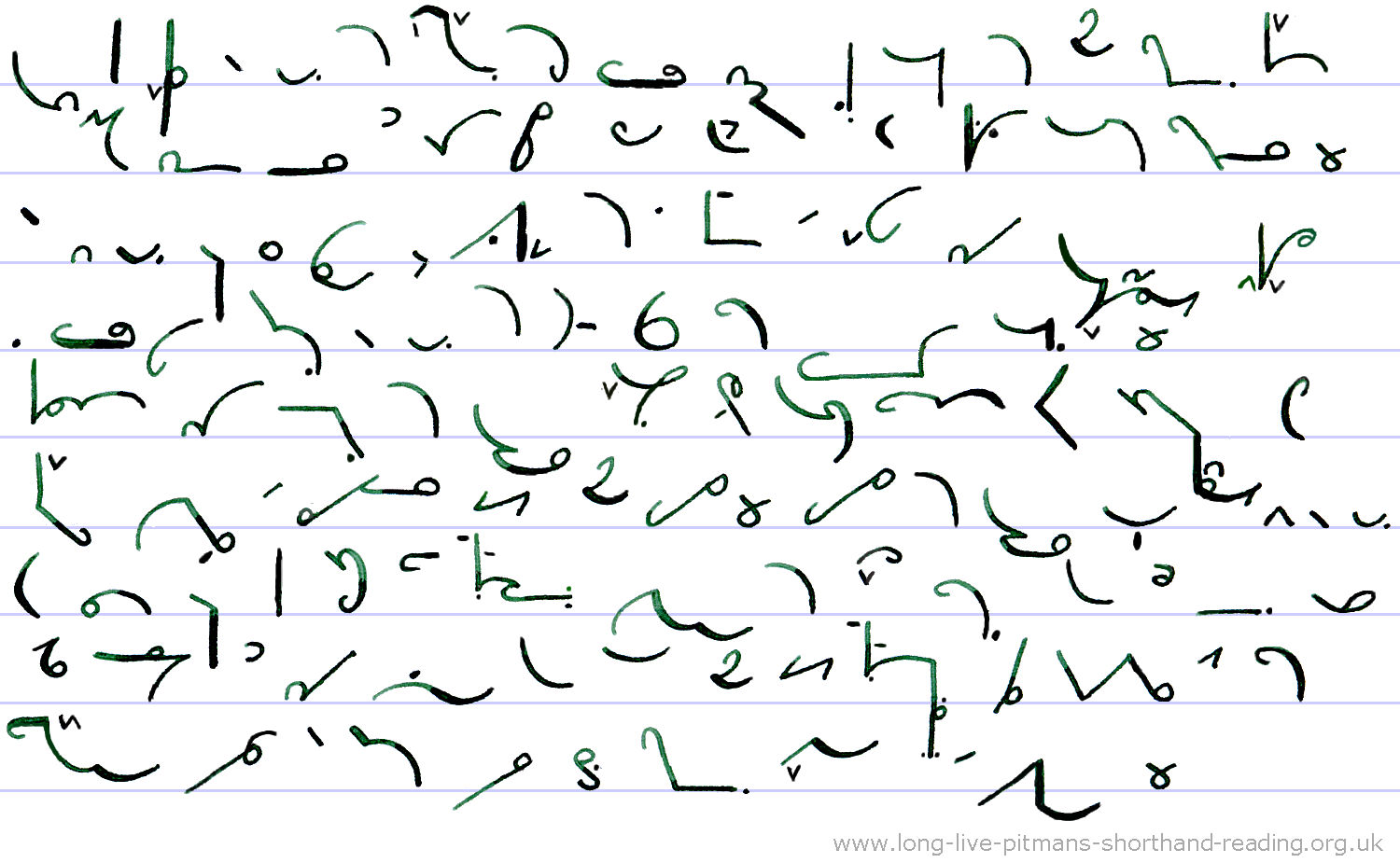
If you do decide to knit or modify your own gloves, you would be eating
into your shorthand practising time, and I think you can guess what I
will suggest in order to* avoid that delay in your progress. All you need
to do is listen to the radio or a talk, and while you are visualising
the outlines, the gloves will appear to knit or sew themselves very
quickly indeed. At the same time* you will keep your fingers nicely
supple for their more important job of producing the other type of loops
and circles Ė shorthand ones. Once your fingers know how to knit, they
seem to do it of their own accord automatically, leaving your mind free
for what is coming next, and that is exactly what you are aiming for in
shorthand Ė automaticity, which is the purpose and the very gratifying
result of all your hours spent practising writing and reading. (940
words)
* Omission phrase "in ord(er to)"
www.ravelry.com
Online knitting community with advice, blogs and
patterns submitted by members. Get your knitting-mad friend to search
"glove patterns" and sit back and wait for the summons to a fitting
session or a request for a tracing of your hand size.
Top of page
Short Form
Non-Pairs Part 1 (29 January 2013)
The short forms being drilled are in capitals, and similar or related
words are underlined
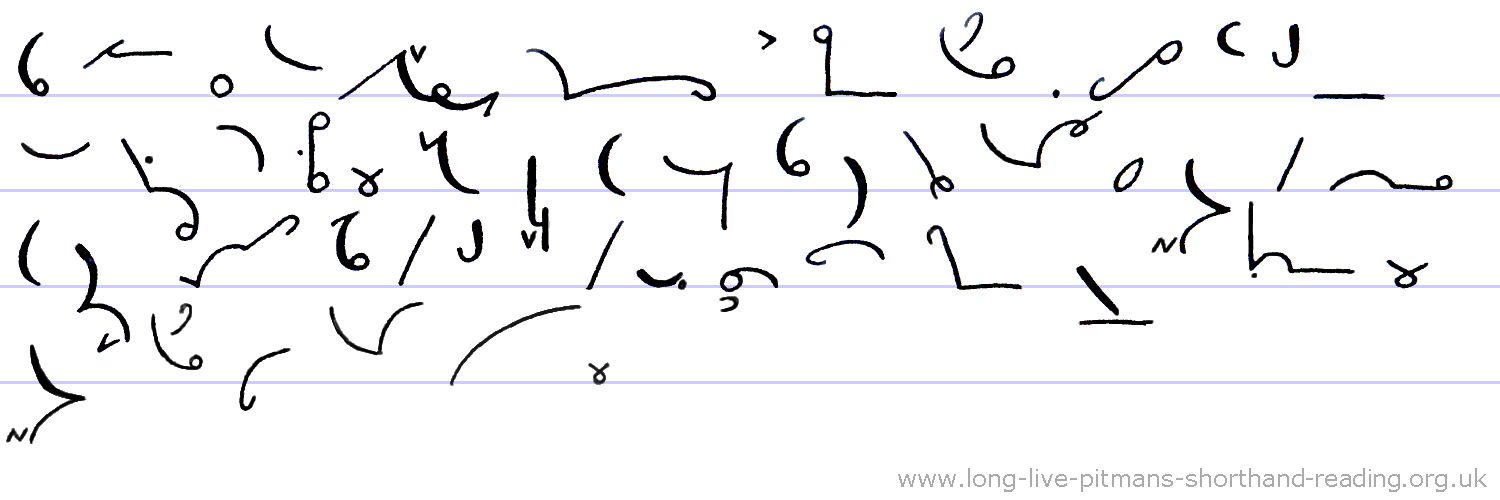
This article is for revising the remainder of the stroke short forms,
the ones that do not come in pairs or sets. I have divided them into
those whose position follows the first vowel, which makes them easier to
learn, and those which do not, which need somewhat more practice to
become automatic. Vowel short forms will follow later.
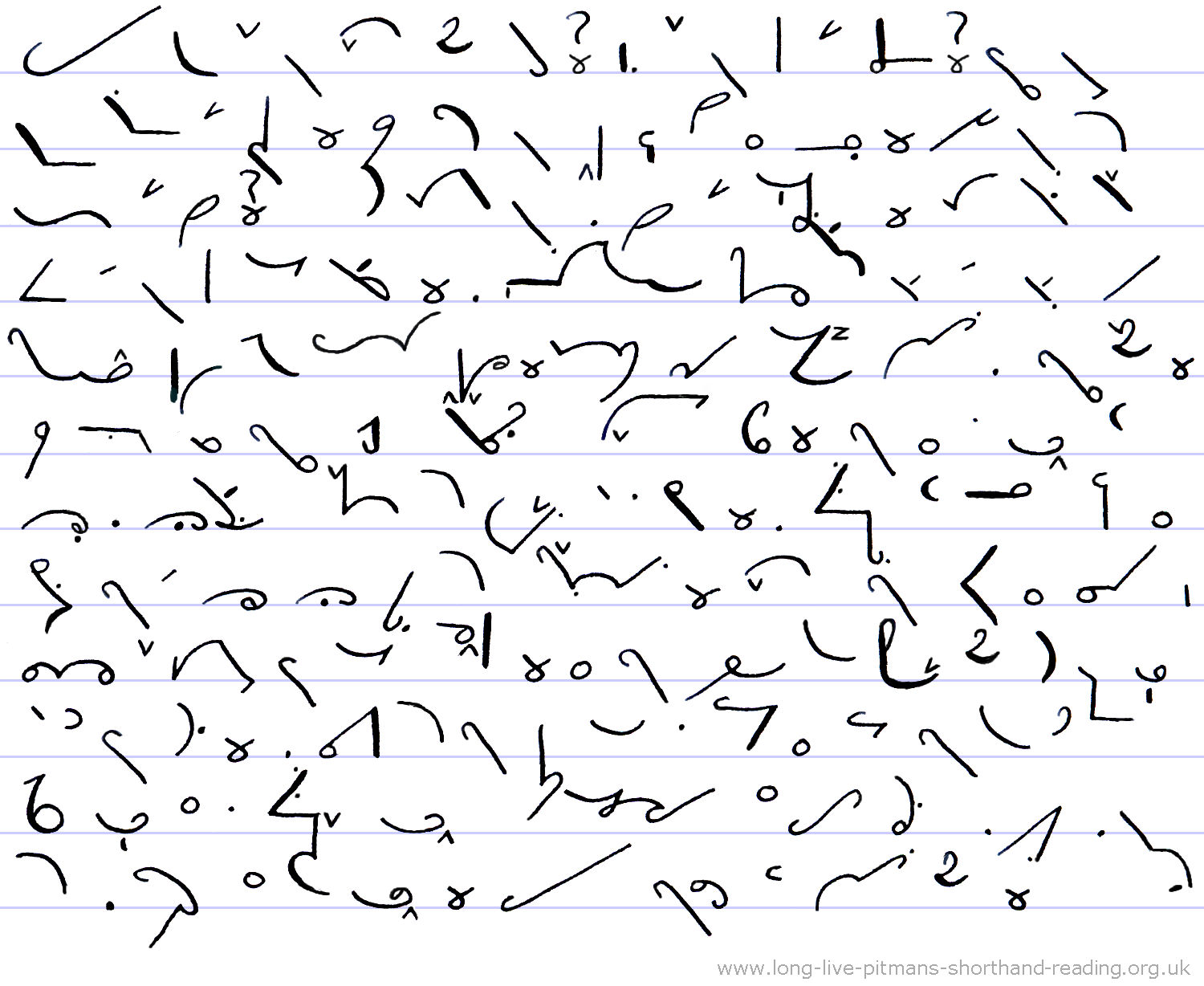
Where have I PUT my shorthand pen? Did I PUT it on the desk? Please PUT
the book back on the table. He was very PUT out when he lost his keys.
Are you PUTTING your name on the list? I will be PUTTING the list on the
noticeboard. I will pay by cheque and PUT it in the post. The golfing
terms putt and putting are pronounced differently and have normal
outlines. I am sure you are enjoying learning the PRINCIPLES of
shorthand. He kept to his PRINCIPLES and did not behave like the others.
PRINCIPLE is a noun that means a main component, item or theory of a
SUBJECT. The adjective that goes with it is spelled PRINCIPAL and means
main, chief or primary. My PRINCIPAL job is secretary, but sometimes I
help the PEOPLE in the accounts department. His PRINCIPAL reason for
studying shorthand was to take notes of what PEOPLE say. The head or
PRINCIPAL teacher in a college is called the PRINCIPAL for short, and
this is known as an adjectival noun, in the same way as one says "the
rich" "the poor" or "the French" as nouns. We are PRINCIPALLY concerned
with learning shorthand.
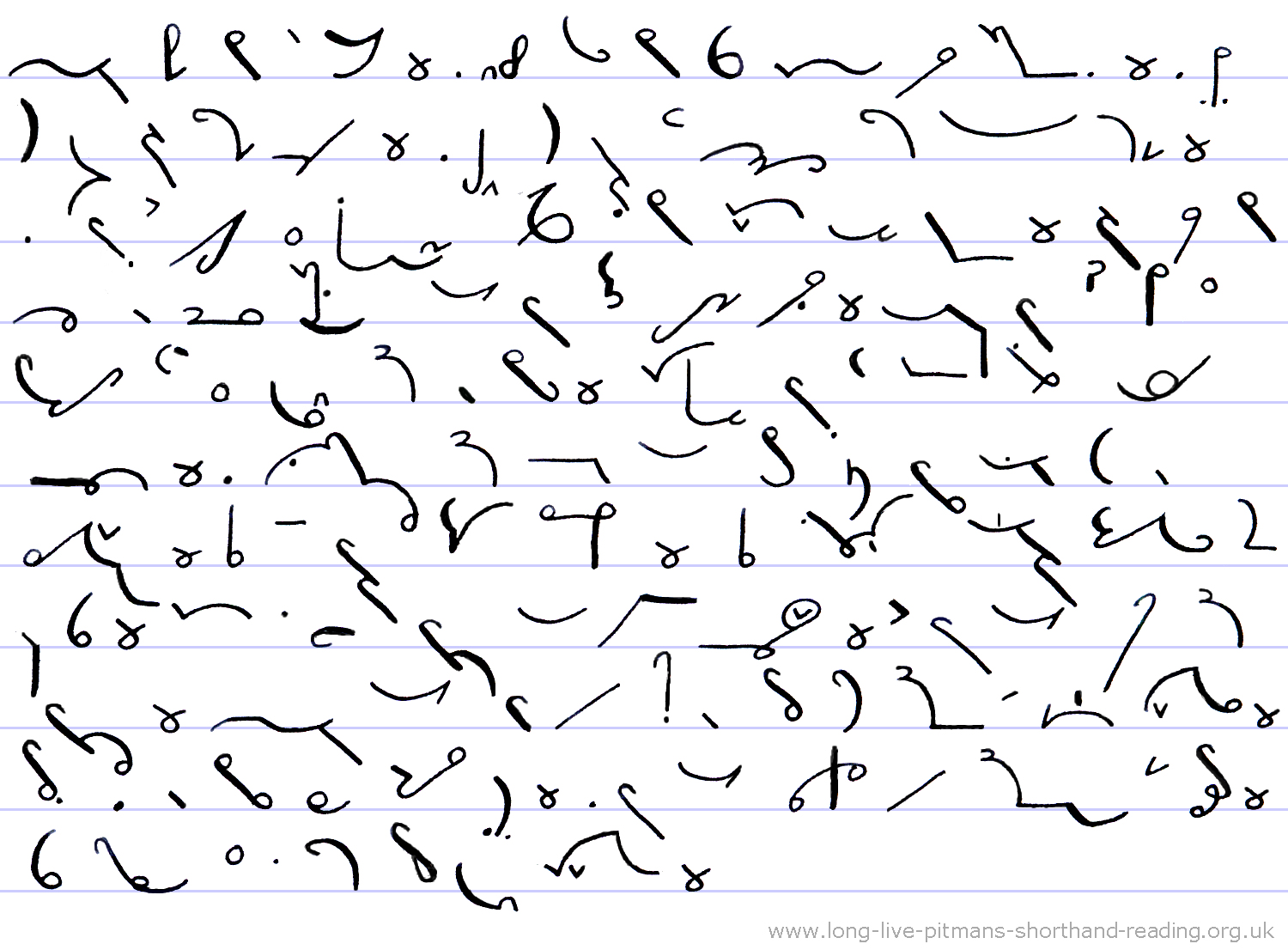
Many PEOPLE study the SUBJECT of English. The students often SUBJECT
themselves to many hours of practising. The city was full of PEOPLE from
the country. The town was peopled with men and women* from another area.
The PEOPLING of the region is continuing and this is the SUBJECT of my
new book. I BELIEVE he SUBJECTED himself to weeks of training, in the
BELIEF that he would win the race. Nobody BELIEVED what he said, as
everyone thought his views were too SUBJECTIVE. I will continue
BELIEVING that I can pass the necessary exam. The labourers were kept in
SUBJECTION but their BELIEFS enabled them to survive. It is quite
BELIEVABLE that he will succeed. It is absolutely UNBELIEVABLE that we
have been asked to do this. I am a great believer in regular exercise.
All the PEOPLE in the church were believers. Many PEOPLE in the BUILDING
are trying to BALANCE their work and home lives. BALANCING the two
SUBJECTS is not always easy. The PEOPLE in the sales department are
working on the BALANCE-sheets. This person has a very BALANCED view of
life.
* Omission phrase "men (and) women"
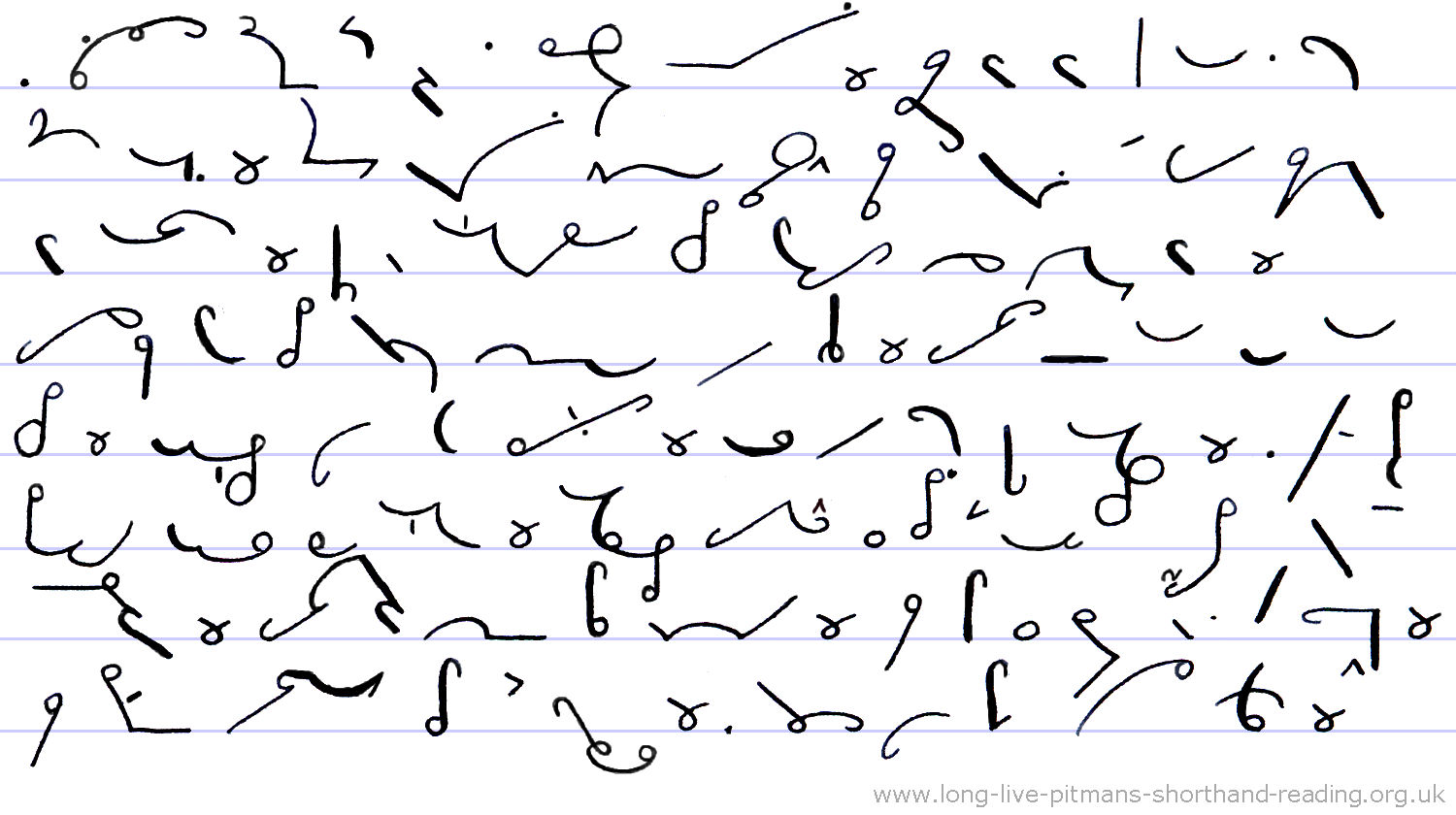
The salesman worked hard to BUILD a successful career. He has been able
to BUILD it in a very short time* indeed. Ask the builder how many houses
he has built and whether he will be BUILDING any more. Due to unforeseen
CIRCUMSTANCES everyone must leave the BUILDING. We must consider every
CIRCUMSTANCE before making our decision. We will not give in under any
CIRCUMSTANCES. Under no CIRCUMSTANCES will they surrender. Things are
very difficult in these CIRCUMSTANCES. The judge said that
circumstantial* evidence is not enough. In this instance, we found his
stance on the new situation to be quite acceptable. We will be able to
make DELIVERIES tomorrow. He DELIVERED his speech to a LARGE crowd. He
spoke regarding the DELIVERANCE of the prisoners. The postman* will
DELIVER the letters this morning.
* Omission phrase "short (t)ime"
* "circumstantial" Contraction
* "Postman" Omits the lightly
sounded T
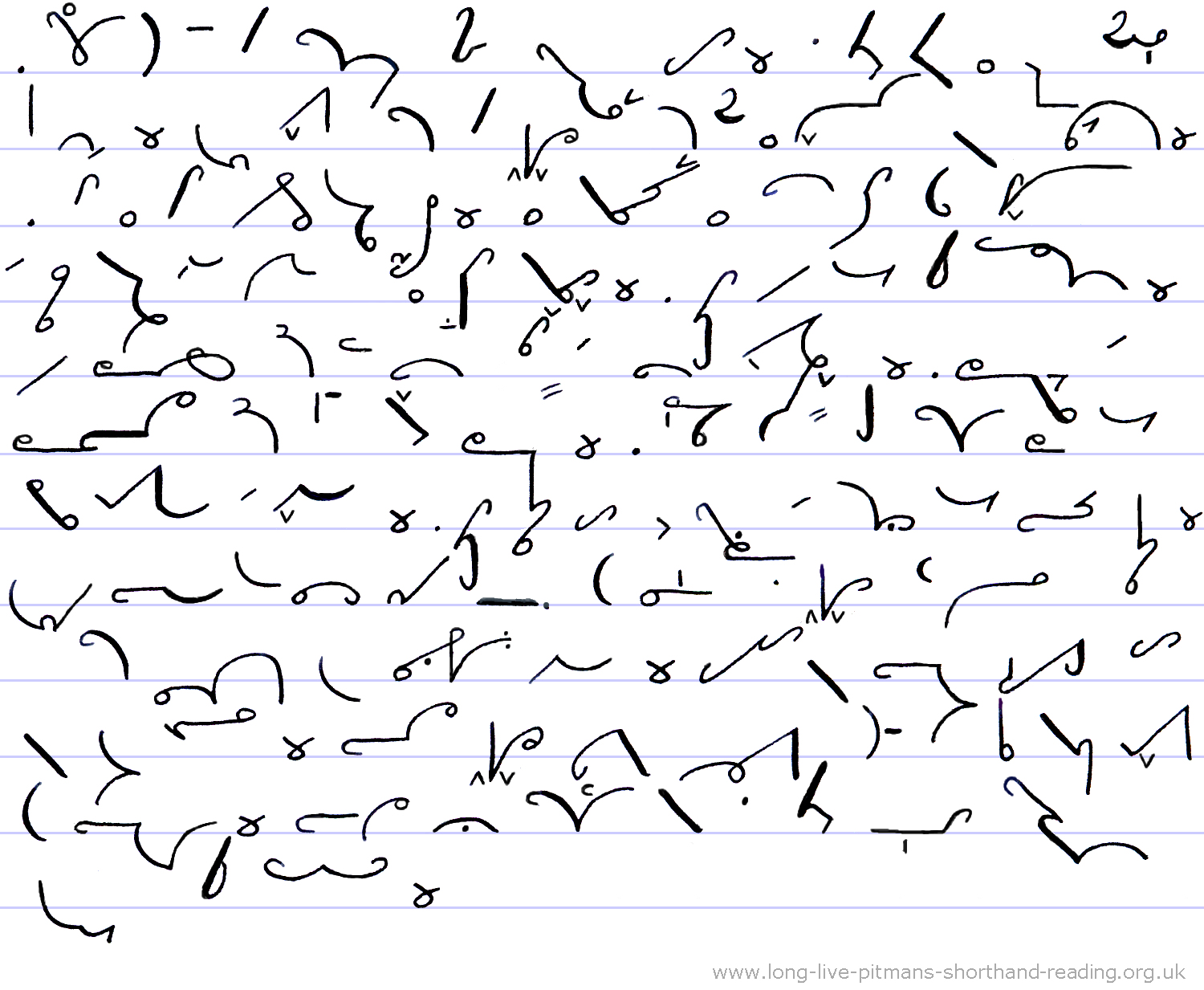
The parcel was quite LARGE, very much LARGER than the previous one. A
LARGE part of the* job is to take shorthand notes at meetings. If you
write very LARGE outlines your shorthand is likely to be slower. The
CHILD is LARGELY responsible for this situation. His behaviour is more CHILDish than CHILDlike*, and he has obviously not left his CHILDhood
behind. The children are in the LARGEST classroom. Our SCHOOLmasters
were called Mr Childs* and Mr Rothschild*. The SCHOOLboys and SCHOOLgirls
were taught by the SCHOOLteachers. The scholars had been very well*
SCHOOLED in the SUBJECTS of reading and writing. The children went to
the pre-SCHOOL and remained in the CARE of the teachers. If you are
CARING for someone, you are giving them succour, an outline that looks
very similar if hastily written. We want to be CAREful but we do not
want to be full of CARES. CAREless outlines will be misread so it is
better to write them CAREfully. CARElessness may very well* be a LARGE
part of the* current problem, if not the LARGEST in our opinion.
* Omission phrase "large part (of)
the" Omits the F/V hook for "of" to avoid looking like "large number of
the"
* "childlike" The dictionary outline can only be written somewhat
squashed, write disjoined if preferred
* "Childs" Short forms
are not used for names, except for Child, Gold and Short, in which case
they must be vocalised
* Omission phrase "very (w)ell"
although you could insert the semicircle W sign if necessary
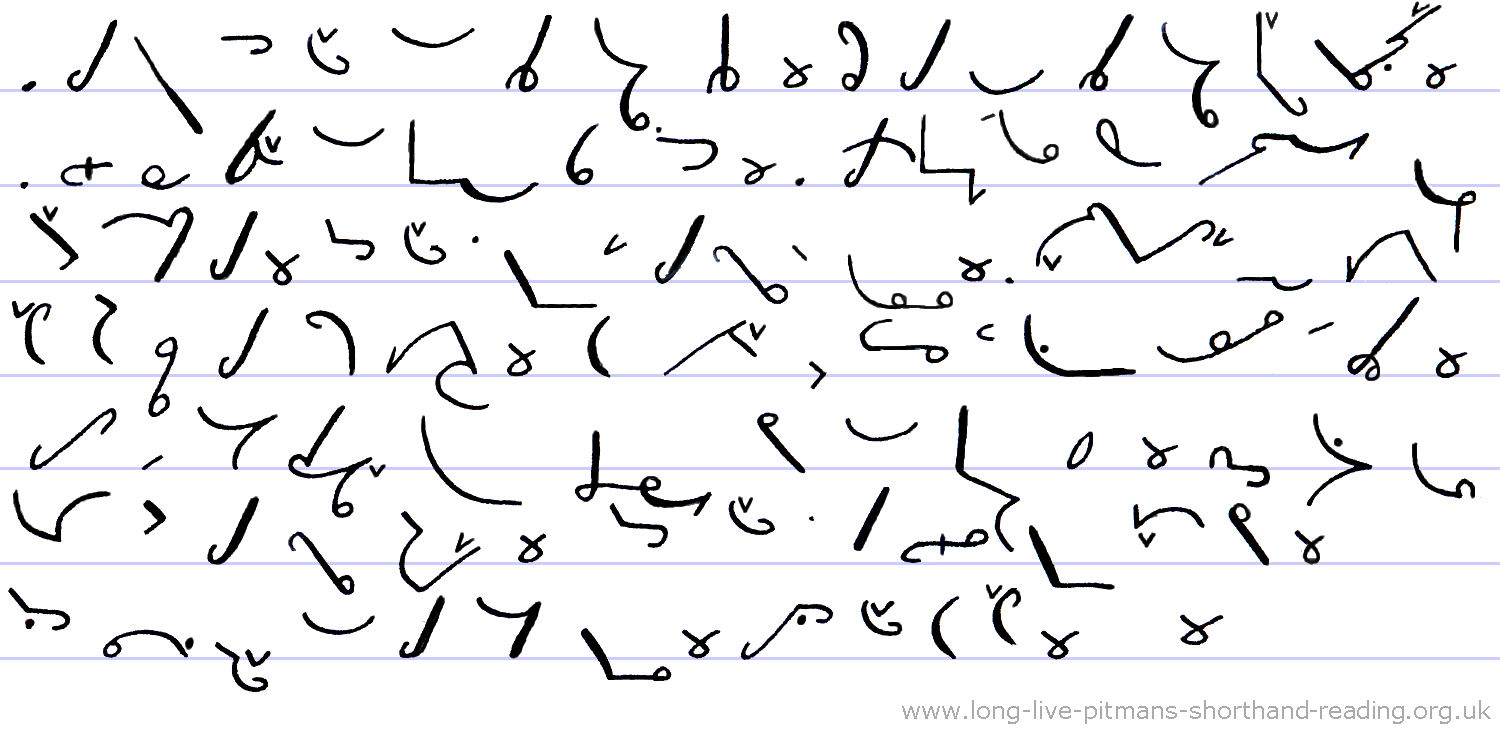
The GENERAL public CANNOT find any JUSTIFICATION for this decision.
There is generally no JUSTIFICATION for this type of behaviour. The
court is not justified in taking this action. The GENERAL Manager
contacted the office staff regarding the visit by the Major GENERAL*. I
CANNOT find a book on the GENERAL PRINCIPLES of physics. The librarian
could not help either, although he is GENERALLY very helpful. They
replied to the questions* with vague answers and GENERALISATIONS. One
should only generalise after discussing the SUBJECT in depth FIRST. You
CANNOT fail if you follow all the GENERAL PRINCIPLES of theory. I CANNOT
find a LARGE course book on my SUBJECT. I canít seem to find any GENERAL
knowledge books. We canít find them either.
* "Major General" Advisable not to
use an intersected M for "Major" here, as that would make it the same as
"general manager"
* "questions" Optional contraction
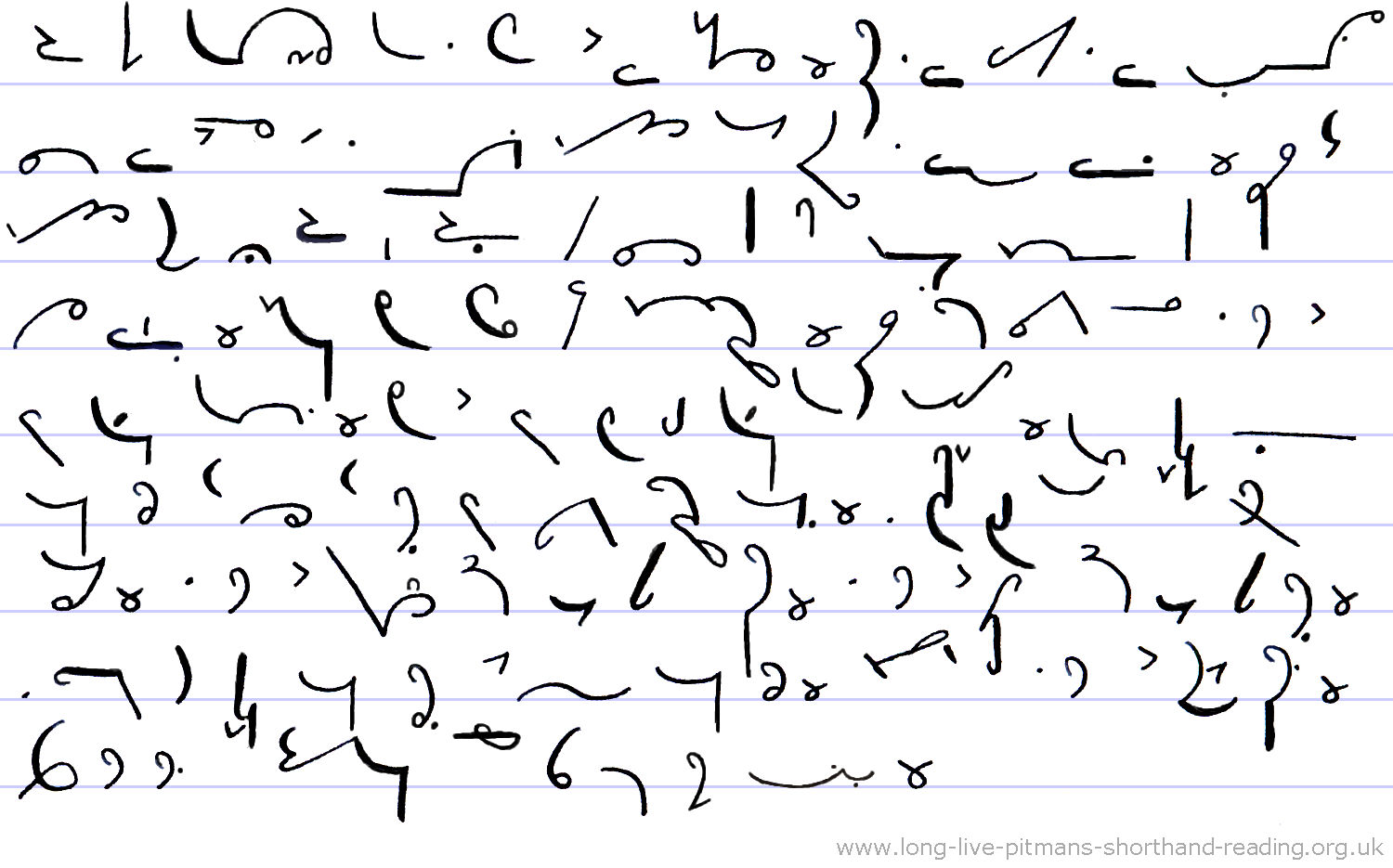
I called at the valuers for a VALUATION of the GOLD items. There was a
GOLD watch, a GOLD necklace, some GOLD coins and a gilded ornament in
the shape of a golden eagle. He said that the ornament was not made of
GOLD but of clay, which someone had TRIED to gild to make it less
ugly.
I have had SEVERAL VALUATIONS with which I am VERY pleased. He was VERY
happy BECAUSE a THIRD of the PEOPLE voted for him. SEVERAL of the PEOPLE
however did not vote for anyone. If you divide the cake into THIRDS,
that means that three PEOPLE will be VERY pleased indeed. The driver did
not have any THIRD party insurance*. A THIRD of the population were under
the age of thirty. A THIRD of the children were under the age of
three.
The group was divided into threes and the money into THIRDS. I used a
THIRD of the sewing thread. This is the THIRD threat that we have had
against us this year through the Internet.
* "insurance" Can also be written
as an intersection Stroke Ns
* "population" Keep the Shun hook
large and clear, as "populace" is similar in outline and meaning
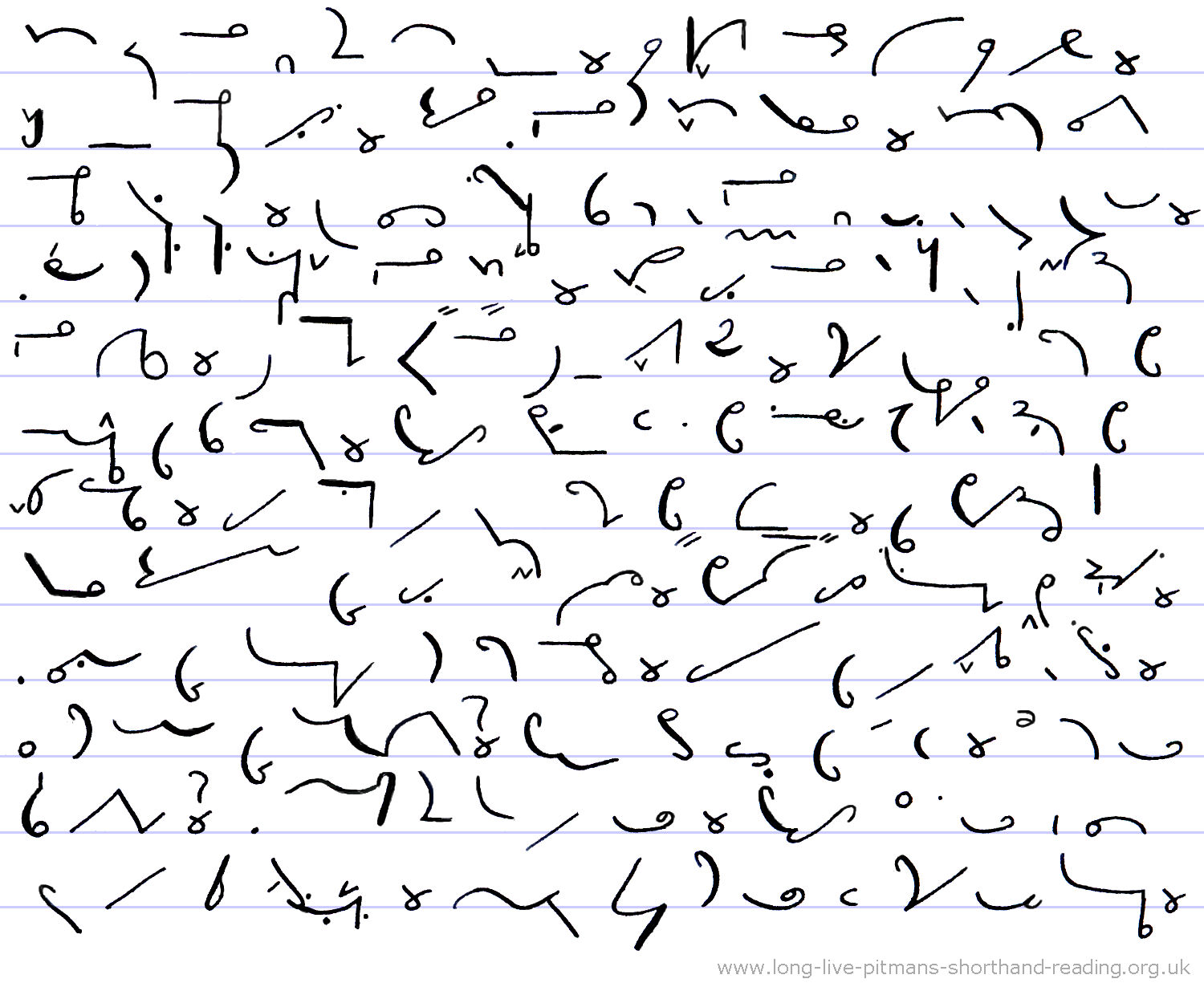
I am here BECAUSE you asked me to come. He was delighted BECAUSE of the
letter he received. I did not come BECAUSE it was raining. That was the
cause of my absence. I am VERY happy BECAUSE it is payday today.
If someone abbreviates this word to Ďcos, you need to PUT the vowel in.
The song was entitled "Cos Of You." I lost weight BECAUSE all I had to eat
were Kos lettuces. She got the job BECAUSE she could write shorthand.
There are visitors from SOUTHERN counties WITHIN this group. Everyone
spoke with a SOUTHERN accent and they all wore SOUTHERN style clothes.
We get our power from the SOUTHERN Electric Company. These southerners
had bags that were not WITHIN the weight limits. Southerly winds
affected the south of the country. The heating WITHIN the factory was
very expensive. We are WITHIN our rights to complain. Is there anything
WITHIN the envelope? Everything has been cleaned WITHIN and WITHOUT.
What is your OPINION on this report? The manager asked for our OPINIONS.
Everyone has an OPINION but some PEOPLE are just opinionated. Many
PEOPLE change their minds when there are new facts.
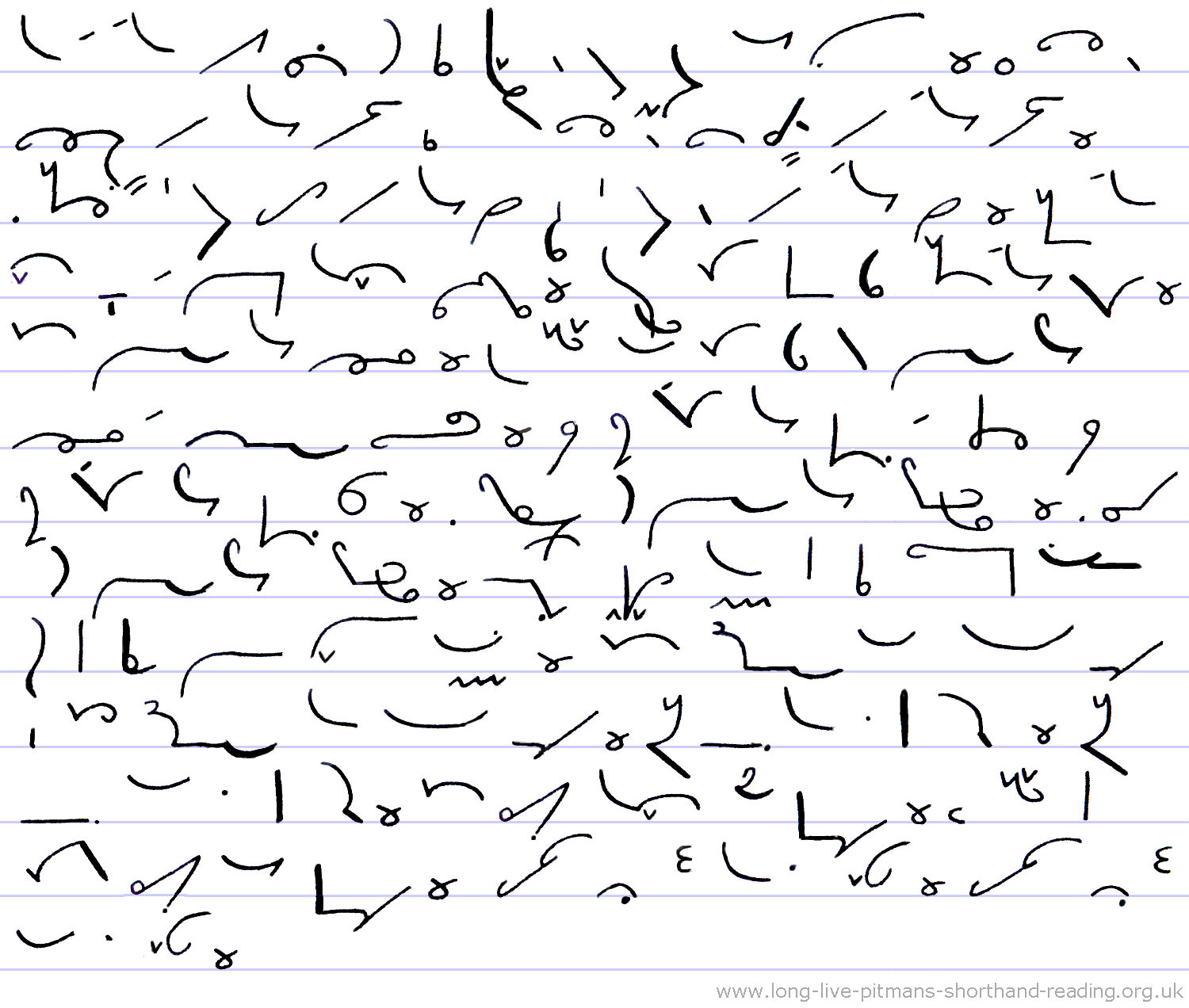
FOR and off are the same so it is advisable to put the vowel in the
latter. His remarks to Mr Smith are FOR the record*, but his remarks to
Mr Jones are off the record*. The items on page one are FOR the list,
but those on page two are off the list. I took off my coat and looked
FOR my slippers. FOR your convenience, I will take this item off the
bill. I am looking FOR the mistakes; if I find any, I will then be
looking over the mistakes and making corrections. He threw the ball FOR
the team and it seems he threw the ball over the team as well. The
personnel manager was looking FOR the application forms. The secretary
was looking over the application forms. Keep the outline FOR at its
correct angle so that it does not look like "in"*. I am working
in another
country but I am not working FOR another country. I shall be coming FOR
a day or two. I shall be coming in a day or two. I am searching FOR my
shorthand dictionary. When I find it, I will be searching in the
dictionary. We will meet with you FOR a while. We will meet with you in
a while.
*
"off the record" Essential to insert the vowel in "off", as this has
opposite meaning to "for the record" See
www.long-live-pitmans-shorthand.org.uk/phrasing6-misc.htm#DistinguishingPairs
* "in" Insert the vowel, even though the short
form does not have one, because there is no context when you are
describing a word in isolation, and this is also the outline for "any"
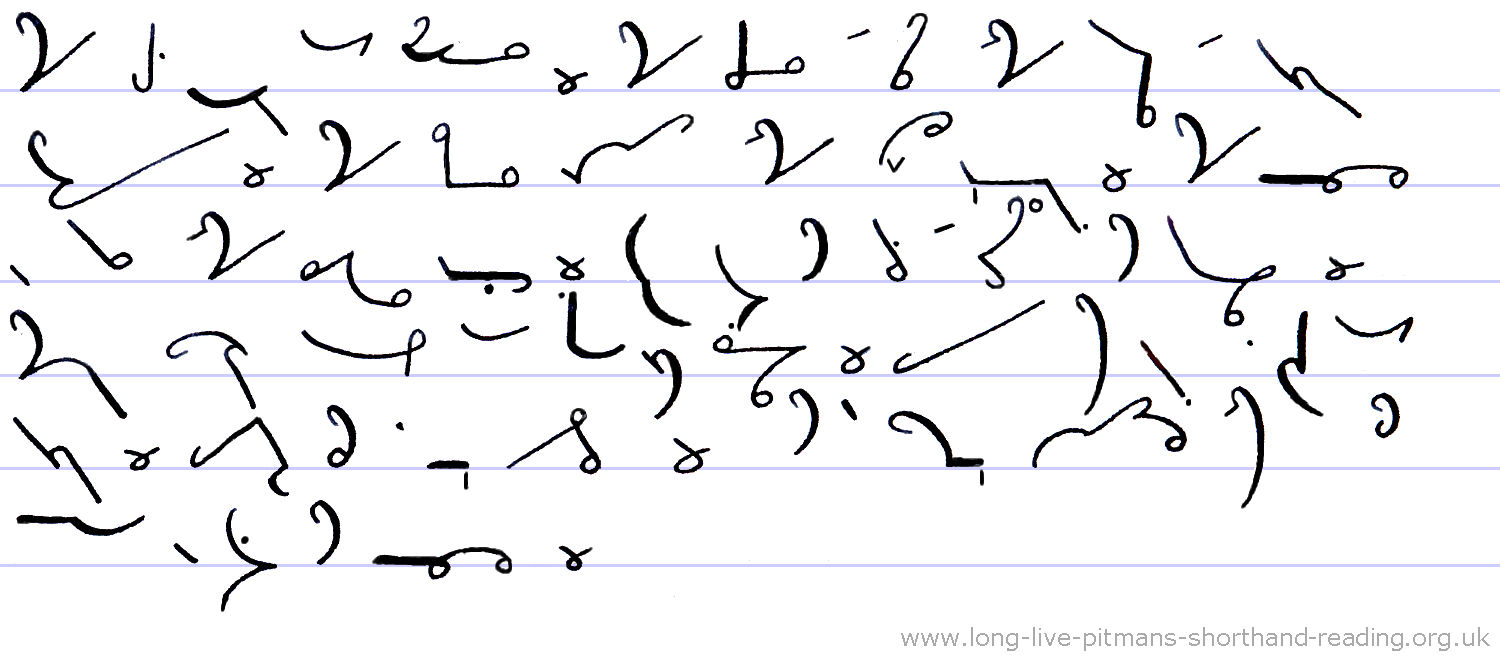
THERE are ten young people in the shorthand class. THERE are desks and
chairs and THERE are pads and paper everywhere. THERE are strokes to
learn and THERE are lines to copy. THERE are exams to pass and THERE are
certificates to gain. They have filled THEIR pens and sharpened THEIR
pencils. THERE may be more PEOPLE interested in adding to THEIR skills.
We are THEREFORE PUTTING an advertisement in the paper. We hope that*
THERE is a good response. They are all very good learners and THEREFORE
they are not going to fail THEIR exams.
* Omission phrase "we (ho)pe that"
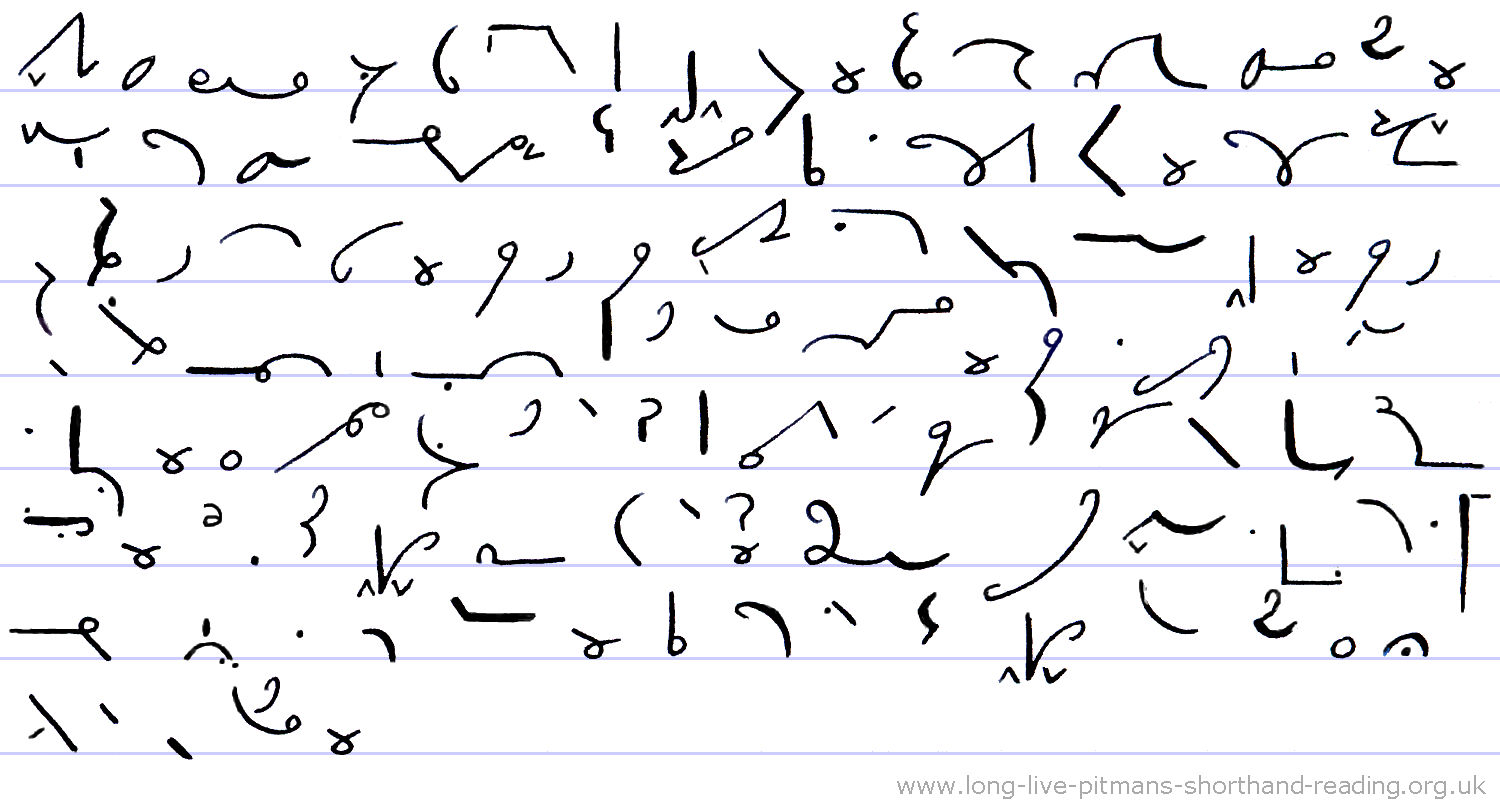
Write the FIRST sentence neatly then copy it down the page. With this
method you will have FIRSTclass shorthand. I know from FIRSTHAND
experience that he always does a FIRSTrate job*. FIRSTLY* I would like to
thank all those who WISHED me well. He WISHED he had washed the car
before going out. He WISHED to pass the exam but came SHORT in his
marks. He was a wisher but not a doer*. His results fell SHORT of what he
had hoped, and he will SHORTLY be doing the work again. What is the
shortest outline you can think of? There is nothing shorter than writing
a tick or a dot, except omitting a word altogether. It is very apt that
the outline for SHORTHAND is made up of two SHORT forms. (1696 words)
* "firs(t)rate" "firs(t)ly" These
omit the lightly sounded T
* "doer" using the short form "do"
therefore has a dot vowel, not a diphone
Top of page
Short Form
Non-Pairs Part 2 (29 January 2013)
The short forms being drilled are in capitals, and similar or related
words are underlined
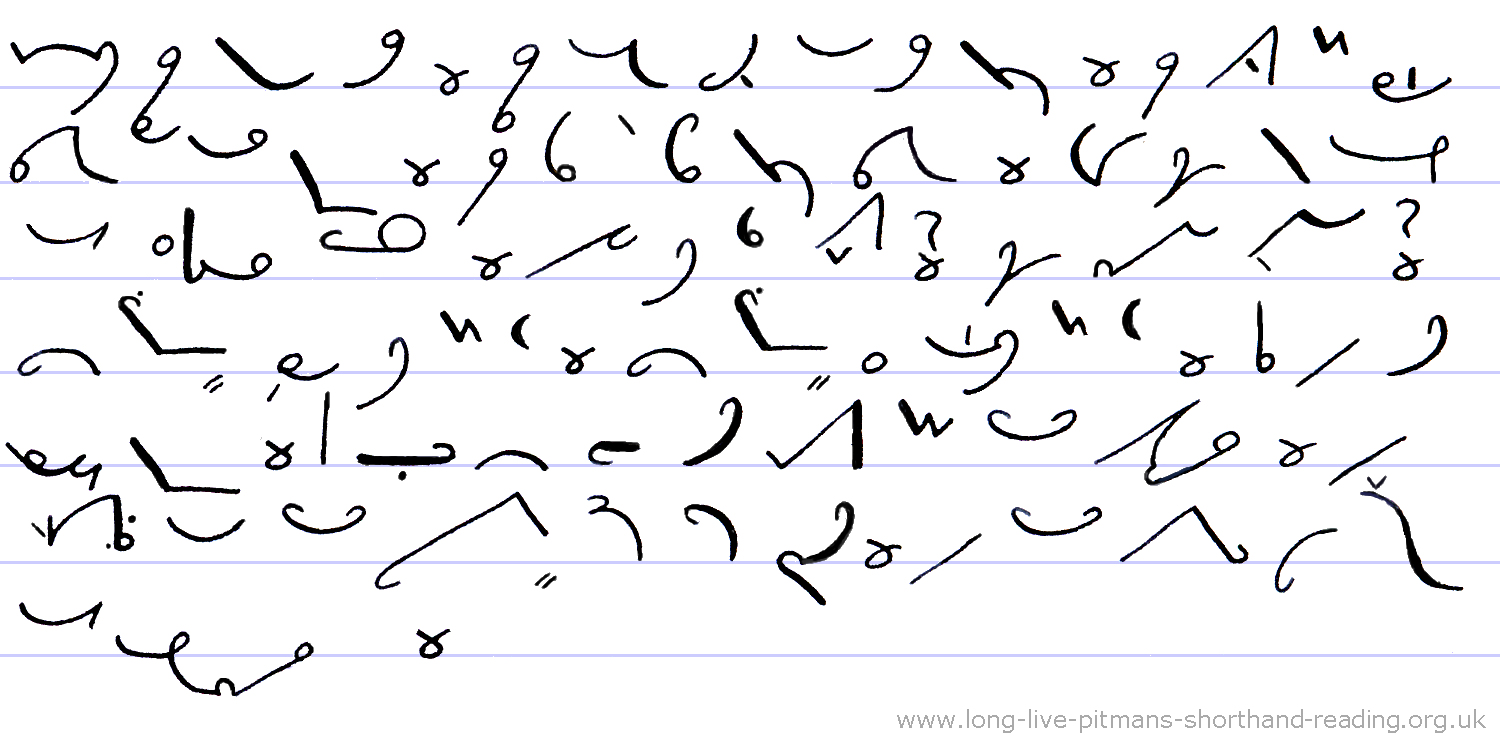
I am SURE he is not being SELFISH. He has never shown any SELFISHNESS
before. He wrote about his own self in his book. He thinks of others
before self. They will SURELY be interested in the self-defence classes.
Are you SURE that is right? SURELY you are not wrong? Mr Black is not
SURE about that. Mr Black is unSURE about that. It is OUR PLEASURE to
send you the book. It gave him great PLEASURE to read about the NORTHERN
railways. OUR holidays in NORTHERN EUROPE were very pleasurable. OUR
NORTHERN representative will arrive in the next few HOURS*.
* Omission phrase "ne(k)s(t) few
hours"
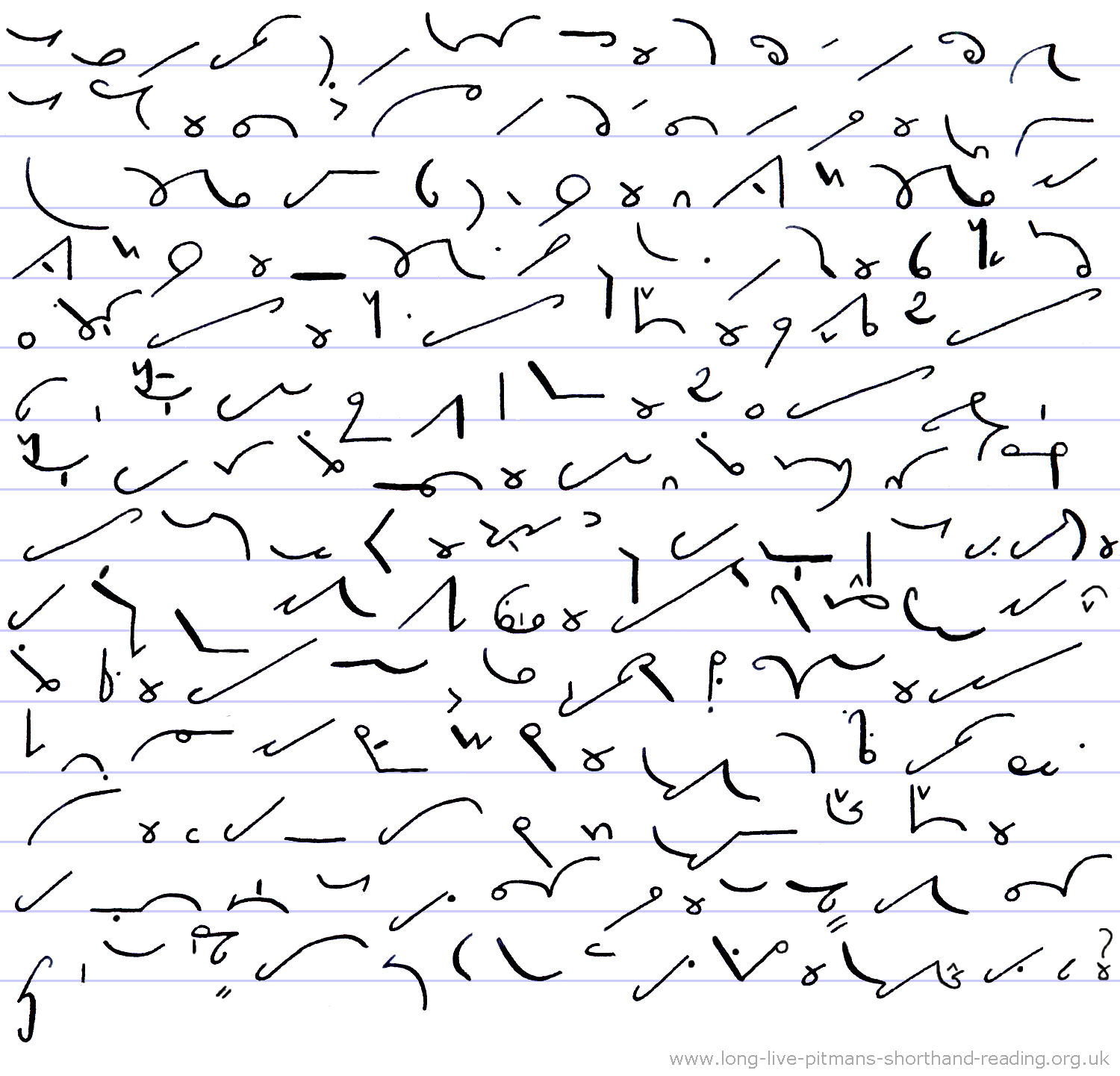
In the next HOUR we will see OUR family again. YOUR friends and OUR
friends live in the north. Some of the letters are YOURS and some are
OURS. If you look after YOURSELVES, we can then see to OURSELVES. You
wrote about YOURSELVES and we wrote about OURSELVES. Give YOURself a
rest today for an HOUR or two. This idea of YOURS is absolutely
WONDERFUL. I had a WONDERFUL time. He writes shorthand WONDERFULLY well
but I donít know WHETHER or not* he can read it back. Shorthand is
WONDERFULLY useful but I do not know WHETHER I will pass the exam.
WHETHER or not* you pass, I am SURE you will succeed WONDERFULLY in your
new job. I wondered what to do, WHETHER to go out in the wet weather. WE
bought the book and WE have read the lessons. WE are able to remember
almost everything and WE might pass the test. WE are going to the office
but WE will not be staying very long. WE were at the meeting last week*
and WE spoke about the subject. If WE have your address, WE will send
you a letter. When WE come WE may speak to you if WE can find the time.
WE came home in the wee small hours. In England WE have small children,
but in Scotland WE may hear them being called wee bairns. Have WE found
the way yet?
* Omission phrases "whether (or)
not" "las(t w)eek"
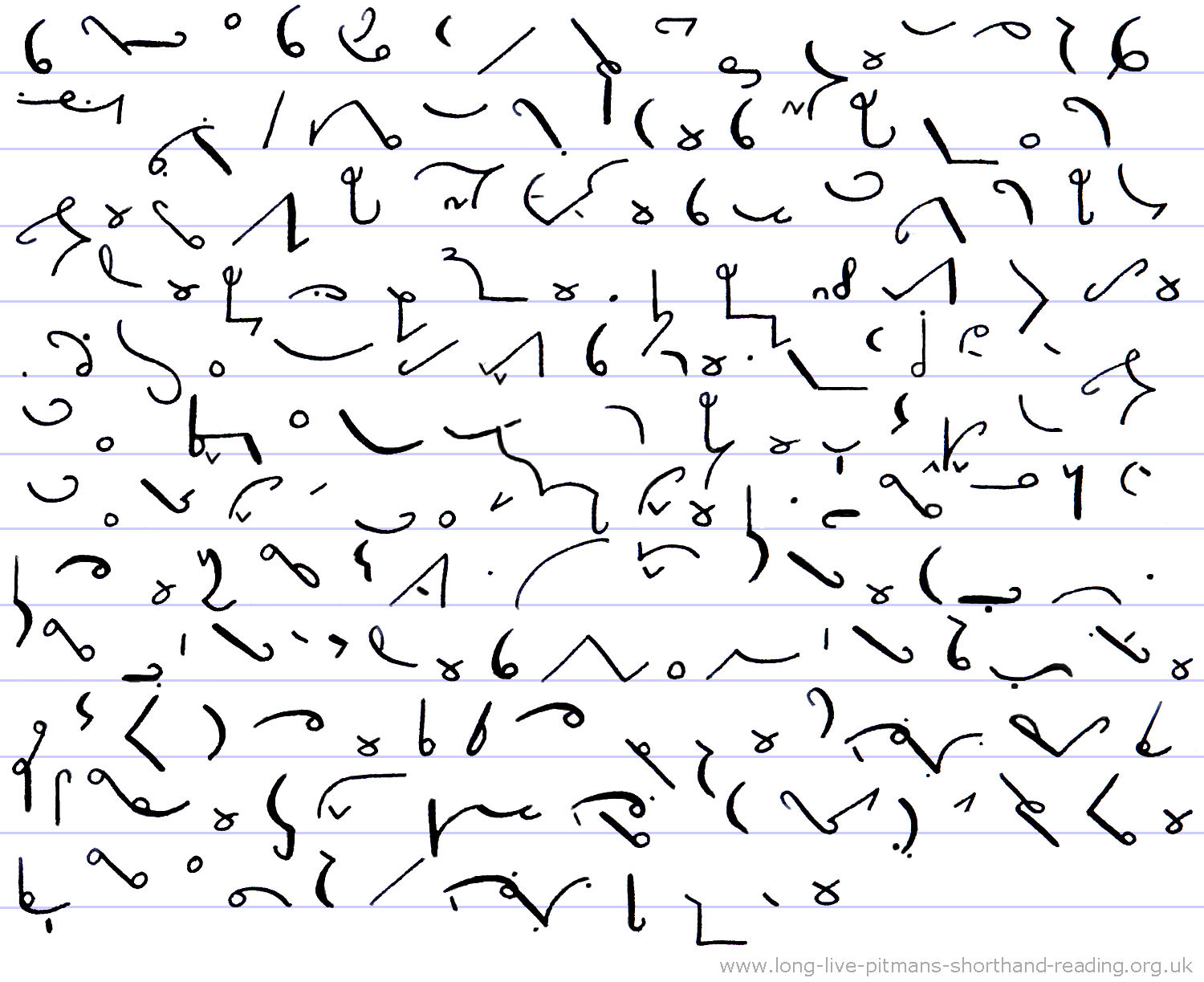
This paragraph has those short forms that are positioned according to
the second vowel. In most of them this is the accented syllable*, which
helps in remembering them. This INSTRUCTION book is very useful. Please
read the INSTRUCTION manual thoroughly. This new INFORMATION will be
very INSTRUCTIVE for the staff. Instruct the men to start work. The
teacher instructed the students to read page one. The phrase "for your
information"* is another way to write this word. A book that contains
lots* of useful INFORMATION is described as being informative or
INSTRUCTIONAL. Note that the outline for INFORMATION is above the line
and OPINION is on the line. It was a great SURPRISE because I had
thought it was IMPOSSIBLE. I was not SURPRISED that he wrote a letter on
my BEHALF. They gave him a SURPRISE gift on BEHALF of all the staff.
This report is written on BEHALF of those named above. He said that the
job was IMPOSSIBLE. It is just IMPOSSIBLE to speak to them. They are
impossibly stubborn which is not at all SURPRISING. They do not like
dealing with IMPOSSIBILITIES, they prefer the easy and the possible
jobs. It is no SURPRISE as some of them are impossibly difficult to talk
to.
* In the very early days of Pitman's Shorthand, the position of the
outline was decided according to the accented vowel, but that was later
changed to the first vowel. This is the reason some of the short forms
are positioned as they are.
* Omission phrase "for your (informa)tion"
* "lots" and "masses" Always insert
the vowel, as these are similar in outline and meaning
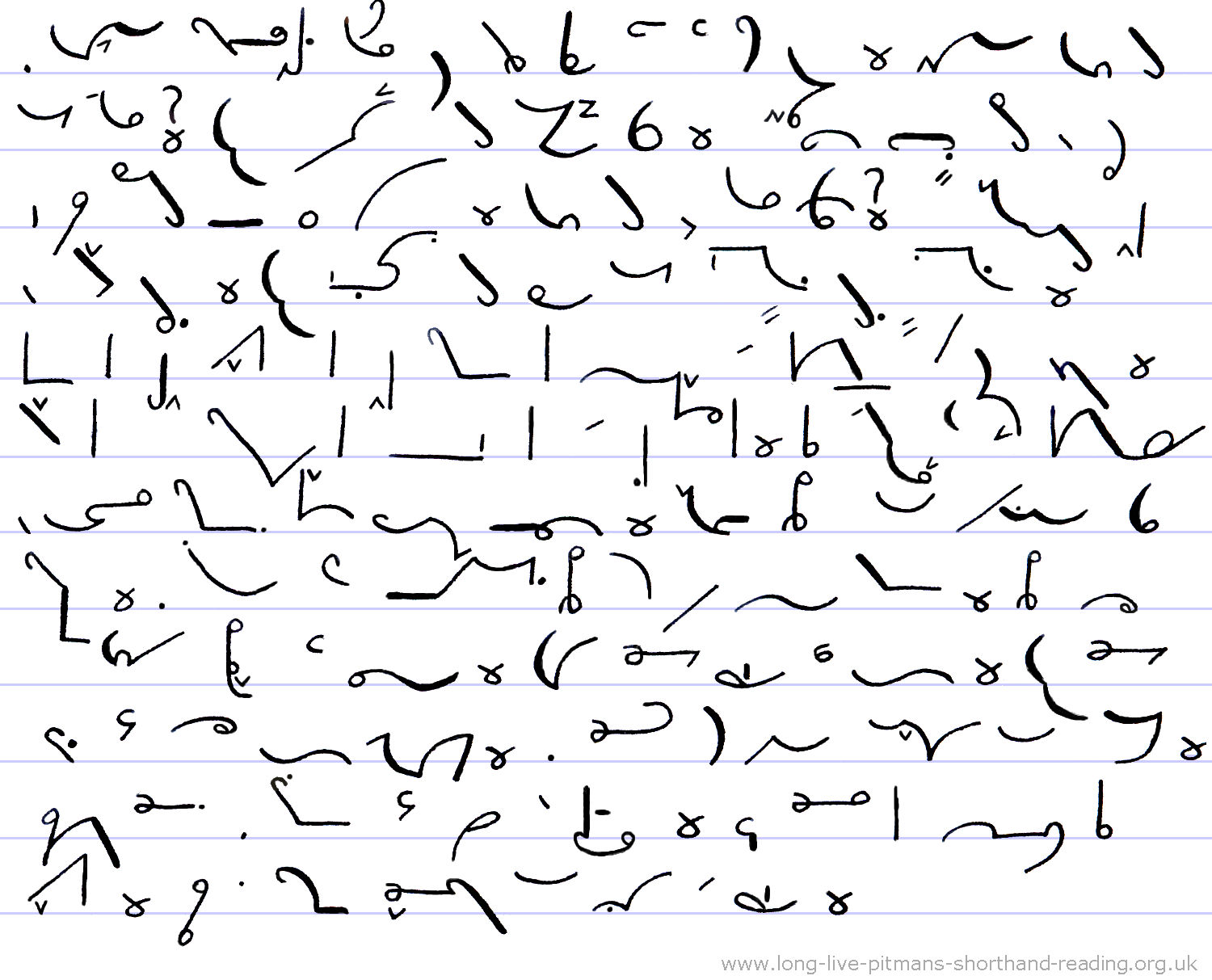
The following paragraphs contain the short forms whose position does not
accord with their vowels. How long have you BEEN in the office? They
have really BEEN enjoying themselves. Mr Green has BEEN to see us but he
has not BEEN given his letter. Have you BEEN to the office this morning?
I have not BEEN out to buy the beans. They have occasionally BEEN seen
in the Coffee Bean cafť. Take IT down, write IT out, practise IT many
times, and IT will become much easier to REMEMBER. Buy IT, prepare IT,
cook IT and eat IT. IT is obvious that IT will be necessary to increase
practising time nearer the exam. I have great SATISFACTION in
recommending this product. The company offered guaranteed SATISFACTION
or our money back. SATISFACTION means that you are satisfied with
something. They will INSCRIBE the stone with his name. They have
INSCRIBED the plate with the manís name and village. The INSCRIPTION was
written entirely in English. He will be INSCRIBING the plaque with the
list of donors. When he INSCRIBES it, make sure it is right. He is a
very good inscriber in metal and stone.
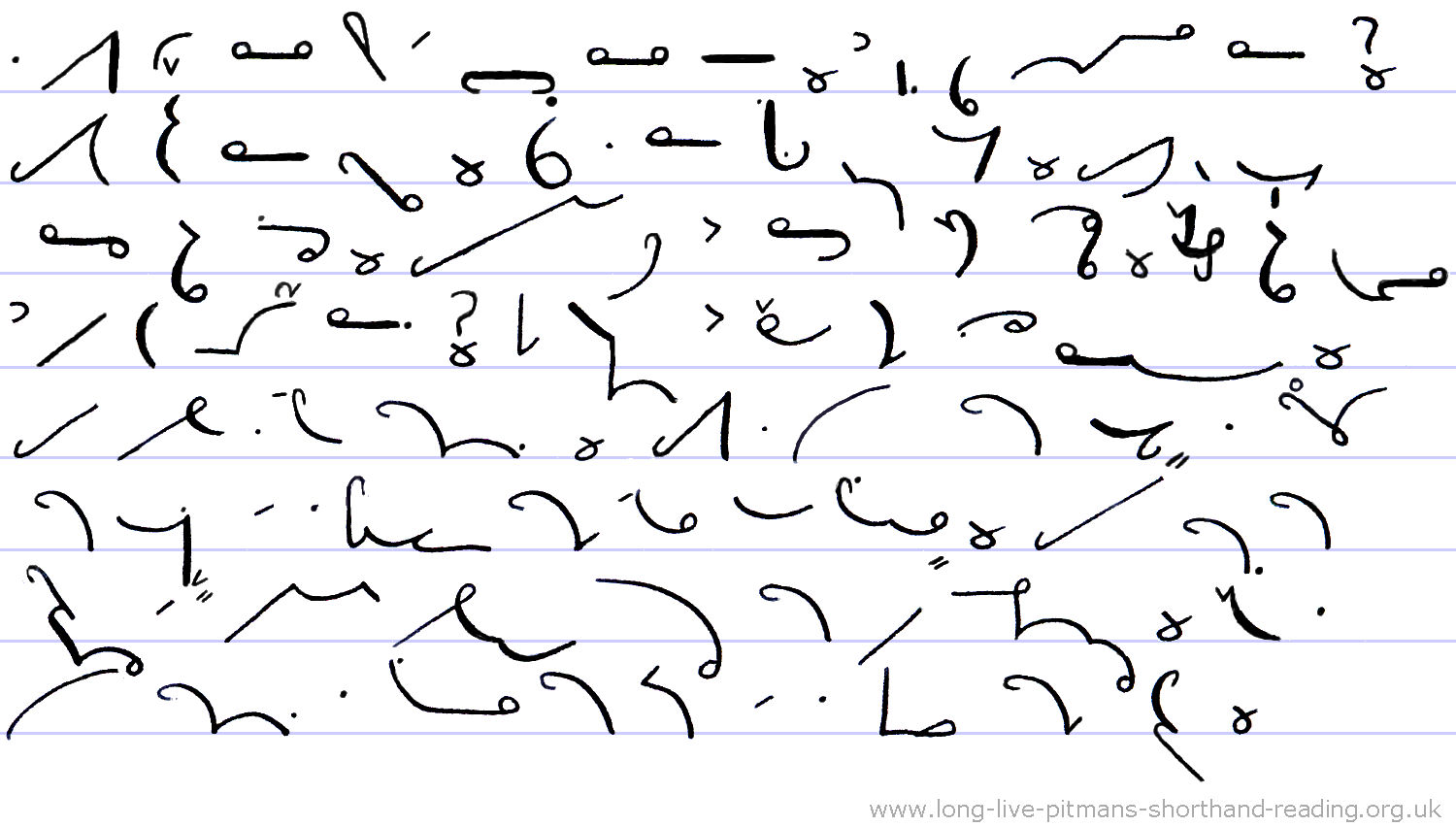
A red light SIGNIFIES stop and green SIGNIFIES go. What did these marks
SIGNIFY? We think that they SIGNIFIED numbers. This is a SIGNIFICANT
addition to your knowledge. We wish* to know the SIGNIFICANCE of these
actions. We are not sure of the SIGNIFICATION of their messages. I do
not understand all these figures, what are they actually SIGNIFYING? At
the bottom of the sign was the manís signature. We received an
offer
FROM him. We had a letter FROM England, a parcel FROM India and a
telephone call FROM the office in France. We are free FROM problems and
are now receiving orders FROM our customers. I have a letter FROM him, a
fax FROM her and a text FROM the other PEOPLE.
* "We wish" The Ish can be lowered,
to get it through the line, to differentiate this phrase from "we shall"
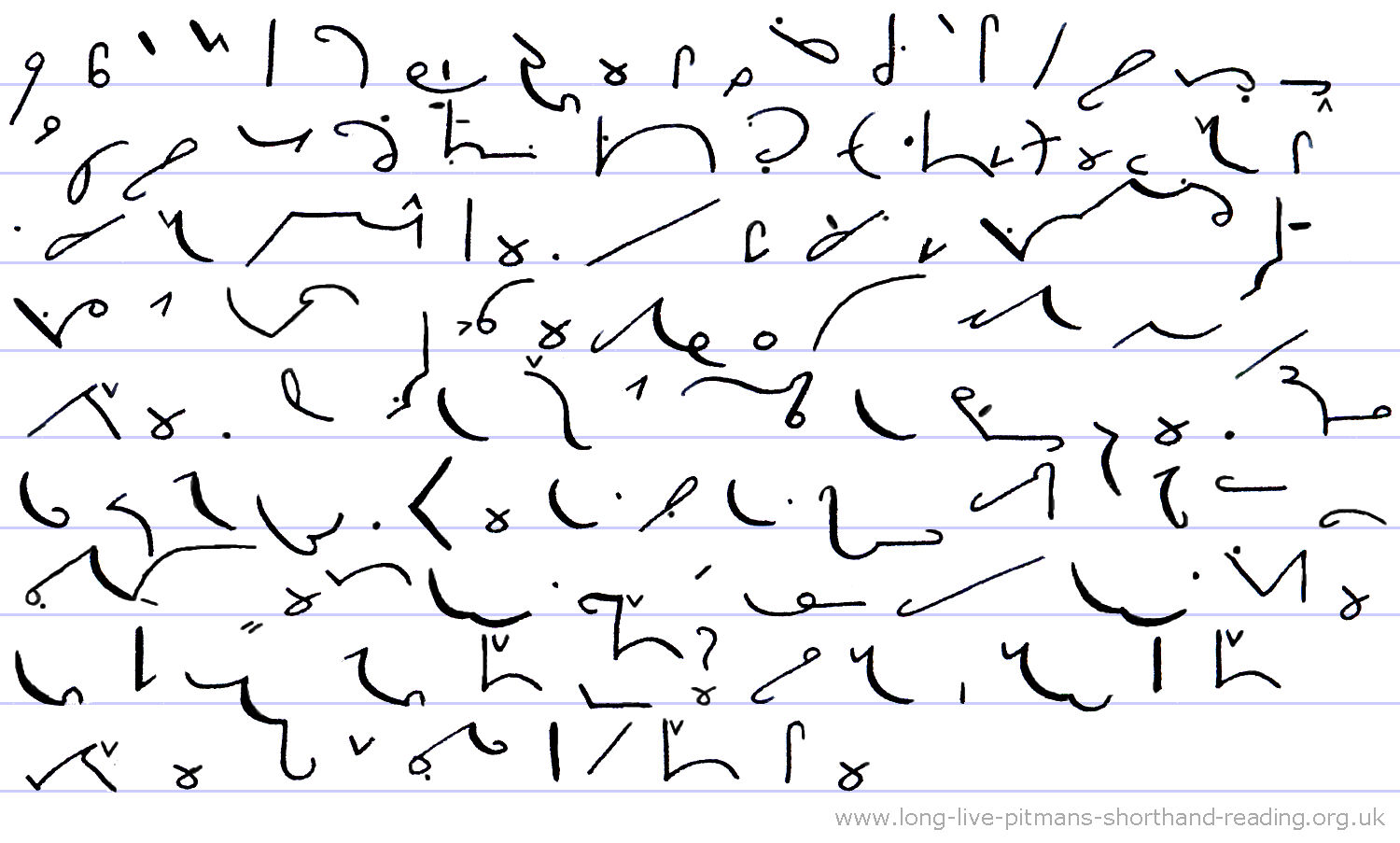
He TOLD us all about it FROM his own point of view. TOLD is the past
tense of TELL which used to mean "count" and is still used in the phrase
automatic teller machine (ATM). When I have TOLD a story, I have
recounted it. The WRITER TOLD the story, but the bellringers tolled the
bells and the farmer tilled the soil. We HAVE received his letter and we
HAVE written our reply. The staff HAVE arrived and the managers HAVE
spoken to them. The workers HAVE been here and HAVE finished the job.
HAVE a rest, HAVE a drink of water and then call Mr Havelock. I am
HAVING a great time and next week* we are HAVING a party. HAVE you had
the invitation and HAVE you time to come? Yes I HAVE but I HAVE not had
time to reply. I havenít had much time at all.
* Omission phrase "ne(k)s(t w)eek"
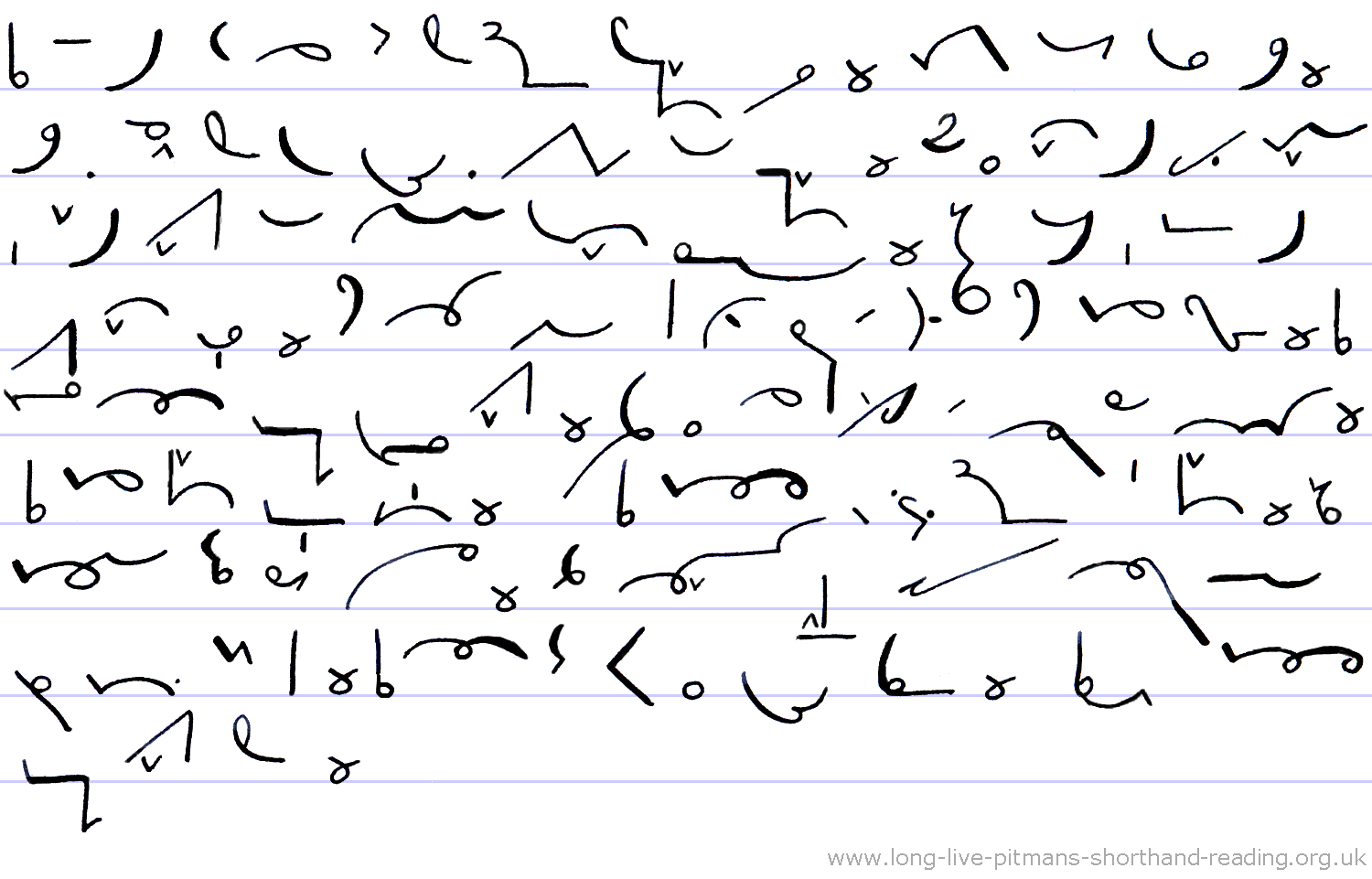
It is quite USUAL that MOST of the staff work overtime HOURS. I will be
in the office as USUAL. As USUAL the accounts staff have finished the
report in good time. Shorthand is my USUAL way of writing, but I USUALLY
write in longhand for my signature. I think this is UNUSUAL, but I can
USUALLY read my notes. They are MOSTLY written at low speed and so they
are ALMOST perfect. It is, of course, MOST IMPORTANT to get the figures
right. This letter is MOST urgent and must be SENT immediately. It is
ALMOST time to go home. It is ALMOST IMPOSSIBLE to complete the work on
time. I think it is ALMOST certain that he has sent the letters. That is
the MOST likely outcome and we are MOST probably going to speak to him
about it. It is MOST IMPORTANT that the job is finished this week*. It
is now ALMOST IMPOSSIBLE to get the right staff.
"mos(t)" "mus(t)" Where joined in a
phrase, these usually omits the lightly sounded T
* Omission phrase "this (w)eek"
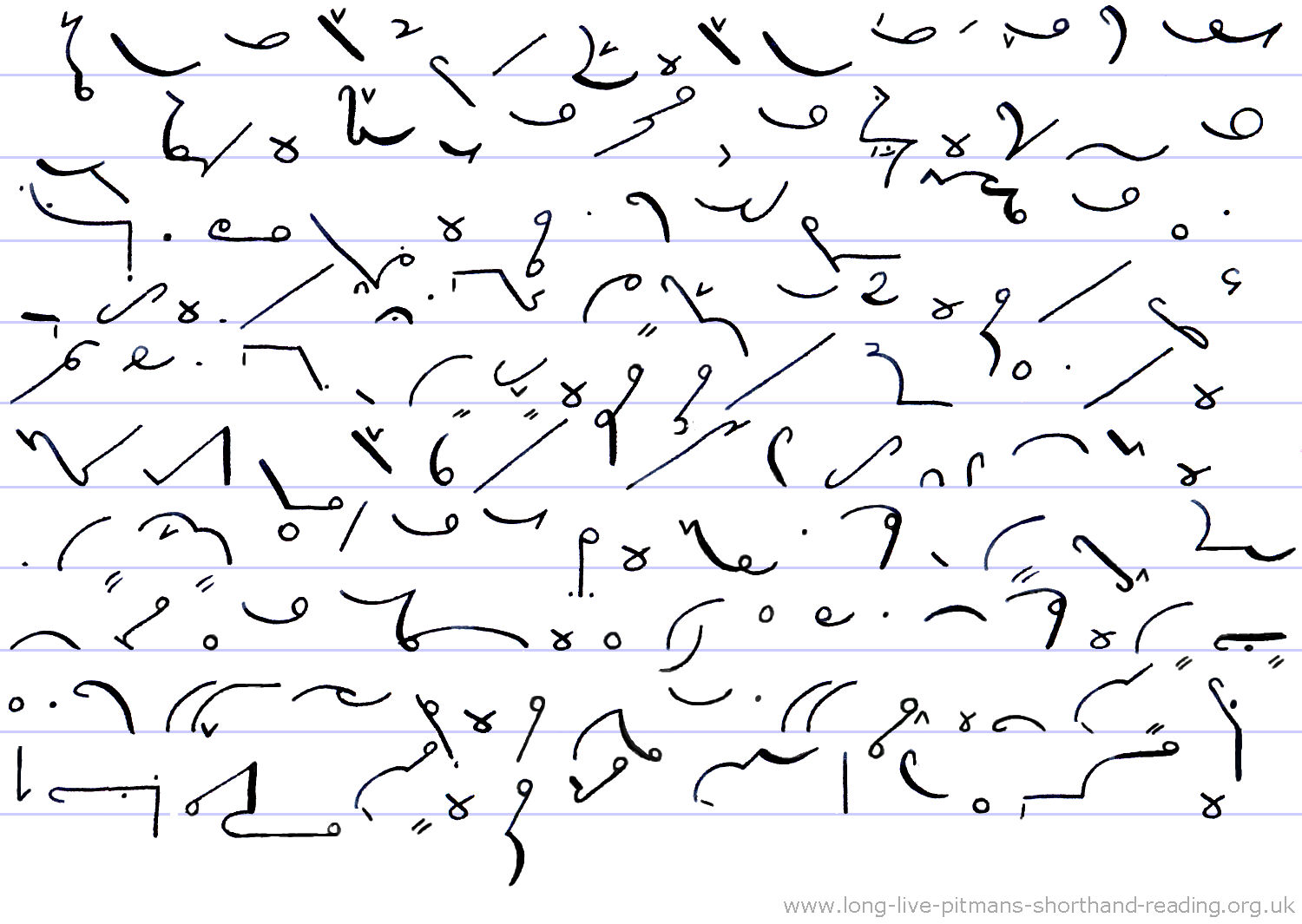
I think he is being INFLUENCED by what the PEOPLE are saying. By being
honest* and
nice* they are INFLUENCING the young people of this country.
"Driving under the INFLUENCE" refers to the INFLUENCE of alcohol. There
are many INFLUENCES affecting the schoolís pupils. He is a very
influential speaker and I am glad that his INFLUENCE is a good one. The
WRITER made a copy of the LORDíS prayer in shorthand. He was RATHER
pleased with the result and SENT a copy to LORD White. He said he would
RATHER work as a WRITER. I prefer to read books by this WRITER RATHER
than the other one you TOLD me about. The LORD Mayor has much INFLUENCE
in the city. I have SENT a message to LORD Brown asking him to use his
INFLUENCE in this matter. His LORDship has SENT an important message.
LORD Gray has a very LORD-like manner of SPEAKING. He lives in a LORDLY
house. Mr Lord played at the cricket headquarters Lordís*. He was always
lording it over his colleagues.
* "honest" "nice" Always insert the
first vowel, to prevent these being misread for each other, and the
first vowel is essential in "honestly, nicely" as the only way to
distinguish them
* "Lord's" Short forms are not used
for names
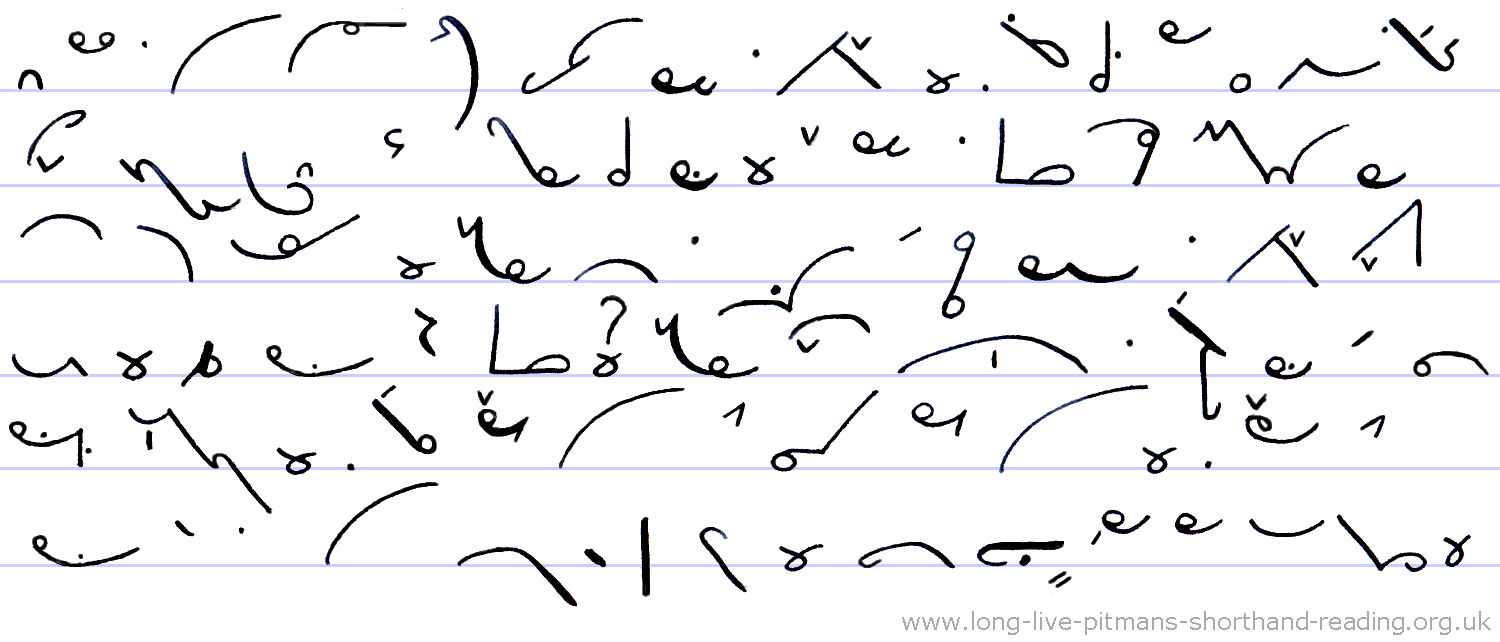
You SENT us a letter last week* and THEREFORE WE will
send you a reply.
The past tense SENT is written above the line to prevent confusion with
the present tense send. I SENT you a text message and I hope you will*
send me your answer. I have SENT him an email* and he is sending a reply
right now. Who is the sender* of that text? I have SENT my mother a
bottle of scent and some scented notepaper. The boss signed the letter
and the secretary SENT the letter. The signer and the sender* of a
letter may be two different people. Mr Gray has not SENT any payment.
* Omission phrase "las(t w)eek"
" I (h)ope you will"
* "email" Always insert the first
vowel, as this is similar to "mail"
* Not thickened, as the D sound is represented by the doubling. Thickened
would be a doubled Ing stroke
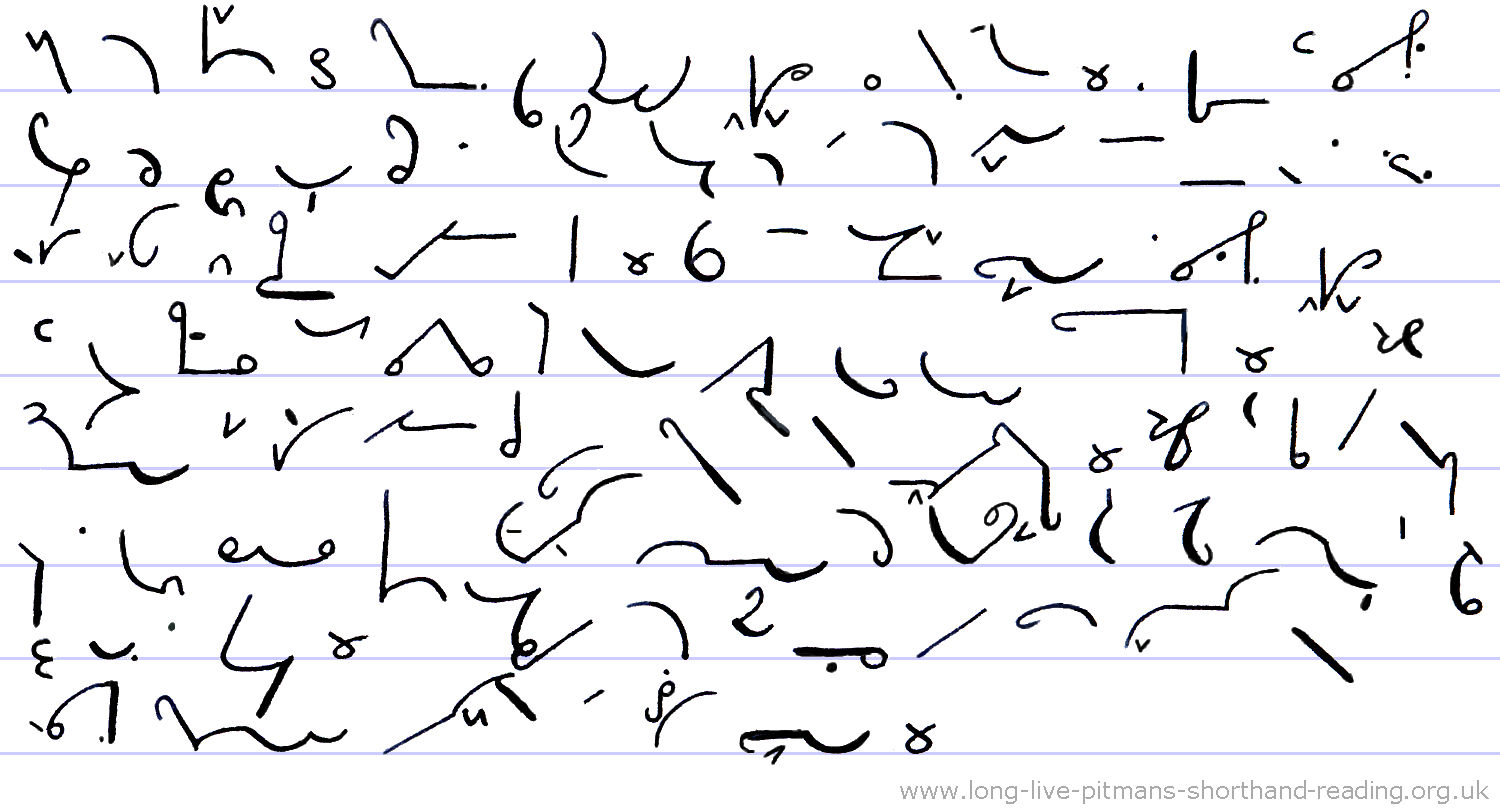
I hope* your time spent practising these essential outlines is paying
off. The difficulty with hesitating over such words is that you know
there is a short form for that word and your writing can come to a
complete halt while you struggle to recall it. This is quite unlike
creating a hasty outline with full strokes in the hopes of it being
readable, even if not correct. I would say that* working on the whole
article at once* will probably be counter-productive*. I would suggest
that it is much better to do a few sentences at a time* thoroughly,
making your own variations on them, and then move on to others when you
need a change. In this way your shorthand gains are more likely to be
solid, permanent, reliable and constantly growing. (1599 words)
* Omission phrase "I (h)ope" "I would s(ay)
that" "at (wu)ns" "at (a) time"
* "counter" on its own is doubled, but this
version is used for a better join in a compound word
Top of page
|
